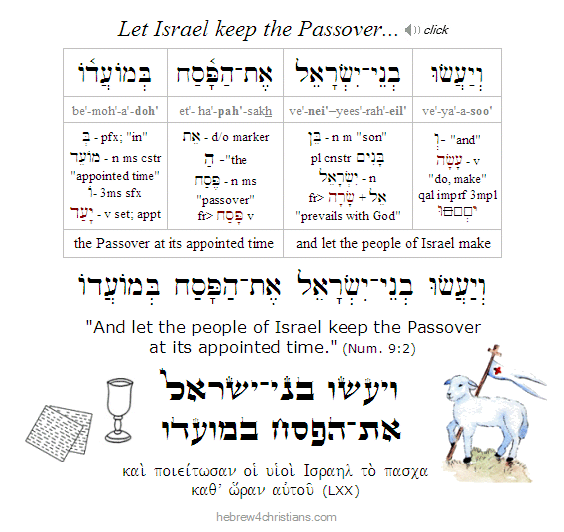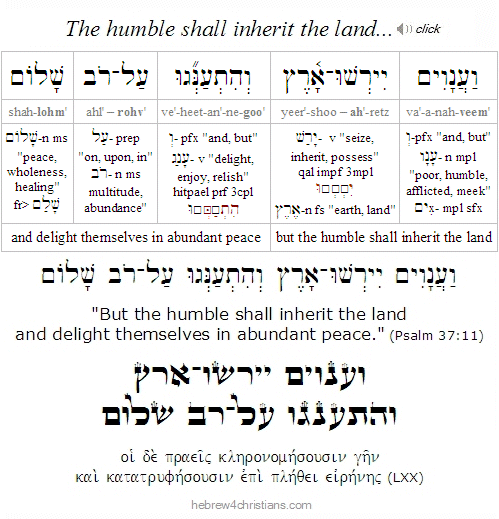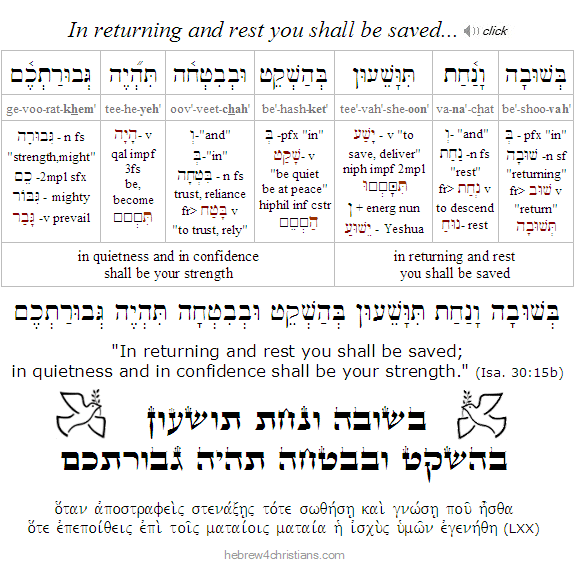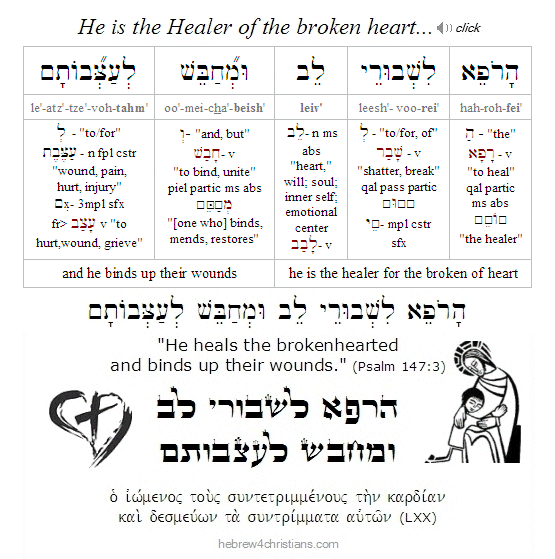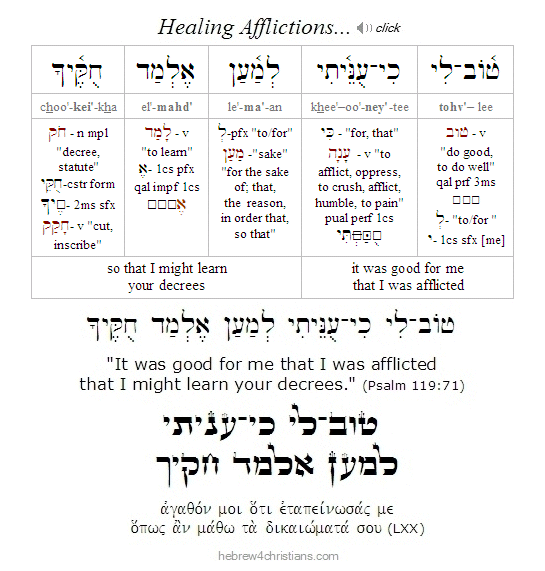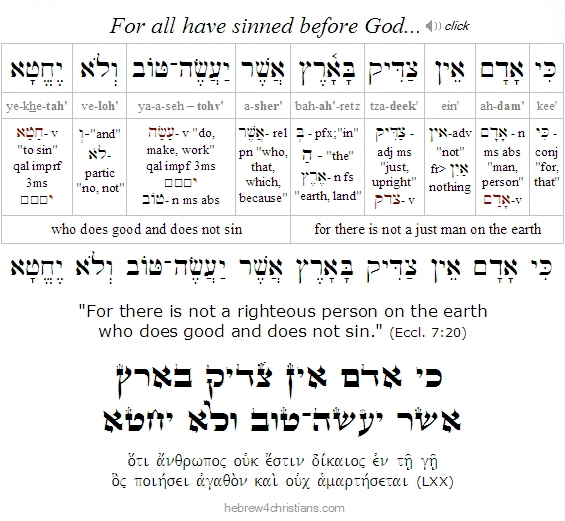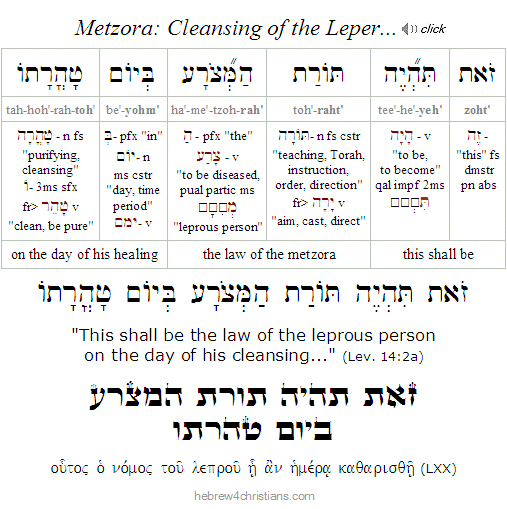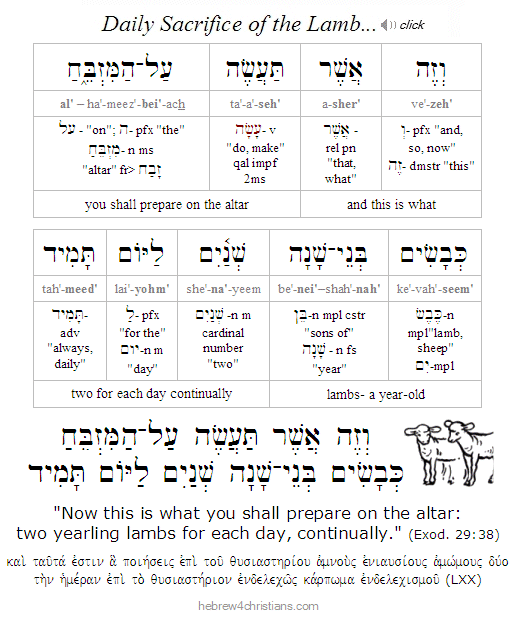|
Jewish Holiday Calendar
For April 2022 site updates, please scroll past this entry....
The Torah divides the calendar into two symmetrical halves: the Spring and the Fall, indicating the two advents of Messiah. The Biblical year officially begins during the month of the Passover from Egypt (called Rosh Chodashim, see Exod. 12:2), and the spring holidays of Passover, Unleavened Bread, and Firstfruits both recall our deliverance from Egypt and also our greater deliverance given by means of the death, burial, and resurrection of the Messiah, the great Passover Lamb of God. The holiday of Shavuot (i.e., "Pentecost") both commemorates the revelation of the Torah at Sinai as well as the revelation of the Ruach HaKodesh (Holy Spirit) at Zion, in fulfillment of the promise given by our Lord....
The intermediate months of summer end with the advent of the sixth month of the calendar, the month of Elul, which recalls the time Moses interceded on behalf of Israel after the sin of the Golden Calf. To commemorate this time of our history, we likewise focus on teshuvah (repentance) in anticipation of Rosh Hashanah and especially in anticipation of Yom Kippur, the great "Day of Atonement." In Jewish tradition the 30 days of Elul are combined with the first ten days of the seventh month (called the "Days of Awe") to set apart "Forty Days of Teshuvah" leading up to the Day of Forgiveness for Israel. Immediately following Yom Kippur, the mood changes as we begin preparing for a joyous week-long celebration called Sukkot (i.e., "Tabernacles") that concludes with the holiday of Simchat Torah.
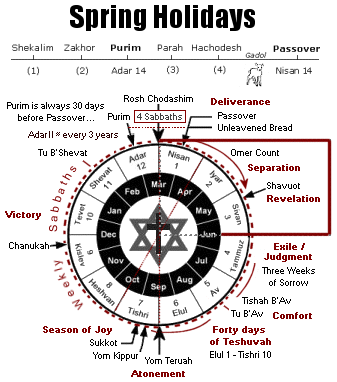 |
The Spring Holidays:
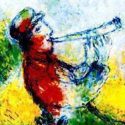
The spring holidays (חגי האביב) provide a portrait of the death, burial, and resurrection of the Messiah: Yeshua was crucified on erev Pesach (during the time of the sacrifice of the Passover lambs), buried during Chag Hamotzi (the festival of Unleavened Bread), and was resurrected from the dead on Yom Habikkurim (the Day of Firstfruits). Fifty days after Passover, on the climactic holiday of Shavuot (i.e., the feast of Pentecost), the Ruach HaKodesh (Holy Spirit) fell on the believers in fulfillment of the promise given by our Lord. Note that the giving of the Holy Spirit occurred precisely according to the calendar countdown given in the Torah (Lev. 23:15-16), and that it occurred after the resurrection of Yeshua -- just as our Messiah foretold (John 16:7; Acts 1:6-8, 2:1-4). This proves that the feasts of the LORD (מוֹעדי יהוה) were not abolished after the crucifixion. The meaning of the gospel is prefigured in the holidays given in Torah. See Luke 24:27, 24:44; John 5:46; Acts 26:22, etc.
Kindly note that in accordance with both Torah and Jewish traction, the following holiday dates begin at sundown (ויהי־ערב ויהי־בקר; Gen. 1:5):
- Month of Adar II (Wed. March 2nd [eve]) - Fri. April 1st [day])
Dates for Passover 2022:
Free Seder Guide
- Month of Nisan (Fri. April 1st [eve] - Sat. April 30th [day])
- Month of Iyyar (Sat. April 30th [eve] - Mon. May 30th [day])
- Month of Sivan (Mon. May 30th [eve] - Tues. June 28th [day])
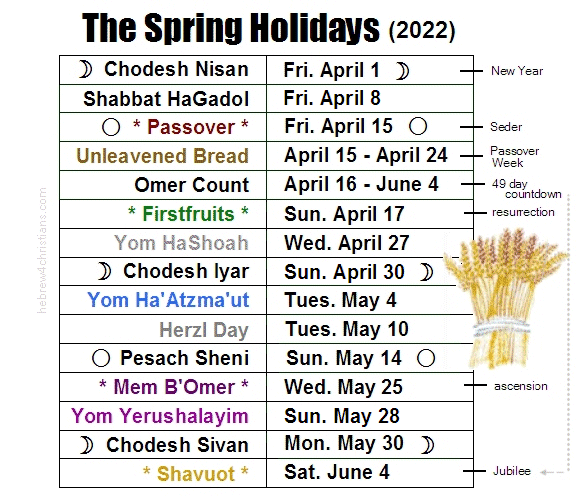 |
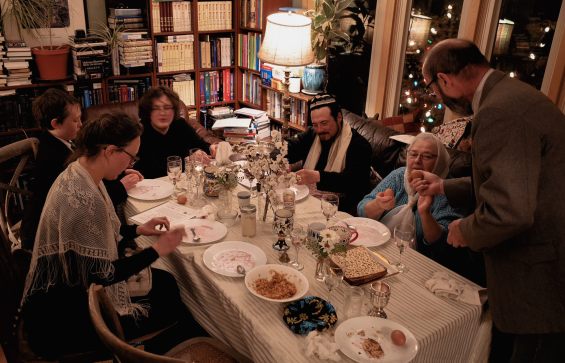 |

Happy Passover, friends!
Note: For more information, see the Calendar Pages....
April 2022 Updates
Witness of the Spirit...
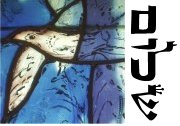
04.29.22 (Nisan 28, 5782) "Because you are his children, God has sent the Spirit of his Son into your hearts, crying, "Abba! Father!" (Gal. 4:6). Note here the Spirit does not cry out using "esoteric" or magical names for God, nor does the Spirit refer to one of God's many titles based on the divine attributes, but instead uses a term of intimacy and profound trust. After all, the word "abba" (אַבָּא) is not so much a name for God as it is a claim about who you are -- it is a confession that you belong to the Lord as his beloved child...
Throughout his ministry Yeshua referred to the LORD simply as his "Father," though he used the intensive address "Abba, Father" (Ἀββᾶ, ὁ πατήρ) just before his arrest and crucifixion, that is, during his intercession at Gethsamane (גַּת שְׁמָנִים), near the olive oil press on the Mount of Olives where the anointing oil for the Temple (שֶׁמֶן הַמִּשְׁחָה) was made, and therefore he called upon "Abba, Father" while in deep suffering and tribulation of heart (Mark 14:36). "Take this cup away from me. Yet not what I will, but what you will..." The mixed dialect of Hebrew and Greek here (i.e., Ἀββᾶ, ὁ πατήρ) may indicate identification with both the Jewish people and the Gentiles who would be united in his passion, as it says, shalom shalom la'rachok vela'karov: "Peace, peace, to him who is far off and to him who is near," says the LORD; "and I will heal him" (Isa. 57:19, Eph. 2:15).
Knowing God as your "father" is an intimate matter of the heart, an inner cry or groan coming from the miracle of spiritual rebirth. "The Spirit himself bears witness to our spirit that we are God's children" (Rom. 8:16). Amen, and Shabbat Shalom chaverim...
Hebrew Lesson
Isa. 12:2 Hebrew reading (click):
Heart of Atonement...

04.29.22 (Nisan 28, 5782) Many of our deepest anxieties come from the fear of death, whether we are conscious of this or not... Death represents fear of the unknown, fear of being abandoned, fear of being rejected, fear of being separated from others, and so on. I am so glad Yeshua gives us eternal life, which for me is not so much about immortality of the soul as it is being loved and accepted by God... That is what "at-one-ment" means, after all (John 17:22-23). Because God loves and accepts us, we trust Him to be present for us, even in the darkest of hours, on the other side of the veil, where he there "prepares a place for us" (John 14:2). As Yeshua said, "I tell you the solemn truth, the one who hears my message and believes the One who sent me has eternal life (חַיֵּי עוֹלָם) and will not be condemned, but has passed (i.e., μετά + βαίνω, lit., "crossed over" [עָבַר]) from death to life" (John 5:24). God's love "crosses over" from death to life and now forever sustains me.
Our Torah reading this week (Acharei Mot) provides details about Yom Kippur, or the "Day of Atonement," a special service that gave ritual expression of God's love by making purification for our sins. As I've explained before, the word for love (i.e., ahavah: אהבה) equals the number thirteen (1+5+2+5=13), but when shared it is multiplied: 13 x 2 = 26, which is the same value for the Sacred Name (יהוה), i.e., (10+5+6+5=26). Likewise the Hebrew word for "life" is chayim (חַיִּים), is written in the plural to emphasize that life cannot be lived alone but must be shared. Notice that within the word chayim are embedded two consecutive Yods (יי), representing unity in plurality (Yod-Yod is an abbreviation for YHVH, also indicating the "deep Akedah" of Father and Son). God gave up His life so that we can be in relationship with Him, that is, so that we can be "at-one" with His heart for us. Whatever else it may mean, then, the Hebrew word for "atonement" (i.e., kapparah, "covering," "protection," "purification," "cleansing," "forgiveness," and so on) is about accepting God's heart for you - being unified in his love - and if you miss that, you've missed the point of the Torah's teaching.. Thank God we are "sealed" in the book of life by the love of Yeshua!
Hebrew Lesson:
Isa. 61:10 reading (click):
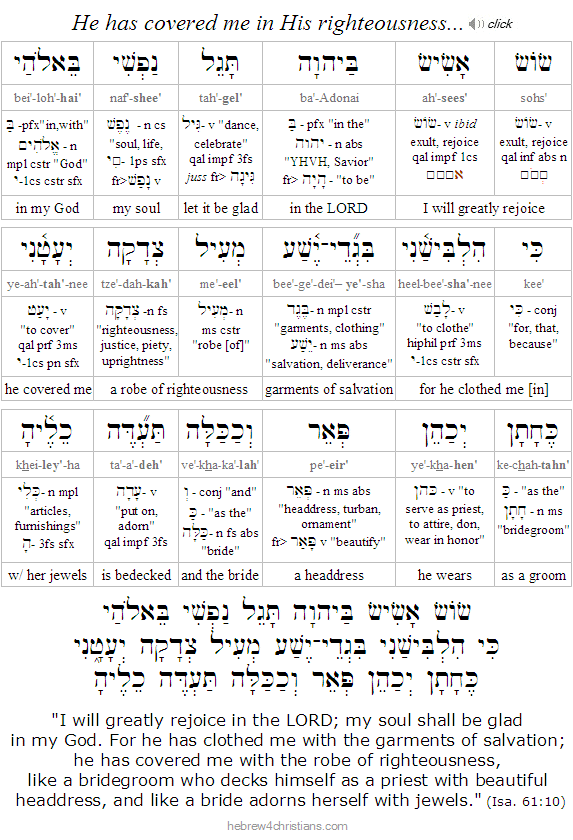 |
Note: I have been sick with a cold the last few days, and today it's been especially rough. Thank you for your prayers for this ministry. - John
Picturing the Atonement...

[ The following is related to our Torah reading this week, parashat Acharei Mot... ]
04.29.22 (Nisan 28, 5782) This week's Torah portion, Acharei Mot, includes instructions given to the priests of Israel to perform an elaborate sacrificial ritual that vividly illustrates the nature of "atonement" (i.e., forgiveness and cleansing from sin) and which, by extension, provides insight into the priestly work of Yeshua as the "Mediator of the New Covenant." In order to see this, I will first briefly review Leviticus chapter 16 and the ordinance of "Yom Kippur" (or what is often called the "Day of Atonement"), and then I will go on to indicate some connections all this has with the sacrificial ministry of Yeshua.
So let us begin with the first verse of chapter 16, where we read that the LORD spoke to Moses some time after Aaron's two sons died when they offered "strange fire" (אֵשׁ זָרָה) in the Holy of Holies (as recorded earlier in parashat Shemini: see Lev. 10:1-11). You may recall that immediately following their death, no explanation was given for God's fiery judgment other than Moses' statement that those who serve as priests must be "sanctified," and with that Aaron kept silent (Lev. 10:3). After the dedication of the Tabernacle, however, we are given reason for God's judgment when the LORD spoke to Aaron saying that it was forbidden to consume alcohol when serving at the Tabernacle upon pain of death (Lev. 10:8-11). Alcohol impairs thinking and muddles the difference between what is holy and unholy, the clean and the unclean, and consequently obscures the intent of Torah. The LORD requires that those who draw near to him be sober-minded, earnest and reverent in their service (Eph. 5:15-19). So chapter 16 begins with God instructing Moses regarding the basic etiquette of the priests, particularly warning that they were not to casually intrude into the Holy of Holies, since this represents the Throne of God, the place where the Divine Presence is manifest in the cloud upon the cover of the Ark of the Covenant (Lev. 16:1-2).
The LORD then said that Aaron was permitted to come before the Throne of God, the Holy of Holies (קֹדֶשׁ הַקֳּדָשִׁים), only in the role of the High Priest (הַכֹּהֵן הַגָּדוֹל), and only by means of the sacrificial blood of a bullock (young bull) offered for sin and a ram (male sheep) offered for a whole burnt offering. Only by the merit of these sacrifices would the High Priest be able to enter before the Holy One (Lev. 16:3). Note that these sacrifices were for Aaron to be regarded as sinless in his service before the LORD.
After Aaron washed himself by immersing himself in a mikvah, he would put on four special garments sanctified for the momentous occasion (Lev. 16:4). Instead of the "golden vestments" of distinction (בִּגדֵי הזּהב), however, he wore "white vestments" made of linen (בִּגדֵי לבן). These included a plain linen tunic, breeches, belt, and turban. The pure white linen represents both the humility of the servant as well as his purity.
During the course of the Yom Kippur service, the High Priest would change his vestments no less than five different times! When he performed his "outer service" in the courtyard, he would wear the golden vestments, but when he performed "inner service" of the Mishkan, he would wear the linen vestments. Before every change of vestment he would wash his hands and feet at the kiyor (water basin in the courtyard) and then immerse himself in a mikvah.
Aaron next would take from the congregation two kids of the goats (שְׁנֵי־שְׂעִירֵי עִזִּים) for a sin offering, and one ram (וְאַיִל אֶחָד) for a burnt offering (to be used later). First, however, he would was required to offer his bullock to atone for his sins according to the laws of sacrifice (i.e., by laying both hands on the head of the animal, confessing his sins, and then slaughtering it and catching its blood in a basin, and so on). When he was finished with his sin offering, he would take the two goats and present them before the LORD at the entrance of the tent, and then draw lots (גּוֹרָלוֹת) - one lot "for the LORD," and one lot "for "Azazel" (i.e., עֲזָאזֵל, from עֵז, "kid" and אוּזָּל, to be sent away"). Note that the two goats had to be the identical in appearance, size and weight. Two tablets of gold, one inscribed with God's name (יהוה), and the other the name Azazel (עזאזל) were placed inside a wooden box and Aaron would draw one tablet (or goral) out and put it on the head of the goat to his right, and the other on the head of the goat to his left. Aaron then took the goat designated "for the Lord" to be prepared as a sin offering, and the goat designated to be sent away was set aside to be presented to the LORD before being released into the desert (Lev. 16:7-10).
After the selection of the two goats, Aaron would sacrifice his bullock as a sin offering for himself and his fellow priests. Then he would take a fire pan full of burning coals from the outer altar (i.e., the brazen altar) and a double handful of finely ground incense (i.e., ketoret: קטרת) that would be brought beyond the veil (i.e., parochet: פרכת) into the Holy of Holies, where he would place the incense on the burning coals in the fire pan so the smoke would cover the top of the Ark of the Covenant of the LORD (ארון ברית־יהוה) containing the Tablets. Then he would take some of the bullock's blood and, with his forefinger, sprinkle it once above the east side of the cover of the Ark (i.e., kapporet: כַּפֹּרֶת), and then seven more times toward (or upon) the cover itself. If he did this correctly, he would not die (Lev. 16:11-14).
Next Aaron would sacrifice the people's sin offering, the goat selected as "for the LORD" (ליהוה) and bring its blood into the Holy of Holies beyond the veil where he would sprinkle the blood in the exact same manner as the bullock's blood was sprinkled. The blood upon the cover of the ark represented the people's atonement for breaking the laws of God. Aaron would then return to the Holy Place (i.e., the partition of the Tabernacle where the Menorah, the Showbread Table, the Menorah, and the Altar of Incense were situated) and sprinkle the blood over these objects as well, with special attention given to the golden Altar of Incense (מזבח הזהב), where its corners were daubed with the sacrificial blood (Lev. 16:15-19).
After atoning for the Holy Place of the Tabernacle (i.e., hakodesh: הַקֹּדֶשׁ), Aaron would call for the live goat -- the one selected "for Azazel" -- to be brought to him. Aaron would then lay both hands on the head of the live goat and confess over him all the iniquities, transgressions, and sins of people, "transferring" them to the head of the goat. Once this confession (i.e., viduy: וִדוּי) was accomplished, the goat would be "sent away" (azal) by the hand of a designated man into the desert. "The goat shall bear upon him all the people's iniquities into a desolate land (i.e., eretz gezerah: אֶרֶץ גְּזֵרָה), where the designated man would release him" (Lev. 16:20-22). Note that the "designated man" refers to one selected to do this holy task even on this special Sabbath. In Hebrew this anonymous person is called "ish itti" (אִישׁ עִתִּי), or a "timeless man," because his service transcends the restrictions of the Sabbath. Also note that the term "desolate land," or eretz gezerah, can be understood as a land of "decree," indicating that the "goat for Azazel" is a divine decree that surpasses our understanding (like the decree of the Red Heifer). Upon the release of the live goat, Aaron would return to the Holy Place, remove the white linen vestments, and then immerse himself in a mikvah at a sanctified place. He would then put on his regular High Priest vestments and go outside to offer his own burnt offering and the people's burnt offering at the altar of the outer court, being careful to burn the fat of the sacrifices upon the altar (Lev. 16:21-25).
The atonement service was finished when the bodies of both the bullock given for Aaron's sin offering and the goat given for the people's sin offering were taken outside of the camp to be completely burned in the fire. Both the one who sent the goat away into the desert and the one who burned the bodies of the sin offerings were required to wash their clothes and immerse themselves in a mikvah before they could reenter the camp (Lev. 16:26-28).
The LORD then told Moses that that this series of rituals was to be performed every year as the "Day of Atonements" (plural, i.e., yom ha'kippurim: יוֹם כִּפֻּרִים), an ordinance to be performed on the tenth day of the seventh month on the calendar (i.e., Tishri 10). The people were required to "afflict their souls" (i.e., fast) and the appointed High Priest would perform the same rites - in the same prescribed order - that were given to Aaron. "And this shall be a statute forever (לְחֻקַּת עוֹלָם) for you, that atonement (i.e., kaphar: כָּפַר) may be made for the people of Israel once in the year because of all their sins" (Lev. 16:29-34). No work was to be done on this special sabbath of fasting, "because it is a Day of Atonements to make atonement for yourselves before the LORD your God" (see Lev. 23:27-28).
Note that Yom Kippur, or the Day of Atonement, is called an eternal decree, "chukkat olam," though we might better understand the word "olam" (עוֹלָם), translated as "eternal," to refer to the heavenly realm, that is, as a "decree of eternity," which suggests something deeper than the symbolic rituals performed at the Tabernacle (and later at the Temple). Indeed, Yom Kippur foreshadowed the great work of Yeshua, the Mediator of the New Covenant, wherein everlasting atonement was secured by means of his sacrifice given at the cross.
The author of the Book of Hebrews writes, "When the Messiah appeared as Kohen Gadol (high priest) of the good things to come, then, through the greater and more perfect Tabernacle which is not made with human hands (that is, not of this creation), he entered into the Kodesh ha'Kodashim (Holy of Holies) once and for all - not by means of the blood of goats and bullocks but by means of his own blood, thus securing for us eternal redemption" (Heb. 9:11-12). The Levitical system of worship was a "shadow" of a greater reality to come, since "it is impossible (ἀδύνατος) for the blood of bullocks and goats to take away (i.e., ἀφαιρέω, used to translate the Hebrew כָּרַת, to "cut off") sins" (Heb. 10:4; Psalm 40:6-8).
In light of the ministry of Yeshua as our great High Priest of the New Covenant, we understand the blood of the sin offering "to the LORD" to represent the blood of atonement that was shed upon the cross for our purification from sin, whereas the offering made "to Azazel" represents the additional aspect of removing of our sins far "outside the camp."
Just as both of the goats of the Yom Kippur ritual constituted a single offering made to God (i.e., Lev. 16:5 states "he [Aaron] shall take ... two male goats for a (singular) sin offering"), so the sacrifice of Yeshua represents two aspects of a single offering before God. The blood of the first goat was given "to the LORD" for atonement, but the exile of the second goat was given to banish sins from the Divine Presence. Likewise Yeshua served as both our atoning sacrifice before the Father and as our "scapegoat" who "carries away our sins" (Isa. 53:4, 5; Matt. 8:17; 1 Pet. 2:24). The "sent away goat" represents the separation from God that Yeshua experienced on our behalf as He bore the wrath of God in our place... Because of the Messiah's sacrifice, our sins are now put away "as far as the east is from the west" and are forever buried in the bottom of the sea, never to be remembered again (Psalm 103:12; Mic. 7:19; Isa. 38:17; Jer 31:34). Yeshua is both our Sin Offering whose blood cleanses us from sin as well as our "Scapegoat" who forever banishes our sins from God's holy Presence. Amen. יְהִי שֵׁם יְהוָה מְברָךְ - "Blessed be the Name of the Lord."
Let me close with a few additional remarks about the significance of Yom Kippur. First, God gives his directions, though we are responsible to heed his voice, as it says: "You shall guard my decrees and keep my ordinances, to walk in them, which, if a man does, he shall live by them" (Lev. 18:4-5). The atonement is (in a sense) a "divine-human" cooperative, since 1) the people were asked to acknowledge their iniquities, transgressions, and sins, that is, to confess their need for atonement, 2) to "afflict" themselves by demonstrating sorrow for their various wrongdoings; and 3) to provide the means by which the atonement rituals could take place (i.e., the physical sacrifices, the garments for the High Priest, the upkeep of the Tabernacle, and so on). On the other hand, everything comes from the hand of heaven, and therefore it may rightly be said that God alone makes atonement for us. "No man" was to be in Holy of Holies when the blood was offered upon the cover of the Ark of the Covenant (Lev. 16:17), which suggests that Aaron represented a divine Mediator before the LORD. The blood of the sacrifice therefore was offered by God and by means of God's own gift.
Within the inmost section of the "three-in-one" Tabernacle was the "three-in-one" Ark of the Covenant that held the two tablets of the Law of God, the covenant that defined the boundaries for rightly relating to Him, and it was upon its cover that the blood was offered to illustrate that only divinely ordained sacrificial blood would cleanse the people from their sins. As the blood was sprinkled upon the kapporet, the dark cloud surrounded the Ark, and the Divine Presence accepted the appointed sacrifice. This is a picture of the atonement secured by Yeshua upon the cross, as he offered up his life in intercession for us, surrounded by the dark cloud, and therein the blood of our Savior was given to cleanse us from sin.
It is important to note that the word in the ancient Greek translation of the Torah (called the Septuagint) that was selected to translate the Hebrew word kapporet (i.e., the cover of the Ark, sometimes called the "mercy seat") is hilasterion (ἱλαστήριον), often translated "propitiation." The New Testament picks up this usage where it says: "God put forward Yeshua as a propitiation (ἱλαστήριον) through faith in His blood" (Rom. 3:25). In other words, the sprinkling of Yeshua's blood - represented by His Passion upon the cross - was "presented" upon the Heavenly Kapporet, before the very Throne of God Himself. Yeshua here functions as the great High Priest after the order of Malki-Tzedek (i.e., Melchizedek) who provides everlasting forgiveness for our sins (Heb. 9:7-10:10). Because of His sacrifice, the parochet - the wall-like covering separating the Holy of Holies - was rent asunder and God's love was let loose upon the world! All those who are trusting in Yeshua as their atoning sacrifice before God (i.e., kapparah: כַּפָּרָה) are able to draw near to God full of confidence in his acceptance and love (Heb. 4:16; Rom. 5:2; Eph. 3:12).
The requirement that the High Priest would be sinless in his service, donned in humble attire that would be "left behind" after the sacrifice was complete, raised up from the waters in newness of life to provide an ascending offering on our behalf, all picture the high priestly work of Yeshua our Lord. That the body of sacrifice was taken outside of the camp and completely consumed as a whole burnt offering (עֹלָה) alludes to Yeshua's death "outside the camp" as well (Heb. 13:11-12). The ongoing "decree of heaven" to recall the Yom Kippur service speaks to our ongoing need to savor our atonement by trusting in God's provision for us. Yom Kippur both recalls our need for forgiveness and reveals God's compassion and grace as he provides the means by which we are eternally restored to him. Amen.
Well chaverim, thank you for taking the time to read this entry, and I sincerely hope that this overview of the Yom Kippur service - and its connection with the ministry of Yeshua - will bless you in your understanding of the greatness of our God. Shalom shalom!
Hebrew Lesson
Psalm 103:12 reading (click):
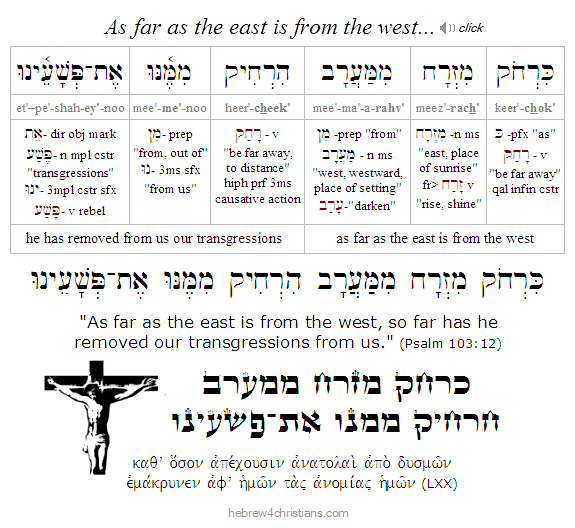 |
Evil and Social Fascism...
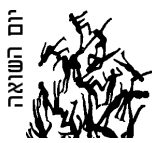
[ Dostoevsky's dictum, "If God does not exist, then everything is permissible" has become a truism in decadent Western culture. As Nietzsche said, "God is dead and we have killed him." Social engineers have long sought for such anarchy, and the whirlwind is now upon us... ]
04.28.22 (Nisan 27, 5782) Today marks Yom HaShoah, or "Holocaust Remembrance Day," which again provides us with an opportunity to ask some difficult questions about the nature of evil, and in particular, the nature of political evil, and how it is possible that such evil is at first tolerated by society and then somehow justified to establish and sustain a culture of fear and oppression that leads eventually to the utter madness of genocide...
A typical refrain heard at this time is Le'olam lo od - "Never again! Le'olam lo od - "Never again!" and yet it needs to be emphasized that not only could the madness of Nazi socialist fascism happen again, it is indeed already here, since the same dialectical mechanisms of social fascism are clearly at work in the world today - though in today's techno-fascist world the propaganda is global in scope, the scripted disinformation and cognitive dissonance are broadcast across cultures as a call for "unity," and the lockdown mindset is now ubiquitous... People have become self-censoring and the "cancel culture" suppresses freedom of thought and speech. "Groupthink" and sound bites have supplanted clear thinking and logical reasoning. You are now tagged as an enemy of the state if you dare question the official narrative or raise honest questions regarding the "science" that is used to justify the extreme measures of social control we are seeing today... The Vaccine Passport is the "Yellow Star" of today; those who do not "show their papers" will be either sent to "reeducation camps" or so ostracized that they will be unable to buy or sell in the globalist dystopian economy to come...
How did this happen? Why did people around the world surrender their God-given ability to use logic, to ask questions, and to seek for truth? What agitated the masses of humanity to abandon their personal freedoms for the sake of mere rumors and "politically manufactured" science? The answer, of course, is the power of the "Big Lie," the tactic that evil people have used for several centuries to foment disorder and insurrection - and then seize power. When asked how it was possible that they basically ignored the Jewish Holocaust, one man replied, "We all knew. Nobody knew." Today we see it in the threats of violence created by various "community organizers," in the "Antifa" movements funded by George Soros, and in Saul Alinsky's "Rules for Radicals" that even a former president studied so well...
Alinsky wrote: "[You must help] the people in the community ... feel so frustrated, so defeated, so lost, so futureless in the prevailing system that they are willing to let go of the past and chance the future. [An] organizer must shake up the prevailing patterns of their lives – agitate, create disenchantment and discontent with the current values, to produce, if not a passion for change, at least a passive, affirmative, non-challenging climate. [You must] fan the embers of hopelessness into a flame of fight" (Alinsky: Rules for Radicals). That's the recipe to create a "new world" according to many "community organizers." Create a sense of victimization to destroy the old order; rewrite the narrative of history; and then go on to enslave once again. What a heinous way of thinking...
Read this excerpt from the book "They Thought They Were Free, The Germans, 1933-45" by Milton Mayer (University of Chicago Press):
"What happened here was the gradual habituation of the people, little by little, to being governed by surprise; to receiving decisions deliberated in secret; to believing that the situation was so complicated that the government had to act on information which the people could not understand, or so dangerous that, even if the people could not understand it, it could not be released because of national security. And their sense of identification with Hitler, their trust in him, made it easier to widen this gap and reassured those who would otherwise have worried about it.
This separation of government from people, this widening of the gap, took place so gradually and so insensibly, each step disguised (perhaps not even intentionally) as a temporary emergency measure or associated with true patriotic allegiance or with real social purposes. And all the crises and reforms (real reforms, too) so occupied the people that they did not see the slow motion underneath, of the whole process of government growing remoter and remoter.
"You see," my colleague went on, "one doesn't see exactly where or how to move. Believe me, this is true. Each act, each occasion, is worse than the last, but only a little worse. You wait for the next and the next. You wait for one great shocking occasion, thinking that others, when such a shock comes, will join with you in resisting somehow. You don't want to act, or even talk, alone; you don't want to 'go out of your way to make trouble.' Why not?—Well, you are not in the habit of doing it. And it is not just fear, fear of standing alone, that restrains you; it is also genuine uncertainty.
Uncertainty is a very important factor, and, instead of decreasing as time goes on, it grows. Outside, in the streets, in the general community, 'everyone' is happy. One hears no protest, and certainly sees none. You know, in France or Italy there would be slogans against the government painted on walls and fences; in Germany, outside the great cities, perhaps, there is not even this. In the university community, in your own community, you speak privately to your colleagues, some of whom certainly feel as you do; but what do they say? They say, 'It's not so bad' or 'You're seeing things' or 'You're an alarmist.'
And you are an alarmist. You are saying that this must lead to this, and you can't prove it. These are the beginnings, yes; but how do you know for sure when you don't know the end, and how do you know, or even surmise, the end? On the one hand, your enemies, the law, the regime, the Party, intimidate you. On the other, your colleagues pooh-pooh you as pessimistic or even neurotic. You are left with your close friends, who are, naturally, people who have always thought as you have" (Chapter 13, "But Then It Was Too Late" Mayer: 1955).
The Holocaust was the result of cowardice and self-deception... The systematic, institutionalized, and "politically correct" genocide of the Jewish people was made possible solely because so many others - including nominal "Christians" - forfeited their God-given responsibility to live as authentic individuals by passively surrendering their will to "the crowd." But giving up your identity to join a gang inevitably leads to fragmentation of the soul, potentially inviting in a "legion of demons..." Regardless of whether it's a gang of thugs running an inner city neighborhood, or the pressure to keep quiet over ethical misconduct at your place of work, or the desire to feel "approved" as a good citizen of the state, or even the pressure to conform to a particular religious group, in either case, "losing yourself" in the midst of the crowd is an evasion, a cop-out, and a desecration of the image of God within you. Indeed following the crowd is a form of slavery where you surrender your freedom for the sake of a supposed sense of security... You become self-deceived because you no longer "own" yourself but became the ward of "another." Becoming a member of a crowd makes you into a copy or similitude, a shadow rather than a person of substance.
Popular leaders know how to work and bribe the crowd - whether they are big business leaders, professional politicians, or leaders of large religious organizations. Often they have the charisma that appeals to human vanity and oratory to "tickle the ears" of those who hear them speak. Politicians and "community organizers" understand how the crowd marginalizes the individual, how the voice of reason and conscience are suppressed, thereby eradicating the conviction and character of the solitary individual. Therefore the true prophet is always "a voice crying in the wilderness," an outsider to the crowd, always in collision with the world and its devices. The crowd-pleaser, on the other hand, carefully crafts his words for the applause of the mob. The crowd-pleaser is a flatterer and therefore the very antithesis of the prophet. Politicians and demagogues are masters at appealing to the gut instincts and lusts of a crowd, and therefore they are inveterate liars. They entice subgroups to follow their directives, to form self-regulating gangs, and to reward those who unquestioningly accept their "group-think." Leaders of the crowd invariably "see past" the individual and regard only numbers, general popularity, special interests, and the abstract role of "the people" in general. They justify their fascist thinking by making appeals to "the greatest good for the greatest number of people" and therefore sacrifice the dignity of the individual for the sake of the herd they wish to control...
The Kingdom of heaven is nothing like this at all, of course. Yeshua said: "You know that the rulers of the Gentiles lord it over them, and their 'great ones' exercise authority over them. It shall not be so among you. But whoever would be great among you must be your servant, and whoever would be first among you must be your slave" (Matt. 20:25-27). This is a call to recognize the sanctity of the lowly individual, to turn away from the evil vanity and abstractions of "political power" and worldly honor. As C.S. Lewis once remarked: "There are no ordinary people. You have never talked to a mere mortal. Nations, cultures, arts, civilizations - these are mortal, and their life is to ours as the life of a gnat. But it is immortals whom we joke with, work with, marry, snub and exploit - immortal horrors or everlasting splendors" (Weight of Glory: 1949).
Hebrew Lesson
Job 13:15 reading (click):
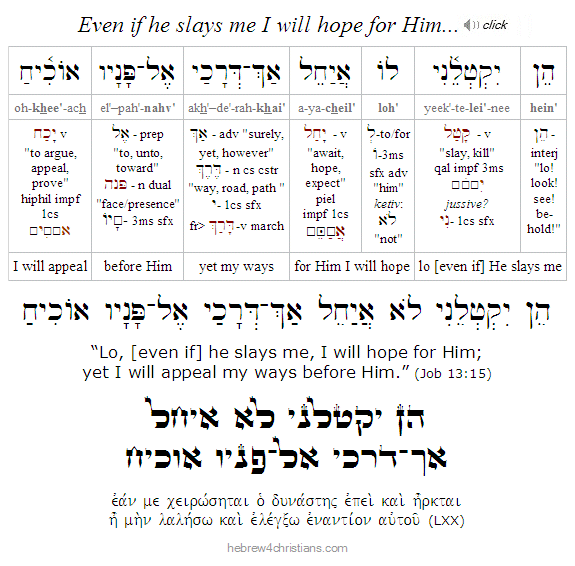 |
Beauty for Ashes...

[ Shalom chaverim. Yom HaShoah, or Holocaust Remembrance Day, begins this evening at sunset... May we never forget. ]
04.27.22 (Nisan 26, 5782) While there is no official "haggadah" for the Yom HaShoah memorial, it is traditional to light a yellow yahrzeit candle for those who died, to attend a Yom HaShoah memorial service, and to recite kaddish. Some people prepare a lavish meal using recipes written from memory by the starving women of Theresienstadt (salvaged after the war). Many of these recipes are for rich desserts and cakes, recalling days of joy before the women and their families were rounded up and brought to the concentration camps. During the memorial meal, stories of Jews who died are told, as well of those of survivors. Many survivors tell stories about the "hidden children" who were saved by righteous Gentiles (חֲסִידֵי אוּמוֹת הָעוֹלָם). These young survivors were either hidden in secret places (like Anne Frank) or were "adopted" by Christian families who pretended they were their own children.
Though we can't control what happens in this dangerous world, we can trust that God is working all things together for good, even during times of severe testing, and even in things that are blatantly evil (Rom. 8:28; Gen. 50:20). And while we instinctively recoil at the prospect of physical death, there are decidedly things worse than death itself, namely, losing hope in life, walking in the darkness of despair, living a joyless existence because of fear. As much as we abhor evil - and we must resist it with all our hearts - even more must we love the good - and cling to God (וּלְדָבְקָה־בוֹ) with all that is within us.
Ultimately, the most important thing to remember regarding death is the truth about God's salvation (יְשׁוּעָה). After all, God assuredly hates death and provides each of us with its eternal remedy: By clothing himself in human flesh, Yeshua embraced mortality itself and willingly bore the penalty for your sins, exchanging his life for yours, thereby destroying the one who had the power of death, namely the devil, and by so doing, set you free from slavery to the dread of death (Heb. 2:14-15). To those who belong to belong to Messiah, death represents a passage to eternal life and the loving presence of God Himself.
Only the miracle of faith can see hope in the face of radical evil... and yet that is the very message of the cross of the Messiah... Our Lord demonstrated that He is the the Killer of death itself; the Slayer of the Serpent; and the ultimate Triumph of God's Light over the realm of despair and everlasting darkness... He is the First and the Last, the Living One who died, and behold is alive forevermore, the true Keyholder of Death and Hell (Rev. 1:18).
For more on this topic see:
Hebrew Lesson:
Psalm 18:28 reading (click):
Extraordinary Encounters...

[ The following is related to our Torah reading this week, parashat Acharei Mot... ]
04.26.22 (Nisan 25, 5782) We "sanctify" our hearts whenever we consciously focus on what is sacred, awesome, wonderful, and glorious about Reality, and in particular, on the Living God, oseh shamayim va'aretz (עשֵׂה שָׁמַיִם וָאָרֶץ), the Maker of Heaven and Earth, and the great salvation we have in Yeshua. In our Torah portion this week (Acharei Mot) we read: "You shall not do as they do (לא תַעֲשׂוּ) in the land of Egypt, where you lived, and you shall not do as they do (לא תַעֲשׂוּ) in the land of Canaan, to which I am bringing you. You shall not walk in their statutes" (Lev. 18:3). In other words, we are not to follow the crowd, to appeal to the status quo, or to mimic the customs of the world because we are a visionary people.
Being in a vital relationship with God means separating from the ordinary and mundane, leaving our "original homeland" behind us and crossing over to the realm of blessing. Abraham had to leave the land of his father before he could receive the promise; the Israelites had to trek far into the desert before they received the vision at Sinai, and we have to leave our old lives behind to partake of newness of life. There is a radical break from the past -- we are transformed, reborn, and made into new creations by the miracle of God (2 Cor. 5:17). "Being holy" therefore means coming alive and looking away from that which deadens the spirit (Col. 3:1-4). Behold, the LORD God of Israel makes "all things new."
The call to be holy is radical and completely contrary to the world and its messages of conditional approval. Worldly culture flatters itself by making a pretense of true originality and genuine love. It imagines itself to be "cool," unconventional, creative, sophisticated, artistic, and so on, but really it is often trite, uninspired, boring, and stupidly tragic. To be truly original means encountering God in your daily experience, struggling through the day in faith, disregarding the clamor and demands of popular culture and its idolatry (i.e., fads, fashions, trends, etc.). God calls his people to come alive, to be new, and to experience abundant life; we are to treasure the unseen, the possible, and to keep faith in the healing good that will overwhelm all darkness. Now that's radical; that's original; that's powerful; but the world and its fads, idols, political heroes and pop stars are nothing but vanity and folly...
Note the connection between worldliness and idolatry, since idolatry essentially involves trying to find your identity, your worth, your satisfaction, and your ultimate fulfillment in the realm of the transitory and the finite (i.e., the world) rather than in God.... We are (rightly) warned against the vices of "worldliness" and are admonished to abstain from popular culture and its junk values, but note well that worldliness extends well beyond all this, since it concerns understanding the identity and nature of the person as a whole. The fruit of worldliness is the result of being rooted in this world rather than in God's kingdom. The various desires of the human heart - even the desire for "normal things" like personal happiness in this world - may be regarded as "worldly" if they are devoid of submission to God and His rule. Conversely, even Christian workers may be "worldly" if they base their identity in what they do rather than who they are in the Messiah...
We are "in" but not "of" the world; we are embedded within our culture to be salt and light, and that means we stay true to our vision and relationship with the LORD our God... We don't have to reinvent the wheel, however, since we learn from one another and especially from the testimony of our holy Scriptures, but nevertheless we must personally venture out and encounter God within our own hearts, trusting in his love for our everlasting healing. B'chol dor va'dor: in each generation an individual should look upon himself or herself as having been personally delivered from Egypt. To be efficacious, the message of the Passover Lamb must be personally received by the heart of faith.
Renew the affirmation of faith and know who you are: "If then you have been raised with Messiah, seek the things that are above (τὰ ἄνω ζητεῖτε), where the Messiah is seated at the right hand of God; focus your thoughts on the things above - not on things here on earth - for you have died, and your life has been hidden with Messiah in God. Then when the Messiah, who is your life, appears, you too will appear with him in glory" (Col. 3:1-4).
Hebrew Lesson
Psalm 73:25 reading (click):
The Central Duty to Love...
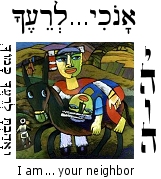
04.26.22 (Nisan 25, 5782) Our Torah portion this week, Acharei Mot, contains the verse, "You shall love your neighbor as yourself; I am the LORD" (Lev. 19:18), which is generally regarded as the most fundamental commandment of Torah. The Talmud recounts that when challenged by a pagan to teach the meaning of the Scriptures "while standing on one foot," Hillel said, "What is hateful to you, do not do to your neighbor: that is the whole Torah and the rest is commentary; go and learn it." Hillel summed up the Torah as "doing no harm" toward others (i.e., the "Silver Rule"), which agrees with the Apostle Paul's statement, "Love does no wrong to a neighbor; therefore love is the fulfillment (πλήρωμα) of the law" (Rom. 13:10). Of course Yeshua earlier taught His followers, "whatever you wish that others would do to you, do also to them, for this is the Law and the Prophets" (Matt. 7:12; 22:36-40).
Some of the mystics have said that when two people love one another, the Holy One reigns between them, as alluded to by the Hebrew word for "love" (i.e., ahavah: אהבה), the gematria of which is thirteen (1+5+2+5=13), but when shared with another it is multiplied: 13 x 2 = 26, which is the same value for the Sacred Name (יהוה), i.e., (10+5+6+5=26). In other words, when we love, esteem, and respect one another, the LORD's presence is multiplied and revealed among us (1 John 4:7-8). "Where two or three gather in my Name..."
Hebrew Lesson
Leviticus 19:18b reading (click):
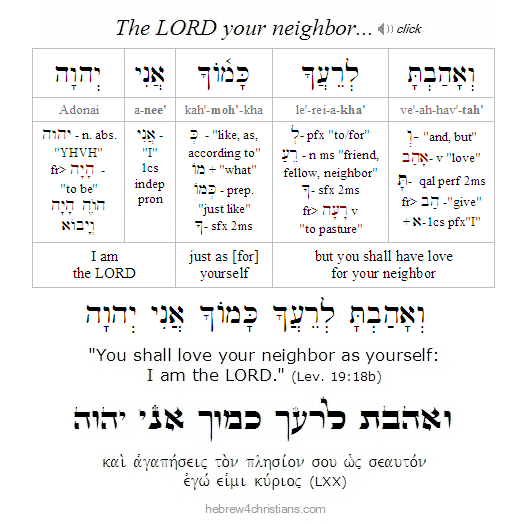 |
In this connection, it is interesting to note that the gematria for the Hebrew commandment, "You shall love your neighbor as yourself" (i.e., וְאָהַבְתָּ לְרֵעֲךָ כָּמוֹך) equals 820, the same value as the word yekidashti (וְקִדַּשְׁתִּי), "And I [the LORD] will sanctify" (Exod. 29:44). When God commands us to "love your neighbor as yourself," he graciously includes the addendum: "I am the LORD," which the sages say recalls the revelation of the Name YHVH (יהוה), and that therefore is understood to mean, "I will help you to do this," or (in this case) "I will sanctify you through your acts of lovingkindness."
Of course followers of Yeshua have the ongoing obligation to love and care for one another (see John 13:34, 15:12,17, Rom. 13:8; 1 Thess. 4:9; 1 Pet. 1:22, 1 John 3:11, etc.). After all, in this world the only tangible way we can express our love for God is by extending gemilut chasadim (loving acts) to others (James 2:15-17, 1 John 3:17, 4:20). Indeed, Yeshua taught that our obligation to love and care for others may sometimes even preempt our outward duty to love God Himself. For example, what good is it to "tithe mint and cumin" and yet neglect the needs of those who are suffering? (see Matt. 23:23).
Tragically, the idea of "loving" or "serving" God can even be used as a pretext for rejecting those with whom we might disagree... What else explains religious hatred, hidebound denominational prejudices, and other forms of sanctimonious humbug at work in the various world religions of today? Even in so-called Christian churches we see this sort of bigotry at work. As Yeshua forewarned: "the hour is coming when whoever kills you will think he is offering service to God" (John 16:2). Sadly this sometimes applies even to those who claim to love and worship the very Prince of Peace (שַׂר־שָׁלוֹם). The world's religious zealots are routinely trying to "do God a favor" by hating and even killing others... This is "Jihad-version" of religiosity is a terrible sickness of spirit. In light of the sacrificial love and grace of God, can there really be anything more perverse than this?
Love is the central idea of all true Torah. Though there are some slight language differences between the Exodus and Deuteronomy versions of the Ten Commandments, both begin with "I AM" (אָנכִי) and both end with "[for] your neighbor" (לְרֵעֶךָ). Joining these together says "I am your neighbor," indicating that the LORD Himself is your neighbor (see diagram below). When we love our neighbor as ourselves (אָהַבְתָּ לְרֵעֲךָ כָּמוֹךָ), we are in effect demonstrating our love for the LORD, while on the other hand, every social transgression is a transgression against God. As our Scriptures teach, "If anyone says, "I love God," but hates his brother is a liar," since "love fulfills the law" (1 John 4:20; Rom. 13:8). When we love our neighbor as ourselves we walk in the Torah of the LORD, which is perfect (Psalm 19:7).
 |
Loving the Stranger...
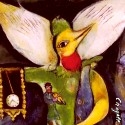
[ The following is related to our Torah reading this week, parashat Acharei Mot... ]
04.25.22 (Nisan 24, 5782) "You shall love the stranger as yourself" (Lev. 19:34). This mitzvah (commandment) applies not only to someone whom we regard as an "outsider," but more radically to the "stranger within ourselves," that is, to those aspects of ourselves we censor, deny, or reject. Like the prodigal son, we have to "come to ourselves" to return home (Luke 15:17), yet we won't know that we are unconditionally loved until we venture complete disclosure. That is the great risk of trusting in God's love for your soul: You must accept that you are accepted despite your own unacceptability... Those parts of ourselves that we "hide" need to be brought to the light, atoned for, healed, and reconciled. If we don't love and accept ourselves, then how can we hope to love and accept others?
Hebrew Lesson:
Lev. 19:34a reading (click):
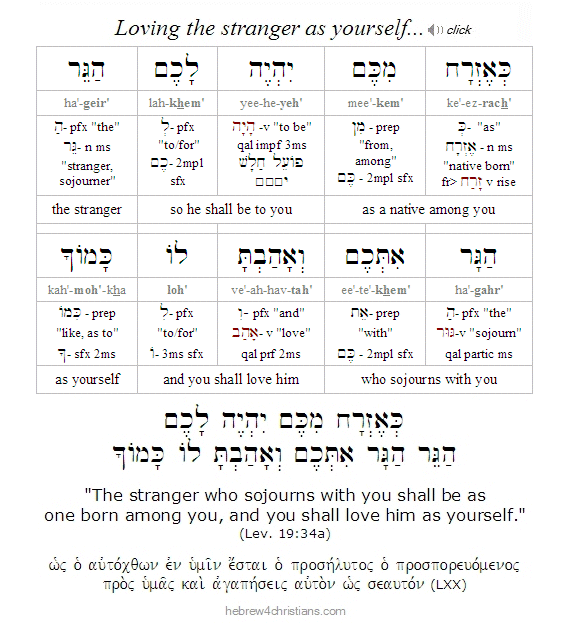 |
Note that a further implication of this passage is that God always intended his people to care for the "outsider" or "stranger," that He always wanted his people to embrace and care for others, and not to become insular, hidebound, and xenophobic (much less to regard being "chosen" as a matter of having some special status in the eyes of heaven). God loves all people, and the responsibility of God's people is to personally accept that love from heaven and to share it with others -- and that includes others whom we might regard as "outside" of our tribe, circle, etc. If you want to be great in God's kingdom, become the servant of all.
Yom HaShoah Podcast...

[ Yom HaShoah, or Holocaust Memorial Day, begins Wed. April 27th at sundown... ]
04.25.22 (Nisan 24, 5782) Shalom chaverim. I made an audio podcast for Yom HaShoah, or Holocaust Remembrance Day (see the link below). In it I discuss some of the philosophical influences that led to the atrocities of the attempted genocide of the Jewish people, including the rise of the idealism of G.W. Hegel and the pragmatic concept of the "dialectic" that was used to negate the value of the individual in preference to the collective.... Hegel directly influenced Karl Marx and his godless materialism and social revolutionary theories, and in general it may be said that German idealism led both to the nihilism of Friedrich Nietzsche and eventually to the barbarity of Adolf Hitler's national socialism. Though the subject matter is a bit philosophical, I nevertheless hope you will find it helpful.
Deliver Us from Ourselves...
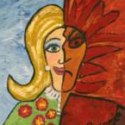
04.25.22 (Nisan 24, 5782) Holocaust survivor Viktor Frankl wrote, "No man should judge unless he asks himself in absolute honesty whether in a similar situation he might not have done the same" (Man's Search for Meaning, 1946). As Carl Jung expostulated, there is a "shadow" or darker side to ourselves that we normally keep hidden from view, even from ourselves. Yeshua said "out of the heart come evil thoughts, murder, adultery, sexual immorality, theft, false witness, slander, and these are what defile a person" (Matt. 15:19-20). Yet we often deny our own darkness. If you were given a magic ring which when placed on your finger made you invisible, would your behavior change? Would you be completely moral if you were entirely sure that you wouldn't be held accountable? (see The Republic: Ring of Gyges). Why is it difficult to understand our true motives and to "own" the darker impulses that sometimes rise within us? Each of us can act like a petty Pharaoh, and - dare I say it - even like a cruel Nazi at times, blaming others to pardon our own evil ways... When we come to the light to confess the truth, we become more aware of what we really need, and we can then ask God for healing; we then can forgive ourselves and begin to "lift off" our stuff from others.
Hebrew Lesson:
Jer. 17:9 reading (click):
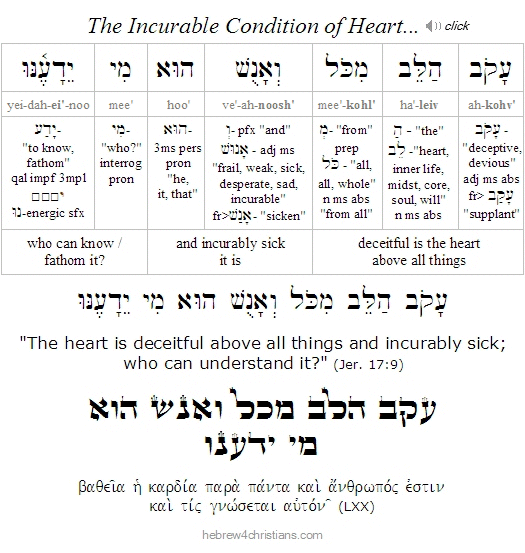 |
"The heart is deceitful above all things, and incurably sick - mi yadeinu? - who can understand it?" (Jer. 17:9). But how is the heart sick? Primarily by seeking to evade the truth of its great need; by denying its own inner poverty... "No person is saved except by grace, yes; but there is one sin that makes grace impossible, and that is dishonesty; and there is one thing God must unconditionally require, and that is honesty" (Kierkegaard).
Julian of Norwich said, "All shall be well, and all shall be well and all manner of thing shall be well," and yet the darkest pitch of depression is precisely the inability to take hold of such hope... Faith in the midst of darkness must yet affirm that despite own sin, our own wretchedness, nothing will hinder nor overcome the working of God's goodness... Amen, and may God help us believe, despite our unbelief (Mark 9:24).
Wed. April 27th at sundown
Holocaust Remembrance Day...
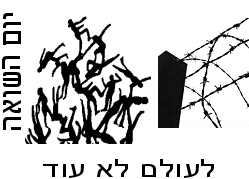
04.25.22 (Nisan 24, 5782) Yom HaShoah, or "Holocaust Remembrance Day," marks Israel's time of commemoration for the approximately six million Jews -- including over a million children -- who perished as a result of the actions carried out by Nazi Germany and its accomplices. It was inaugurated in 1953 and is annually observed on (or about) the 27th day of the month of Nisan, just a few days after Passover Week in the spring. In stark contrast to the celebration of freedom commemorated during Passover, Yom HaShoah marks a very difficult time when we revisit specters of absolute evil and again ask haunting questions about the power and presence of malevolence in our world. Often we are left speechless over the cruelty and depravity of human beings. It all seems so inexplicable, so needlessly horrible, so senseless, so vile... We may feel powerless, despondent, or full of indignation, but still we ask ourselves, how could this have happened? How was all of this possible?
Simply put, the Holocaust was the result of cowardice and self-deception... The systematic, institutionalized, and "politically correct" genocide of the Jewish people was made possible solely because so many others - including nominal "Christians" - forfeited their God-given responsibility to live as authentic individuals by passively surrendering their will to "the crowd." But giving up your identity to join a gang inevitably leads to fragmentation of the soul, potentially inviting in a "legion of demons..." Regardless of whether it's a gang of thugs running an inner city neighborhood, or the pressure to keep quiet over ethical misconduct at your place of work, or the desire to feel "approved" as a good citizen of the state, or even the pressure to conform to a particular religious group, in either case, "losing yourself" in the midst of the crowd is an evasion, a cop-out, and a desecration of the image of God within you. Indeed following the crowd is a form of slavery where you surrender your freedom for the sake of a supposed sense of security... You become self-deceived because you no longer "own" yourself but became the ward of "another." Becoming a member of a crowd makes you into a copy or similitude, a shadow rather than a person of substance.
We must never forget what happened to the Jewish people under Hitler. The Holocaust was made possible because people timidly refused to stand apart from the group to serve as bold witnesses of the truth. And the great risk of our age is the revival of political fascism that attempts to again control, disarm, and violate people's freedom all for the supposed "greater good" of the "state." We must remember that silence in the face of evil is itself evil: "First they came for the communists, and I didn't speak out because I wasn't a communist. Then they came for the trade unionists, and I didn't speak out because I wasn't a trade unionist. Then they came for the Jews, and I didn't speak out because I wasn't a Jew. Then they came for me, and there was no one left to speak out for me" (Martin Niemöller).
This year Yom HaShoah begins Wednesday, April 27th (at sundown) and runs through Thursday April 28th until sundown (a day early this year to not overlap the weekly Sabbath).
Hebrew Lesson
Zephaniah 1:15b reading (click):
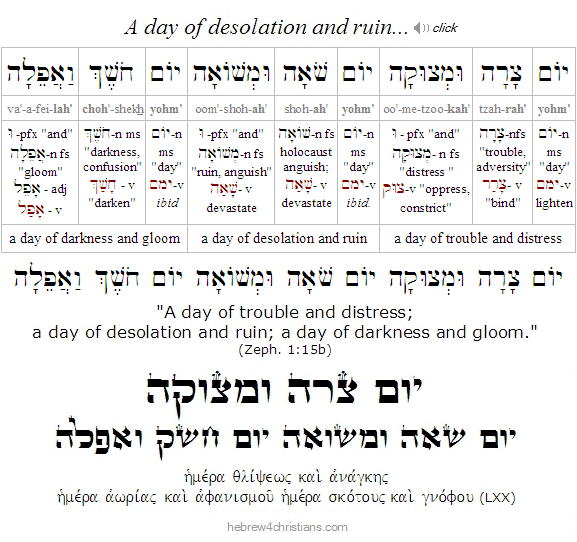 |
I realize that Yom HaShoah (i.e., Holocaust Remembrance Day) is observed this week, but I would be remiss not to mention an earlier genocide of Christians -- mostly Armenians but also Assyrians and Greeks -- that took place under the Islamic Ottoman Empire, throughout World War I, where the Turks systematically massacred approximately 1.5 million Armenians, 300,000 Assyrians, and 750,000 Greeks. Today April 24th is recognized (by some) as "Armenian Genocide Remembrance Day." In Yerevan, the capital of Armenia, hundreds of thousands of people walk to the Tsitsernakaberd Genocide Memorial to lay flowers at the eternal flame. For more information see the links listed below.
This week's Torah:
Acharei Mot - אחרי מות
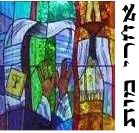
04.24.22 (Nisan 23, 5782) Shavuah tov, chaverim. Our Torah portion for this week is called Acharei Mot (אחרי מות). This portion transitions from the preceding readings regarding ritual purity (tahora) to recall the tragic incident of Nadab and Abihu, the two sons of Aaron who were killed when they offered "strange fire" upon the Altar of Incense during the dedication of the Tabernacle (see Lev. 10:1-2). Because these priests came close to the Holy of Holies and offered incense in a forbidden manner, the LORD commanded Moses to instruct Aaron that he should enter the innermost chamber only in a carefully prescribed manner once a year - on the tenth day of the seventh month - during a sacred time that would be called Yom Kippur, or the "Day of Atonement." Incidentally, this is the anniversary of the same date that Moses descended from Sinai with the restored tablets of the covenant after Israel was forgiven of the sin of the golden calf...
On this most solemn day, Aaron was commanded to immerse himself in a mikveh (pool of fresh water) and to dress in all-white linen. He then was instructed to slaughter a bull as a personal sin offering. Aaron then brought some ketoret (incense) to burn within the Holy of Holies before returning to sprinkle the blood of the sin offering seven times before the Ark of the Covenant (i.e., the kapporet or "Mercy Seat"). Aaron repeated this procedure using the blood of one of two goats that was selected (by lot) to be slaughtered as a sin offering on behalf of the people. After this, Aaron took more of the sacrificial blood and purified the Altar of Incense and the other furnishings of the Tabernacle. Later, the fat of these sacrifices was burned on the Copper Altar in the courtyard, though the hide and the flesh were to be entirely burned outside the camp.
After purifying the Tabernacle, Aaron went to the gate of the courtyard and laid both hands upon the head of the other goat (designated "for Azazel," a name for the accusing angel) while confessing all of the sins and transgressions of the people. This "scapegoat" was not slaughtered, however, but was driven away into the wilderness, carrying "all their iniquities unto a land not inhabited." Finally, Aaron returned to the Tent, washed and changed his clothes, and offered two more burnt offerings – one for himself and one for the people – to complete the purification process.
This elaborate ritual was ordained to be a decree for Israel, and the day of Yom Kippur was to be observed every year as a time of "affliction and mourning" for all the people. The portion ends with further instructions about making sacrifices, including the prohibition against offering sacrifices apart from the rites of the Tabernacle. The consumption of blood is explicitly forbidden, since blood was reserved for sacrificial purposes upon the altar.
Seeking What is Above...

[ "I am the Aleph and the Tav (את), the Beginning and the End," says the Lord, "who is and who was and who is to come, the Almighty." Amen, Yeshua is risen from the dead! He is alive! ]
04.22.22 (Nisan 21, 5782) "If then you have been raised with Messiah, seek the things that are above, where the Messiah is seated at the right hand of God (לִימִין הָאֱלהִים); focus your thoughts on the things above - not on things here on earth - for you have died, and your life has been hidden with Messiah in God" (Col. 3:1-3). Note that the verb translated "you have died" (ἀπεθάνετε) indicates that your death is a spiritual reality you must accept by faith. You don't "try to die" to the flesh, since that is the fool's errand of man's "religion." No, you trust that God has killed the power of sin and death on your behalf and imparted to you a new kind of life power (John 1:12; Eph 2:5).
Because you partake of an entirely greater dimension of reality, namely, the spiritual reality hidden from the vanity of this age, your life is likewise hidden from this world (Col. 3:4). Therefore we are instructed to consciously focus our thoughts (φρονέω) on the hidden reality of God rather than on the superficial and temporal world that is passing away: "For we are looking not to the things that are seen but to the things that are unseen. For the things that are seen are transient (i.e., "just for a season," καιρός), but the things that are unseen are eternal" (2 Cor. 4:18).
Just as you must trust and accept that Yeshua was crucified for you, identifying with you, taking your place in judgment, exchanging his life for your own, so you must trust and accept that you have been crucified with him, and that your old life was taken away and replaced with a new, indestructible nature of his resurrection life. In other words, a union is created where his "for me" is answered by my "with him." Χριστῷ συνεσταύρωμαι– "I already have been crucified in Messiah" (Gal. 2:20). Indeed the two go together: to trust in the finished work of Messiah for you is to trust in his finished work within you... When he died on the cross for you, which sins didn't he bear on your behalf? which remedy did he leave unfulfilled?
Hebrew Lesson
Psalm 73:24 reading (click):
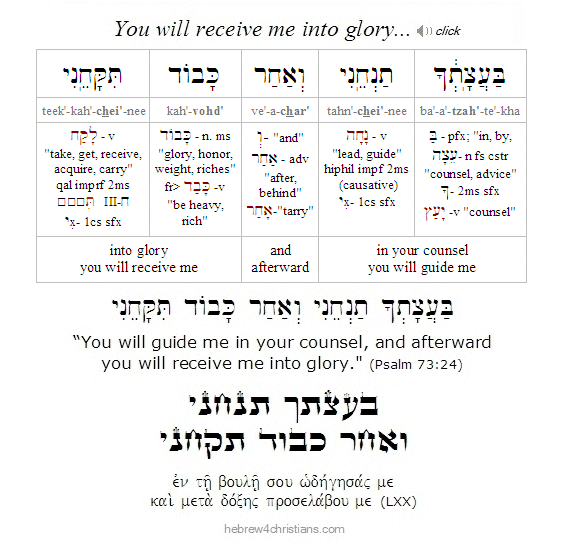 |
Out of the Straits...

04.22.22 (Nisan 21, 5782) The name for ancient Egypt in Hebrew is "mitzrayim" (מִצְרַיִם) a word that can be translated as "straits" or "narrow places" (i.e., -מ, "from," and צַר, "narrow"), suggesting that "Egypt" represents a place of constriction, tribulation, oppression, slavery, and despair. The Hebrew word for salvation, on the other hand, is "yeshuah" (יְשׁוּעָה), a word that means deliverance from restriction, that is, freedom and peace. As it is written: "From my distress (מִן־הַמֵּצַר), i.e., from "my Egypt," I cried out to the LORD; the LORD answered me and set me in a wide open place" (Psalm 118:5).
But why, it may be asked, did God tell Jacob: "Do not be afraid to go down to Egypt" (Gen. 46:3)? Why did God allow this excursion into "heavy darkness" that Abraham clearly foresaw (Gen. 15:12-13)? What is there about Egypt that prepares us to take hold of our promised inheritance? Joseph become a prince of Egypt; however, he was still captive to Pharaoh, and later, after he died, a "new Pharaoh arose" that did not acknowledge his contribution to Egyptian history (Exod. 1:8). All that remained of Joseph were his bones – a chest of bones that were carried out by Moses (and later buried by Joshua in Shechem). The "bare bones" of Joseph represented the essence of his faith, as he foresaw the time when God would rescue Israel from Egypt and raise him up in the land of promise (Gen. 50:24-26; Heb. 11:22).
A general principle of spiritual life is that the "the way up is the way down" (John 12:24). As Yeshua said, "Whoever would be first among you must be slave of all" (Mark 10:44). Becoming nothing (i.e., ayin) in this world is the condition for seeing something in the world to come. Unless a seed falls to the ground it abides alone (John 12:24). But we become "nothing" by trusting in the promise of God, not by trying to do it ourselves...
"The purpose of life here below is to carry us to the highest degree of taedium vitae ("weariness of life"). When God does everything to rob a person of any inclination to live, yet that person persists in faith that God is love, such a one has become ripe for eternity." - Kierkegaard, Journals (July 2, 1855)
This is not another venture of the ego. Life in the Spirit means trusting that God will do within you what you cannot do for yourself, to set you free from the bondage of yourself... From our point of view we take hold of what God has done for us by "letting go" of our own devices (Phil. 2:13); we let go and trust and are carried by the "Torah of the Spirit of life" (i.e., תּוֹרַת רוּחַ הַחַיִּים, Rom. 8:2). From heaven's point of view God administers "severe mercy" by afflicting us with vanity, trails of various kinds, lamentation, and disquiet of heart, in order to turn us away from all we desire or hope to find in this life as our good. Such "taedium vitae" is a great gift to the trusting soul, even if (at the present time) it may seem to suggest the distance and disregard of God's own heart.
The way is not trying but trusting; not struggling but resting; not clinging to life, but letting go... allowing trouble to pass as dark shadows that flit over the vista of transience.
God's way of deliverance is entirely different than man's way. Man tries to enlist carnal power in the battle against sin (i.e., religion, politics, etc.), but God's way is to remove the flesh from the equation. The goal is not to make us stronger and stronger, but rather weaker and weaker, until the ego is crucified and only the sufficiency of the Messiah remains. Then we can truly say, "I have been crucified with Messiah. It is no longer I who live, but the Messiah who lives in me. And the life I now live in the flesh I live by faith in the Son of God, who loved me and gave himself for me" (Gal 2:20). The word "Hebrew" (עִבְרִי) means one who has "crossed over" (עָבַר) to the other side, as our father Abraham did when he left the world of Mesopotamia (Gen. 14:13). Likewise it is on the other side of the cross that we experience the very power that created the universe "out of nothing" (i.e., yesh me'ayin: יֵשׁ מֵאַיִן) and that raised Yeshua the Messiah from the dead.
Hebrew Lesson
Psalm 118:5 reading (click):
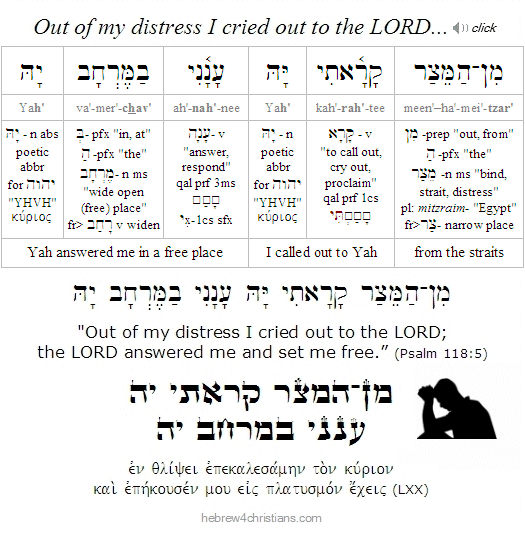 |
Love Song of Passover...
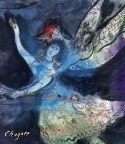
04.22.22 (Nisan 21, 5782) On the Sabbath day of Passover week it is customary to read the ancient "love song" of King Solomon called Shir Ha-Shirim (שיר השירים), or the "Song of Songs." In Jewish tradition, since Passover marks the time when our "romance" with God officially began, the sages chose this song to celebrate God's love for his people. And since Passover is also called Chag Ha-Aviv, the festival of spring, the Song is also associated with creativity and hope associated with springtime (Song 2:11-12). One way to read this poem is to see the king, who had disguised himself as a lowly shepherd to win the heart of the Shulamite woman, as a picture of Yeshua who took the form of a lowly servant to demonstrate his eternal love for those who are trusting in him... Indeed, the Song of Songs is linked to the "lilies" (i.e., shoshanim: שׁשׁנים) mentioned in Psalm 45, which presents a Messianic vision of the Divine Bridegroom and offers an "ode" for a forthcoming wedding.
אֲנִי לְדוֹדִי וְדוֹדִי לִי
הָרעֶה בַּשׁוֹשַׁנִּים
a·nee · le·do·dee · ve·do·dee · lee
ha·ro·eh · ba·sho·sha·neem

"I am my beloved's and my beloved is mine;
he pastures among the lilies."
(Song 6:3)
Download Study Card

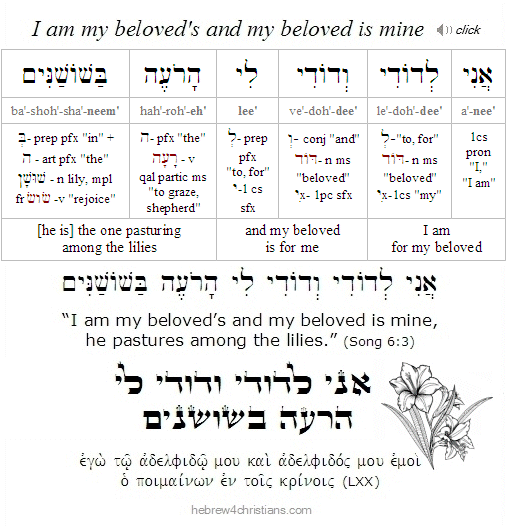
The essential meaning of Passover is of course rooted in the greatest love story ever told - about God, creation, the loss of Adam and Eve, the call of Israel, and the coming of the Messiah who would sanctify us as His own people, deliver us from the plague of death, and redeem us from the penalty of sin. Yeshua's mesirat nefesh ("giving over of soul" in sacrifice) and his triumph at the cross made the new covenant with God possible. As our Suffering Servant, He gave up His life for ours in exchange, redeeming us from the sickness unto death and making the way for our everlasting healing.
Whether or not you were able to attend a Passover Seder this year, please understand that there is always a place for you at His table. After all, Yeshua made a place for you within His heart when he died for you on the cross, and that is what Passover is really all about anyway. Pesach Sameach b'Yeshua, chaverim -- Happy Passover in Yeshua, friends!
For more on the connection between Passover and the Song of Songs, see the article "Shir Hashirim: Passover and the Song of Solomon."
 |
O Blessed Fault...

04.22.22 (Nisan 21, 5782) "O LORD, is it possible to really change? There is so much of me that is in need of help, I know not where to begin. Not just my past, O God, but my present hour is haunted by frailty and failure. Is there any likelihood that tomorrow will find me stronger, more righteous, or more reconciled with you? No, for you won't love me any more that you do right now, and you are always enough... Help me, then, to abide in your love, trusting that you will do within my heart what I am unable (or unwilling) to do for myself. And even if tomorrow I should repeat the same sins, help me understand that you love me just the same, and that you will never give up on me; you will never repudiate me. Help me to know that your love is stronger than the sickness of my sin. Amen."
כִּי־פְשָׁעַי אֲנִי אֵדָע
וְחַטָּאתִי נֶגְדִּי תָמִיד
kee-fe·shah·ai · a·nee · ei·dah
ve·cha·tah·tee · neg·dee · tah·meed

"For I acknowlege my transgressions,
and my sin is ever before me."
(Psalm 51:3)

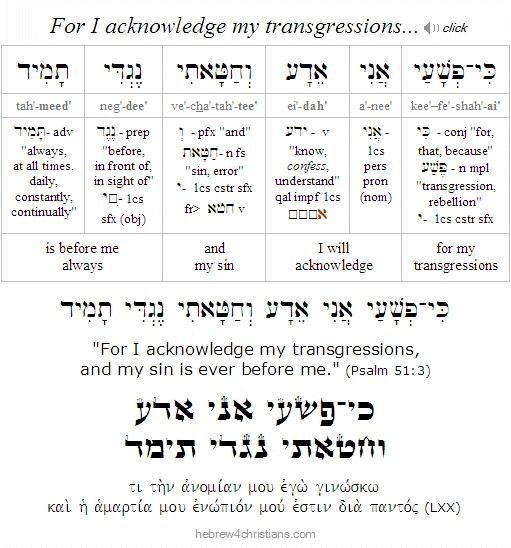
O blessed fault - the dread sin that breaks my heart before the LORD... Were it not for anguish of heart, how would I have sought the solace and healing of my Savior? Sorrow was God's messenger to my need. The fault of my sin occasioned God's mercy and grace, "for where sin abounded, grace did much more abound" (Rom. 5:20). The law was given by Moses, but love and faithfulness (חֶסֶד וֶאֱמֶת) come through Yeshua our Messiah (John 1:17).
In tears a man once confessed a sin to the Rabbi of Apt and told him how he atoned for it. The tzaddik laughed. The man went on to tell what more he intended doing to atone for his sin, and the rabbi kept on laughing. The man wanted to continue, but the laughter robbed him of the power to speak. He stared at the tzaddik in horror. And then his soul held its breath, and he heard a voice deep within. He realized how trivial all his fuss about atoning had been, and instead he turned to God...
Because Yeshua sacrificed Himself for our sins on the cross, the question no longer concerns what we must do to find atonement through religious rites or acts of penitence -- as if these might somehow assuage or propitiate God's disappointment over our sin. No, the remedy is far more profound and costly, and only God Himself could pay the price for our atonement. But because of Yeshua, we now may simply turn to God for the love and healing we so desperately need... This is the meaning of teshuvah. God has made the way for us to be received, loved, and accepted - despite the stain of our sins (Heb. 9:11-28). Yeshua paid the penalty for your sins, and the only real question remains: Will you believe it? Will you accept that you are accepted by the love of God?
The Name YHVH means "God is Present" and near, as close as your heart. The LORD is near, even when you feel lost and far away. Turn away from any evil you have done: do not keep it in mind, but instead see it in light of the greater good of God's love, patience, and forgiveness for you... See your sin only in relation to the cross. Resolve today by the power and truth of God's very love to turn away from darkness to His marvelous light.
Created for Love...

04.21.22 (Nisan 20, 5782) One of the great questions of life is: "What does it mean to be human?" or put another way, "Who or what am I?" This question is important to answer because how we think of ourselves will form our vision of our greatest good and how we should live our lives. The Torah teaches that human beings are directly created by God; each of us is unique and has been imparted nishmat chayim (נשׁמת חיים), the sacred "breath of life." Every human being therefore owes his or her existence to the creative (and sustaining) power of God (Gen. 1:27, 2:4; Col. 1:16-17; John 1:3; Heb. 1:2). God made you in the "secret places" of the depths -- yesh me'ayin (ישׁ מאין), "out of nothing" -- for His own sovereign will and eternal purposes (Psalm 139:15, Rev. 4:11). This is implied in the name YHVH (יהוה) itself, the One who is the Source and Ground of all that exists. Unlike concepts derived from classical Greek philosophy, however, God is not an abstract and indifferent power behind the phenomenal realm, but is revealed as אלהי אברהם אלהי יצחק ואלהי יעקב - "the God of Abraham, Isaac, and Jacob," the One who calls people to be in a relationship of trust with Him (Exod. 3:15). Ultimately you can only know yourself and why you exist as you embrace the truth of God and his love for you...
We are created for relationship with God, to know God and to love Him forever, but until our lives find their substance in that relationship, we remain existentially anxious and in secret dread... This relationship is more than that of knowing God as the Creator, but further as the source of your own heart, the center of your dreams, and the vision of your purpose for existence. The language of love goes beyond that of imperative: it seeks to "upbuild" the person and to elevate them to be the beloved...
Therefore people are free to accept the love God, or free to reject it, because love does not coerce but honors the individual's choice. Nevertheless - and paradoxically enough - a choice must be made, and there is no way to opt out of the call to freedom. Not choosing to receive the love of God is tantamount to rejecting that love. This is the side of the relationship that God reserves as your Creator: you are free to choose, but choose you must....
Of course the "choice" to trust is a dynamic process, an "education for eternity," wherein we learn to be healed of our divided hearts and to focus wholeheartedly on the blessing of God's personal love for us. The process is a humbling one, requiring a lifetime of teshuvah... God "demands" that you choose the good so that you can freely choose his love. We are being disciplined by heaven to learn how to order our affections and to freely exercise our will. Therefore "work out your own salvation with fear and trembling, for it is God who works in you, both to will and to work for his good pleasure" (Phil. 2:12-13).
As our Lord said: "Unless you turn (shuv) and become like children, you will never (οὐ μὴ) enter the kingdom of heaven" (Matt. 18:3). Such is the importance of simple trust in God... Indeed Yeshua repeatedly taught us to trust God as "Abba," our Father (אבא אבינו). He taught that we are warmly accepted as part of his family; that we are under his constant care; and that we live within his household as beloved children... And even though God is utterly transcendent, the Infinite One (אין סוף) and Creator of all worlds, he humbles to behold the things that in heaven and earth (Psalm 113:6). He is as close as your next breath; he leans upon your bosom at the table; he anticipates what you need before you ask him... The "fear of the Lord" is that you might fail knowing his great love for you -- that you will forget your true identity and lose yourself in lesser things. Therefore affirm the truth that you are loved with an unending and everlasting love, that you are safe, that you are accepted, and that nothing can ever separate you from the power of love. God your Father hears you, he knows you, and he loves you bekhol levavo (בכל־לבבוֹ) - "with all his heart."
Hebrew Lesson
Psalm 139:14 reading (click):
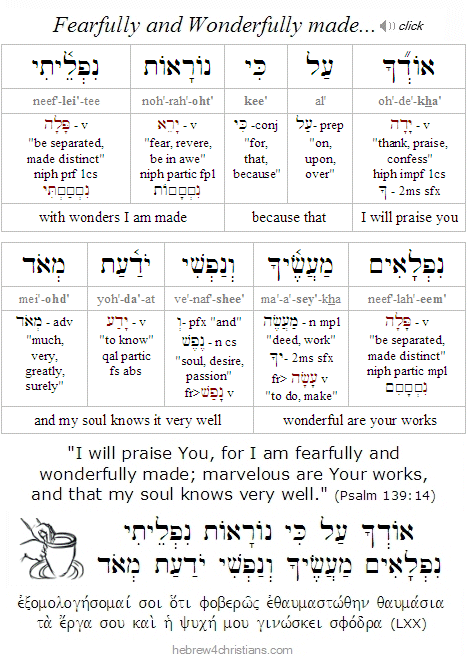 |
The Truth that Saves...
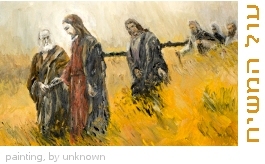
04.21.22 (Nisan 20, 5782) Some people profess faith in God as the means of attaining a happier or more prosperous life, though such reasoning focuses on what faith does for them as its primary justification (e.g., "your best life now!"). Such pragmatic thinking, however, perseveres just so long as the benefits and happy results continue, but when troubles, disappointments, or tribulation arise (as they inevitably will), the sham is exposed and the person often turns away or becomes bitter. You see, "faith" like that is conditional because it desires God not for the sake of truth, but for the sake of what God may do for the person. And still other people may profess faith because they are afraid to die and they think that seeking God's approval by doing "religion" (i.e., flattering God) or performing various "good deeds" is a sensible precaution and hedge against the unknown. This sort of "faith," however, is only as strong as the secret dread that love must constantly be earned, but when such a believer eventually becomes exhausted over the pressure to be perfect, he or she becomes angry and loses their aspiration.
Listen, the "bad news" comes first, namely that you are hopelessly lost, undone, incurably sick, and that you are powerless to change yourself despite your best efforts. That's the "verdict" (true word) of the law; that's the hard reality. The "good news," on the other hand, is that all you ever hoped for, all your dreams for true love and unending life come as a gift from God, not from something with you. The good news declares that you have been found, you have been brought back to love, you are forever healed, and that God changes you through a sacred and mysterious work done on your behalf through Yeshua the Savior. Trusting in God's love for you is the first and last step of "saving faith," and there is nothing you could ever add to what has already been done for you... "It is finished."
Again, the message of the "gospel" is that you cannot fix yourself; you cannot "earn" or merit God's approval by means of your own attempts at self-justification, but you must wholeheartedly die to yourself by trusting in the love of God given in the mission and life of Yeshua. God justifies the ungodly who believe in his sacrificial love that was vindicated at the cross. Because of Yeshua you are accepted and beloved despite your sinful condition. You trust that God loves you despite yourself, and eventually you learn to turn away from yourself to walk out the blessing and miracle of the divine life.
Yeshua is the way, truth and the life (John 14:6). So-called "saving faith" is the ongoing reality of being in a "right relationship" with God Himself (Rom. 5:1). "The saving power of faith resides thus not in itself, but in the Almighty Savior on whom it rests... It is not faith in Christ that saves, but Christ Himself who saves those of faith" (B.B. Warfield). Amen, there is the Sign and there is the Signified; there is the word and the Power the word represents. Faith is a gift from God, the miracle of "regeneration" that does not come from human agency of any kind but solely from God himself (John 1:12-13; Eph. 2:8-10; Titus 3:5-6).
Now all this may sound wonderful, perhaps "too good to be true," but that's the very issue, isn't it? - namely whether you believe that it is really true. Did Yeshua come to personally rescue you and save you from your sins, or do you just (wistfully) hope that the old story is true? When he died on the cross, was it for your sins, or for the sins of other people? If you were the only soul in all the world, sinful, wretched, and sentenced to die, would you believe that Yeshua would come just for you and to die in your place -- that God himself would rather die than see you lost, broken, and forever dead inside? Such is quintessential question for the redemption and healing of your soul...
There is really only one really good reason to believe in God, however, and that is because you sincerely believe that truth is important; and there is only one good reason to believe in Yeshua, and that is because you believe that he reveals the truth about the meaning of life. "For this purpose I was born and for this purpose I have come into the world -- to testify to the truth. Everyone who is of the truth listens to my voice" (John 18:37). It begins with the question of whether you will hear his voice. As C.S. Lewis said, "If Christianity is untrue, then no honest man will want to believe it, however helpful it might be; if it is true, every honest man will want to believe it, even if it gives him no help at all" (God in the Dock).
Hebrew Lesson
John 14:6 reading (click):
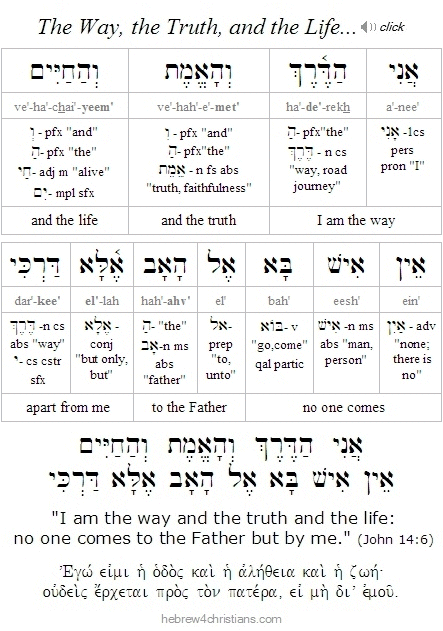 |
The Great War for Souls...

[ "For our struggle is against spiritual forces of evil..." Eph. 6:12 ]
04.20.22 (Nisan 19, 5782) Ultimately we are living in the midst of a great spiritual war -- the war for truth. This has been the battle from the beginning. The very first recorded words of Satan (הַנָּחָשׁ) questioned God's truth: "Did God really say...?" (Gen. 3:1). In the end there will be found two types of people: those who love the truth and those who love the lie. These are the children of light (בְּנֵי הָאוֹר) and the children of darkness (בְּנֵי הַחשֶׁךְ), respectively. Followers of Yeshua the Messiah are told to "walk as children of light" / ὡς τέκνα φωτὸς περιπατεῖτε (Eph. 5:8). The children of light are called to be am kadosh - a holy people - separate from the evil engendered by the fallen world and its forces, just as the very first creative expression of God was the separation of light from darkness (Gen. 1:3-4). The children of light "hate evil and love the good," and conversely, the children of darkness "hate the good and love evil" (Psalm 34:21, Prov. 8:13, Amos 5:15, John 3:20-21). Regarding the heavenly Zion to come, it is written: "nothing unclean will ever enter into it, nor anyone who does what is detestable or practices falsehood (lit. "makes a lie"), but only those whose names are written in the Lamb's book of life" (Rev. 21:27).
We must stand for the truth, because the truth is what sets us free (John 8:32). As Yeshua said, "For this purpose I was born and for this purpose I have come into the world -- to testify to the truth. Everyone who is of the truth listens to my voice" (John 18:37). We must turn away from the lie to embrace the truth. One day all that is hidden will become manifest. "As I looked, thrones were placed, and the Ancient of Days took his seat; his clothing was white as snow, and the hair of his head like pure wool; His throne was ablaze with fire and its wheels were all aflame. A river of fire was streaming forth and proceeding from his presence; a thousand thousands served him, and ten thousand times ten thousand stood before him; court sat in judgment, the books were opened" (Dan. 7:9-10).
If the devil can't kill you, he will try to make you insane... He will lie to you about who you really are; he will attempt harass you and vex your soul. He will whisper fearful things in your ear... He will make what is small seem big and what is big seem small. He will raise dark suspicion within your soul, causing you to walk in mistrust. He will remind you of your sins to make you feel ashamed and dirty. He will hiss that you are unlovable and unworthy. He will argue on behalf of your flesh that you deserve better than this... He will tempt you to seek relief in cisterns of emptiness and futility. Most of all, he will try to cast a spell to make you forget that you are truly a prince or princess of God Almighty... The devil seeks to drive you into the exile of loneliness and despair. Resist him in the Name of the LORD!
Fret not, therefore, because of evil doers, for they shall soon wither away (Psalm 37). The Great Accounting is coming: "For there is nothing created that is hidden - אין יצור נסתר - but all things are naked and open to the eyes of the One to whom we must render an account" (Heb. 4:13). Every thoughtless word shall be accounted for in the Day of Judgment to come (see Matt. 12:35-37). Recompense is indeed coming, though it is reserved for the LORD God alone, who is ha'shofet ha'tzaddik (השופט הצדיק) - the Righteous Judge (Psalm 7:11). "According to their deeds, accordingly He will repay, fury to His adversaries, recompense to His enemies; to the coastlands He will repay recompense" (Isa. 59:18).
Hebrew Lesson
Eccl. 12:14 reading (click):
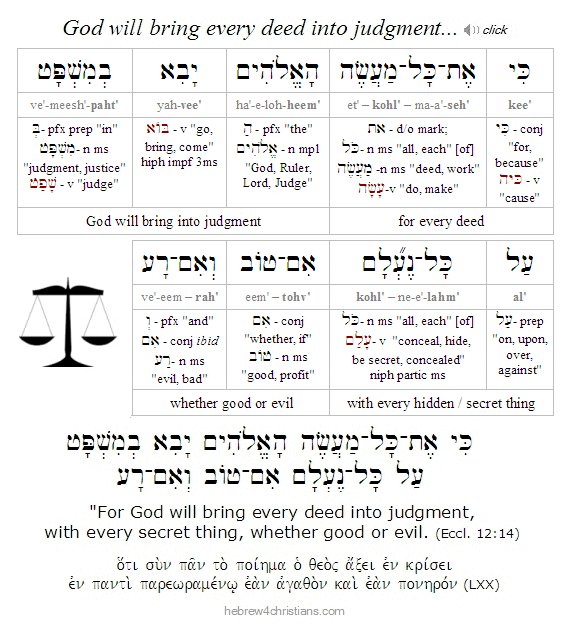 |
Our Need to Think Clearly...

[ "Clear thinking requires courage rather than intelligence." -- Thomas Szasz ]
04.20.22 (Nisan 19, 5782) An axiom of (fallen) human nature is that people tend to believe what they want to believe, and that they project their biases and preconceptions while assuming they are genuinely thinking... Yeshua warned us against making hasty judgments based on superficial appearances without taking time to investigate a matter carefully: "Do not judge according to appearance, but judge with righteous judgment" (John 7:24). He also warned that "wisdom is justified by her children," meaning that reason is often a servant to the passions (Luke 7:35). Rarely do people examine evidence and then form their conclusions but instead think selectively - listening to what appeals to them while ignoring questions that might threaten their preconceptions and prejudices. Many allow their personal feelings about an issue to so overwhelm them that they are incapable of coherent thinking at all. This leads to the strange phenomenon that the most opinionated of people often literally do not know what they are talking about, since they rarely define their terms, they are reluctant to seriously question their own predispositions and presuppositions, and they experience "emotional incontinence" when they are challenged about their convictions. This is quite common in today's colleges and universities, which have become bastions of irrationality and cultural programming. Such people are intellectually lazy, meaning they do not want to do the work that clear thinking requires but prefer to have their intolerance confirmed, to oversimplify topics, and to find their convictions in the propaganda of the crowd, pop culture, the snobbery of their clique, or in mass media...
We must learn to be aware of how our emotional needs can be exploited by other people, and in particular, by politicians, social engineers, activists, advertisers, fear mongers, agitators, racists, anarchists, and so on. Everyone has a real need to be loved, accepted, affirmed, and so on, though it is vital to have these needs met by God, not by man.... Manipulators know how to play with our emotions, perhaps by flattery or by appealing to our anxieties, and thereby they can deceive us into accepting as true what is untrue. When we are flattered, for example, we may transfer our positive feelings of affirmation with what the person is trying to con us into accepting. Often flatterers seem earnest and sincere, but this disguises ulterior motives at work. In political rallies appeals to the crowd abound: glistening generalities, appeals to snobbery or fear, sanctimonious humbug, and feel-good groupthink are common deceptive techniques. "Yes we can! yes we can!"
Professional propagandists (e.g., mass media news) regularly employ emotional appeals and obfuscated "thinking" to intimidate us, presenting false dilemmas designed to circulate carefully scripted words and rumors intended to win our confidence and to control our thinking (i.e., "brain washing"). Often it's not what is being said, but what is not being said - namely, the assumption that God is not real, that government is our savior, and so on. They often employ neuro-linguistic techniques of various kinds to disseminate a narrative or "politically correct" version of the "news" that is deliberately misleading and which serves the interests of the ruling elite. The use of slogans, the repetition of mantras expressing unquestioned assumptions, the dishonest tactic of making "straw men" out of other viewpoints, and the ongoing fraud that purports to provide "unbiased, objective" news is all part of the charade of our age...
It is important to seek the "bottom line" or hidden agenda at work when listening to the voices or opinions that the mass media injects into the "vocabulary" and conversation of mass culture. Our feelings are important, of course, though they are easily manipulated by the unscrupulous. Those who manipulate our emotions are bullies of the soul, trying to frighten us into joining their cause, warning us not to question their ideals at the risk of violence. The constant barrage of mass media disinformation attempts to enslave the minds of people, proclaiming the "godless gospel" that God is not in control of the world, that we must live in fear, that we must not think too deeply or dare to question the prejudices and doctrines of the oligarchs and "princes" of this evil world. Like a person of moral conviction, a logical person is an "enemy of the state" these days, because the godless manipulators of our age use deceptive techniques to suppress the truth of God and the truth about reality.
Hebrew Lesson
Psalm 37:30-31 reading (click):
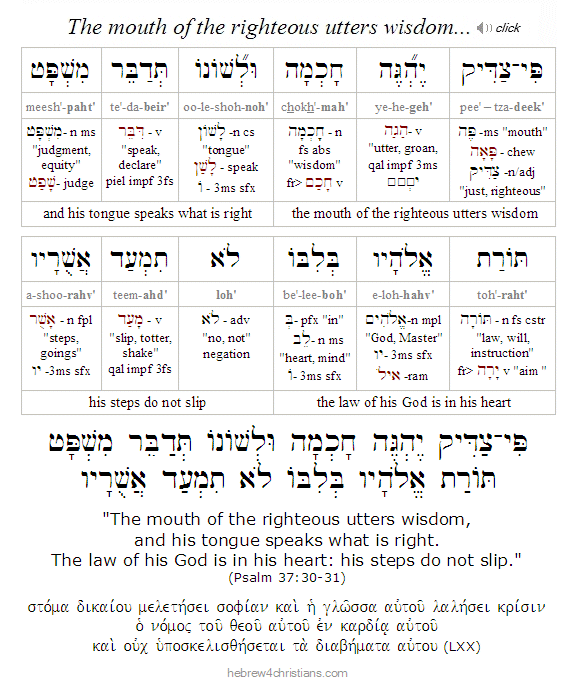 |
"These, then, are the two points I wanted to make. First, that human beings, all over the earth, have this curious idea that they ought to behave in a certain way, and cannot really get rid of it. Secondly, that they do not in fact behave in that way. They know the Law of Nature; they break it. These two facts are the foundation of all clear thinking about ourselves and the universe we live in." - C. S. Lewis
The Better Covenant...

04.19.22 (Nisan 18, 5782) Though Moses was instructed to make the Mishkan (i.e., "Tabernacle") according to the "pattern" revealed at Sinai (Exod. 25:9,40), King David -- by direct revelation of the Holy Spirit -- later changed the size of the Tabernacle and its vessels, made additions to the original design, and even changed the priestly order of service itself (see 1 Chron. 28:11-20). King David's vision shows us that both the structure and service of the Tabernacle were provisionally intended to give physical expression to a deeper spiritual reality, and indeed the New Testament calls the service of the Temple "a copy and shadow (ὑποδείγματι καὶ σκιᾷ) of the heavenly things" (Heb. 8:5). But what were these heavenly things if not the ministry of Yeshua as our High Priest of the New Covenant? The New Covenant (בְּרִית חֲדָשָׁה) is called a "better covenant based on better promises" (Heb. 8:6), that was "not like the covenant that I made with their fathers on the day when I took them by the hand to bring them out of the land of Egypt" (see Jer. 31:31-33). Our Scriptures comment: "In speaking of a new covenant, he has made the first one obsolete, and what is becoming obsolete and growing old is ready to vanish away" (Heb. 8:13). Likewise we read, "When Messiah appeared as high priest of the good things that have come, then through the greater and more perfect tabernacle (not made with hands, that is, not of this creation), he entered once for all into the holy places, not by means of the blood of goats and calves but by means of his own blood, thus securing an eternal redemption" (Heb. 9:11-12). The earlier Levitical priesthood and its sacrificial system was "a shadow (σκιᾷ) of the good things to come, and not the true form (i.e., substance) of these realities" (Heb. 10:1).
Moses was at first commanded of the Mishkan ("Tabernacle"): "Follow the pattern of the vision..." (Exod. 25:40); King David later instructed his son regarding the vision for the Temple: "Do the work according to the revealed plan..." (1 Chron. 28:19); but Yeshua our LORD declared: "The One greater than the Temple is here" (Matt. 12:6).
"And they came to Jerusalem. And He entered the Temple and began to drive out those who sold and those who bought in the Temple, and he overturned the tables of the money-changers and the seats of those who sold doves. And he would not allow anyone to carry any vessel through the Temple." - Mark 11:15-16
Note that during this "cleansing of the Temple," Yeshua actually stopped the performance of the priestly duties: he "would not allow anyone to carry any vessel through the Temple," which interrupted the course of the priestly service itself. Let that sink in....
A principle of valid interpretation is that "a text without a context is a pretext." Therefore it is important to remember to carefully study the Torah of Moses, the prophets, and the Writings, since without the Tanakh (i.e., the "Old Testament") the new covenant scriptures are without context (1 Cor. 10:6; 2 Tim. 2:15, etc.). Moreover, Yeshua himself said: "Search the Scriptures, for in them you think you have eternal life, yet these very Scriptures testify of me" (John 5:39). Indeed Yeshua preached that he came to fulfill the true purpose of the law (Matt. 5:17-19), and to his disciples he interpreted that fulfillment: "And beginning with Moses and all the Prophets, he interpreted to them in all the Scriptures the things concerning himself.... "Then he said to them, 'These are my words that I spoke to you while I was still with you, that everything written about me in the Law of Moses and the Prophets and the Psalms must be fulfilled.' And then he opened their minds to understand the Scriptures" (Luke 24:27,44-45). The New Testament itself assumes that followers of Yeshua would be study and be familiar with the Hebrew Scriptures. When the Apostle Paul wrote, "All Scripture is breathed out by God and profitable for teaching, for reproof, for correction, and for training in righteousness" (2 Tim. 3:16), he was referring to the Jewish Bible, of course, since the New Testament writings had not yet been compiled....
As for the moral aspect of the law, however, the Torah of Yeshua is superior to that of the lawcode of Moses (especially as it was interpreted by the Pharisees), since Yeshua constantly focused on the heart and its inner motivations... That's the essential point of the Sermon on the Mount and the description of the law's true requirement (see Matt. 5:21-48). Notice how Yeshua quotes from the law and then moves it "inward," to be about the heart rather than mere external conformity. The deepest point, however, is that Yeshua is the Substance of the Temple and its fullest expression. He is the Great Lamb of God who offered himself up as our atoning sacrifice upon the cross, "bearing our griefs and carrying our sorrows, wounded for our transgressions and crushed for our iniquities" (Isa. 53). There is an altar wherein those who serve under the Levitical system of worship have no right to eat (Heb. 13:10).
Hebrew Lesson
Jer. 31:33b reading (click):
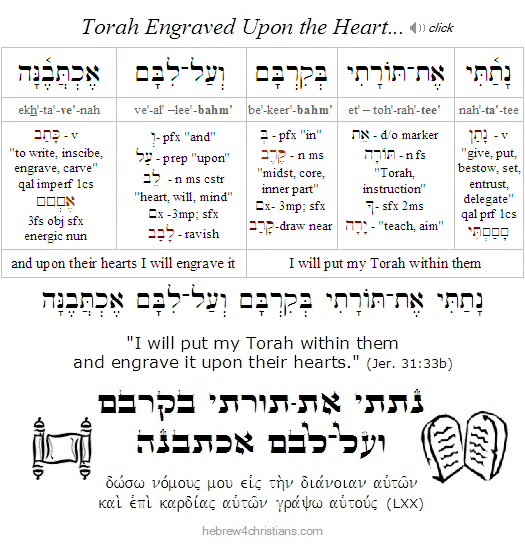 |
Reciting the Omer Blessing
Countdown to Shavuot...

[ The original "advent calendar" is the Omer Count given to Israel to anticipate the giving of the Torah 49 days after the Exodus from Egypt... ]
04.19.22 (Nisan 18, 5782) In the Torah we are told to count forty nine days – seven weeks of days – from the day following Passover until Shavuot (i.e., Weeks or "Pentecost"). This period of time is called Sefirat HaOmer (ספירות העומר), or the "counting the [barley] sheaves" (see Lev. 23:15-16; Deut. 16:9). In abstract terms, it's as if there is a dotted line pointing directly from Passover to Shavuot - a "Jubilee" of days - representing the climax of Passover itself. The early sages identified this climax as the revelation of the Torah at Sinai (which indeed did happen exactly 49 days after the Passover in Egypt), but the New Testament identifies it as the outpouring of the Holy Spirit (רוח הקודש) that ratified the reality of the New Covenant of God at Zion. The redemption process that began at Passover was therefore completed at Shavuot, and that "completion" was the revelation of God's love and deliverance for the entire world. And though the Jewish sages did not fathom the use of the otherwise forbidden leaven in the offering (see Eph. 2:14). The countdown to Shavuot therefore goes beyond the giving of Torah at Sinai and points to the greater revelation of Zion. Shavuot is the fulfillment of the promise of the Holy Spirit's advent to those who are trusting in Messiah (Acts 2:1-4). "Counting the Omer," then, is about receiving the Holy Spirit to experience and know the resurrected LORD of Glory. You can "count" on that, chaverim!
In this connection note again that the climax of the 49 days was not the giving of the law at Sinai (i.e., matan Torah), but rather the revelation of the altar (i.e., the"Tabernacle") and its subsequent fulfillment in the sacrificial death of Yeshua as our Lamb of God. Moreover, it was during this time that Yeshua made His post-resurrection appearances to His disciples and indeed ascended to heaven during this period... Of particular importance is 1) the beginning of the count of the omer since it signified the waving of the firstfruits and therefore the resurrection of Yeshua (1 Cor. 15:20); 2) the 40th day of the Omer (Mem B'Omer), when Yeshua ascended back to heaven, and 3) the climactic 49th day of the Omer (Shavuot) when the Holy Spirit was given to the disciples in fulfillment of the promise of Yeshua that we would not be left comfortless (Acts 2:1-4). Shavuot, then, marks the time of "Jubilee" of the Spirit, when are clothed with power to serve the LORD without fear...
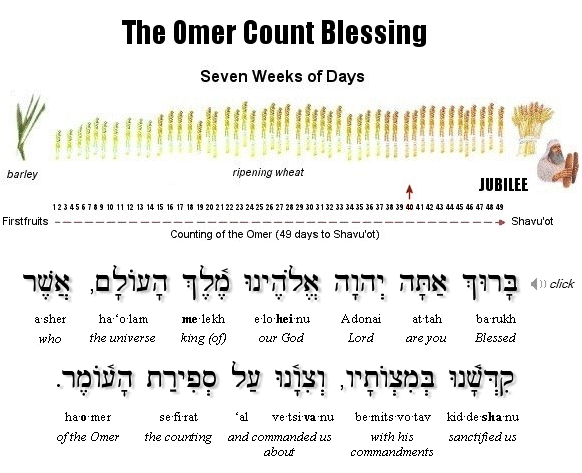 |
It can feel a bit overwhelming when you consider how the spring holidays of Passover, Unleavened Bread, Firstfruits, and the Omer Count overlap on the Torah's calendar. And it is always a bit difficult explaining the interrelationships between the holidays as well:
Note: Some people get a bit "OCD" about the 49 day countdown, making it into a religious ritual with kabbalistic overtones, but the Torah simply says to count down the days until Shavuot, or Pentecost, since this has major implications regarding the advent of Messiah and the promise of the New Covenant.... For more on this subject, see: "Sefirat HaOmer: Counting the Sheaves to Shavuot."
Life Triumphs over Death...
He has Overcome!
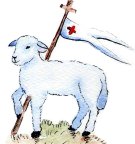
04.18.22 (Nisan 17, 5782) The Scriptures make clear that Yeshua is the true Passover Lamb of God (שֵׂה הָאֱלהִים) whose sacrificial death and shed blood causes the wrath of God to "pass over" (pasach) those who are trusting in Him (John 1:29, 3:36; Acts 8:32-36; 1 Cor. 5:7-8; 1 Pet. 1:18-20, etc.). Amen! Worthy is the Lamb who was slain! (Rev. 5:12). But while the sacrifice of Yeshua gives us forgiveness (סְלִיחָה) and atonement (כַּפָּרָה) with God (Eph. 1:7; Rom. 5:11; Heb. 9:12, etc.), the resurrection of the Messiah (i.e., techiyat ha-Mashiach: תְּחִיַּת הַמָּשִׁיחַ) justifies His work of salvation on behalf of the sinner and forever vindicates the righteousness of God (Rom. 4:20-5:1; Rom. 10:9; Heb. 13:20-21). As Yeshua said: "I am he that lives but was dead; but behold, I am alive for evermore (הִנֵּה אֲנִי חַי לְעוֹלָם וָעֶד), Amen; and have the keys of hell and of death" (Rev. 1:8). Rejoice friends, for our LORD lives! He has killed the power of death and forever reigns in indestructible life!
חַי־יְהוָה וּבָרוּךְ צוּרִי
וְיָרוּם אֱלוֹהֵי יִשְׁעִי
chai-Adonai · oo'va·rookh · tzoo·ree
ve·ya·room · E·lo·hei · yeesh·ee

"The LORD lives, and blessed be my rock,
and exalted is the God of my salvation!" (Psalm 18:46)

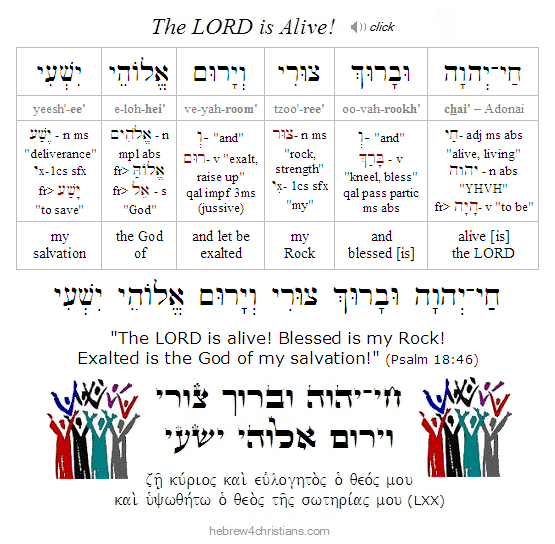
The resurrection of Yeshua is not an "academic" or speculative question to be considered in purely rational terms, but rather is a matter of eternal life or death. How we choose to respond to its message determines our destiny. Everything turns on whether we awaken to the risen reality and Presence of Yeshua in our lives. Without Him we are hopeless; with Him we are more than conquerors (1 Cor. 15:14; Rom. 8:37).
The resurrection of Yeshua IS the "good news" itself;
it is the essence and completion of his ministry as our Savior.
Everything turns on whether we awaken to
the risen Reality and Presence of Yeshua in our lives...
Yeshua completely atoned for our sins and His resurrection validated that God the Father accepted His sacrifice. It was God the Father (i.e., Reality) who raised Yeshua in victory (Gal. 1:1, Rom. 10:9), and those who put their trust trust in Him are declared righteous on account of their faith. Yeshua "was delivered for our offenses, and raised again for our justification" (Rom. 4:25). As Jesus Himself said, "Because I am alive, you also will live" (John 14:19).
Related Topics:
All things made new!
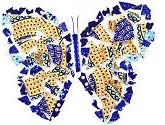
[ Today is Yom Habikkurim, the anniversary of the resurrection of Yeshua from the dead... ]
04.18.22 (Nisan 17, 5782) Some people attempt to provide empirical "proof" of the resurrection of Yeshua, though strictly speaking this will always be insufficient. After all, the very guards at the tomb who witnessed the sight of the angel rolling away the stone later conspired with the religious establishment to suppress the message of the resurrection (Matt. 28:2-4, 11-15). Even Yeshua said that personally witnessing someone coming back from the dead would be insufficient for teshuvah (Luke 16:30-31). No, we do not see the resurrection of Yeshua through the eyes of the flesh, but rather through the eyes of faith. We believe in order to see; not the other way around... Empirical evidence at best provides human reason with a sense of logical "probability," but faith is a life-and-death matter of the heart, soul, and mind... Only the inward testimony of the Holy Spirit (i.e., argumentum Spiritus Sancti), can "drag" the sinner to the confess the reality of the risen Yeshua, and once His Living Presence is encountered, categorically everything changes and nothing will remain the same forever. He makes all things new! (2 Cor. 5:17).
Hebrew Lesson
Isa. 43:19a reading (click):
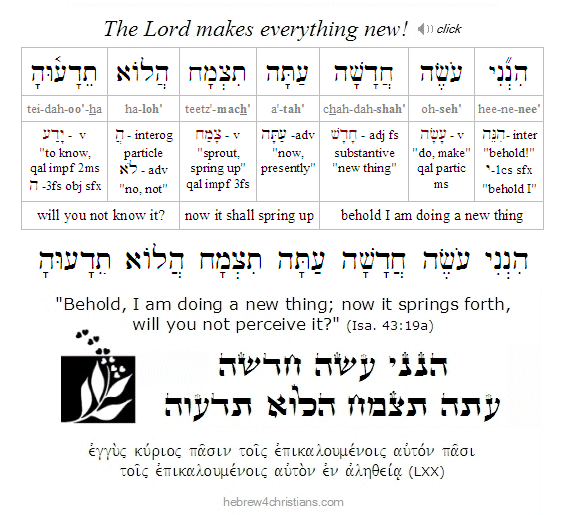 |
Life Triumphs over Death...
He is Alive!
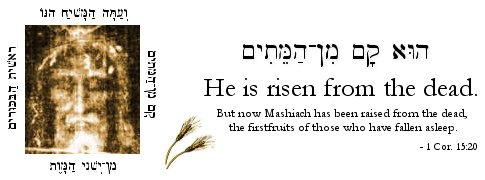
04.17.22 (Nisan 16, 5782) Yeshua celebrated an early Passover Seder with his disciples on Nisan 13, being arrested later that night. He was then illegally tried by the Sanhedrin that same night and unjustly convicted by Pontius Pilate the following day, Nisan 14, being crucified later that day, during the time when the Passover lambs were being sacrificed at the Temple. He died the afternoon of Nisan 14 and was buried before sundown that day. He was raised from the dead three days and nights later (a "day" understood using the Biblical "evening-morning" sequence), and was therefore raised from the dead sometime before sunrise on Nisan 17. Mary Magdalene and Salome first saw the stone rolled away from the tomb after sunrise that morning (see the link below for detailed chronology). On the secular calendar, this means the anniversary of the resurrection would be after sundown on Sunday, April 17 this year, and that Yeshua would have been first seen alive after sunrise on Monday.
Of course there are some other ways to understand the chronology of the crucifixion, burial, and resurrection of Yeshua, and I am not claiming infallibility in my understanding, though the reckoning I have provided coheres with the general accounts given in the gospels. The heart of the matter, however, is that Yeshua is risen -- He is alive from the dead -- and this means He completed the work of salvation performed on our behalf! Amen, He is alive right now -- and able to save to the uttermost all who call out to him in faith. Shalom chaverim.
Hebrew Lesson
Psalm 18:46 reading (click):
 |
Personal Note: This has been a challenging Passover season for us, as during our removal of chametz we found black mold in the main bedroom of the house (a result of using a vaporizer every day for a few months after I was released from the hospital for Covid pneumonia). Though we were able to hold a Passover Seder Friday evening, Olga and I have worked nonstop the last few days removing the mold and cleaning. Sadly I needed to throw away nearly 500 precious books as well! Anyway, I don't have much energy to debate people about the timing of the resurrection, etc., though for what it is worth, I have shared my thinking on the subject in some detail in "Yom Habikkurim: Messiah as the first fruit of the harvest." Please, if you have a viewpoint other than mine on this topic, God bless you -- and by all means walk in your convictions. You do not need to win an argument with me to know the truth of Yeshua's resurrected Life in your heart! Just believe and trust in Him. Shalom.
The Passion of Yeshua...

[ The following is related to holiday of Passover, which begins this evening at sundown. ]
04.15.22 (Nisan 14, 5782) "Abba father, if it is possible, let this cup be taken from me. But not what I want, but what you desire" (Mark 14:36). Yeshua was willing to fully surrender to the will of the Father, even though he experienced dread, pain, and even sweat "as great drops of blood" (ὡσεὶ θρόμβοι αἵματος) during his agony (Luke 22:44). He honored the Father as the deeper will for his life; he yielded to the Father's care even in the darkest hours of his persecution and torment. This is the passion that was foretold by the Akedah, when Isaac willingly offered himself upon the altar in obedience to his father Abraham's desire. By entrusting himself to God's care, Yeshua was able to love his enemies, to turn the other cheek, and to overcome evil with the greater power of good. His love was not reciprocally offered; it did not depend on our acceptance, but was grounded in the will of the Father. He loves us as we are, even when we were his enemies: "God shows his love for us in that while we were still sinners, Messiah died for us" (Rom. 5:8).
Hebrew Lesson
Isaiah 53:5 reading (click):
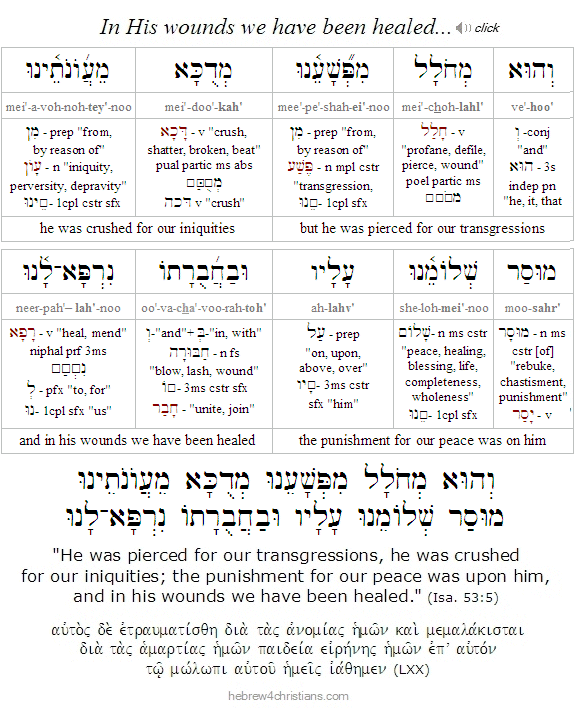 |
As Isaiah foretold of Yeshua: "But he was pierced (profaned) for our transgressions; he was crushed for our iniquities; the punishment for our peace was upon him, and in his wounds we are healed" (Isa. 53:5). In this famous passage, note that the word translated "wound" (i.e., chaburah: חַבּוּרָה, "blow" or "stripe") comes from the same root as the word for "friend" (i.e., chaver: חָבֵר), and therefore we can read "in His friendship we are healed." Yeshua gave up His life for us so that we could become his friends... As he later said regarding his sacrifice: "Greater love has no one than this, that one lay down his life for his friends" (John 15:13). Indeed of Yeshua it may truly be said, Yesh ohev davek me'ach – "there is a friend who sticks (davek) closer than a brother" (Prov. 18:24). Praise God for Yeshua our "Leper Messiah," and the "friend of sinners" (Luke 7:34). O give thanks to the LORD for his great friendship for you and for the great gift of his salvation! Happy Passover, friends!!
The Meaning of Passover...
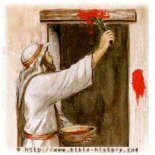
04.15.22 (Nisan 14, 5782) In Exodus chapter 12 we read about the institution of Passover and the final plague that was to befall the Egyptians on the Passover night. When we think of this time, we may imagine God "passing over" those houses that had the blood of the lamb smeared on their doorposts, though it could be said that God passed into the homes of those who trusted him, while he withdrew His Presence from those that did not...
To see this note that two different words are used that can be translated as "pass over." First, God said, "I will pass over (i.e., avar: עֲבַר) the land of Egypt that night, and I will strike all the firstborn in the land of Egypt, both man and beast; and on all the gods of Egypt I will execute judgments; I am the LORD" (Exod. 12:12). But directly after saying this, God promised to "pass over" (i.e., pasach: פָּסַח) the homes of those who trusted in him to impart his protection from the plague of death: "The blood shall be a sign for you, on the houses where you are. And when I see the blood, I will pass over to you (lit. עֲלֵכֶם, 'upon you'), and no plague will befall you to destroy you, when I strike the land of Egypt" (Exod. 12:13). In other words, when God would see the blood of the Passover lamb, he would pass over to enter the house and "cover" its occupants from the judgment of death.
The blood of the Passover lamb sheltered people from the plague of death by atoning for their sin by means of a substitutionary sacrifice. The Torah states that "the life (i.e., nefesh: נֶפֶשׁ, or 'soul') of the flesh is in the blood" (Lev. 17:11), and therefore death represents the separation of the soul from the body. The life blood of a sacrificial lamb was therefore offered in exchange for the death and destruction of others. Eating the lamb "roasted by fire" meant identifying with the death offered in exchange for your own; eating matzah, or unleavened bread, signified being delivered in haste, apart from the "rise of the flesh" or human design; and eating maror, or bitter herbs, recalled the bitterness of former bondage.
The first time the word "blood" occurs in the Scriptures concerns the death of Abel, the son of Adam and Eve who was murdered by his brother Cain. After Abel's blood was shed, the LORD confronted Cain and said, "What have you done? The voice of your brother's blood is crying to me from the ground" (Gen. 4:10). Since blood is the carrier of life, it bears the energy and vitality of life: it has its own spiritual "voice." Likewise, the blood of Yeshua, the true Lamb of God who died upon the cross, speaks on our behalf, and reverses the power of death by creating a barrier that death can no longer cross, since the death of the sacrificial victim "exchanges" the merit and power of life. Unlike the blood of Abel that "cries out" for justice, the blood of Yeshua cries out for mercy (Heb. 12:24). Putting our trust in the provision of God's sacrifice causes His wrath (or righteous judgment) to pass over while simultaneously extending love to the sinner.... This is the essential message of the gospel itself, that we have atonement through the sacrificial death, burial, and resurrection of Yeshua our Savior, the great Lamb of God. As Yeshua said, "I tell you the solemn truth, the one who hears my message and believes the One who sent me has eternal life (חַיֵּי עוֹלָם) and will not be condemned, but has passed over (i.e., μετά + βαίνω, lit., "crossed over" [עָבַר]) from death to life" (John 5:24). Just as God's judgment passes over from life to death on my behalf; so His love passes over from death to life on my behalf...
The idea of substitutionary atonement is surely mysterious and complicated, but ultimately the message is simple: God loves you and has made a way for you to be eternally accepted -- despite your sin... That's the "good news" of the cross. That's what Yeshua meant when he said, "Just as Moses lifted up the serpent in the wilderness, so must the Son of Man be lifted up, that whoever believes in him may have eternal life. For God so loved the world, that he gave his only Son, that whoever believes in him should not perish but have eternal life (חַיֵּי עוֹלָם). For God did not send his Son into the world to condemn the world, but in order that the world might be saved through him" (John 3:14-17). Humanity as a whole has been "bitten by the snake" and needs to be delivered from its deadly venom. Just as the image made in the likeness of the destroying snake was lifted up for Israel's healing, so the One made in the likeness of sinful flesh was to be lifted up as the Healer of the world (Rom. 8:3). All we need to do is look and believe. Yeshua died for you so you can live. He stands at the door and knocks, offering to "pass over" your sin and to impart to you his life in exchange (Rev. 3:20).
Hebrew Lesson
Exodus 12:13b Hebrew reading:
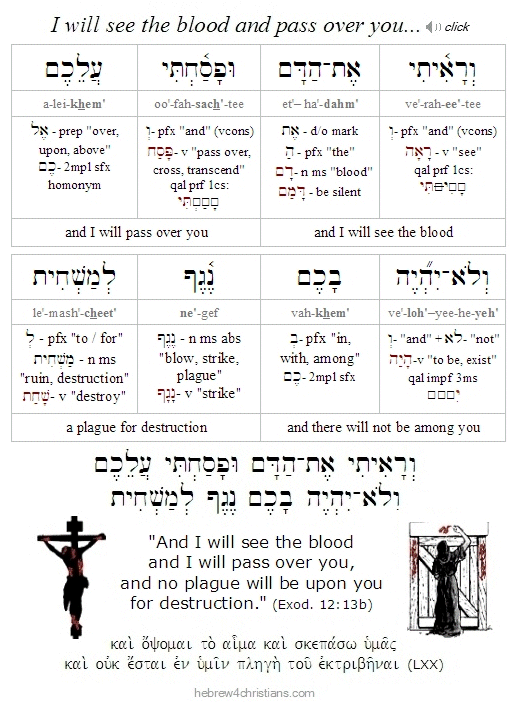 |
Crossing Over to Life...

[ The following concerns the holiday of Passover, which begins tomorrow at sundown... ]
04.15.22 (Nisan 14, 5782) During a traditional Passover seder, we customarily drink four cups of wine (or grape juice), based on the four promises of redemption given Exodus 6:6-7: "I will bring you out; I will deliver you; I will redeem you; and I will take you to be my people" (i.e., hotzei'ti, hitzal'ti, ga'alt'i, lakakh'ti). This custom dates back to the time of the Second Temple period (Mishnah: Pesachim 10). The early sages justified the custom of the four cups by appealing to the Torah's general instruction to establish a "service" (עֲבוֹדָה) or ceremony to commemorate the Exodus, which eventually took the form of the "Passover Seder." Here is the relevant passage from the Book of Exodus:
"When you enter the land that the LORD will give you as he promised, observe this ceremony (שְׁמַרְתֶּם אֶת־הָעֲבֹדָה הַזֹּאת). And when your children ask you, 'What does this ceremony mean to you?' then tell them, 'It is the Passover sacrifice to the LORD (זֶבַח־פֶּסַח הוּא לַיהוָה), who passed over the houses of the Israelites in Egypt (אֲשֶׁר פָּסַח עַל־בָּתֵּי בְנֵי־יִשְׂרָאֵל בְּמִצְרַיִם) and spared our homes when he struck down the Egyptians.' Then the people bowed down and worshiped." (Exod. 12:25-27)
During Yeshua's last Passover seder with his disciples, he took a cup of wine and identified it with his sacrificial death for our sins: "And he took the cup, and after he had recited the blessing, he gave it to them, saying, "Drink of it, all of you, for this is my blood of the new covenant, which is poured out for many for the forgiveness of sins" (Matt. 26:27-28). We know this was the third cup of the seder because Yeshua said these words after the meal: "And likewise he took the cup after they had eaten, and said, "This cup that is poured out for you is the new covenant in my blood" (Luke 22:20, see also 1 Cor. 11:25).
In the traditional seder, the third cup was raised after the meal to commemorate God's promise of redemption (i.e., ga'alti: "I will redeem you"). The Mishnah says the wine in this cup recalls the shed blood of the korban Pesach that was applied to the doorposts in Egypt, causing the plague of death to pass over. Similarly, Yeshua associated this cup with the blood he would shed on the cross, causing death to "pass over" those who would put their trust in him. Yeshua called this the cup of the new covenant (בְּרִית חֲדָשָׁה), that is, God's new agreement (ketubah) to regard all those who trust in the sacrificial death of Yeshua for the forgiveness of their sins to be justified and forever made right with Him. Because of God's redemption given through the blood of the Messiah, we are "justified" by faith - it is "just-if-I'd" never sinned and "just-if-I'd" always obeyed. This is the good news of the redemption we have in Yeshua, the miracle of the "exchanged life" (2 Cor. 5:21).
The inner meaning of Passover has to do with our sanctification, our deliverance, and our redemption given through Yeshua our Savior, the true Lamb of God (1 Cor. 1:30). However, we remain in a state of "already-not-yet" expectation regarding the complete fulfillment of the New Covenant, since this covenant was given to ethnic Israel regarding their national deliverance and the establishment of the kingdom of Zion within the earth (Jer. 31:31-37). It is only after Yeshua returns as Israel's rightful King that "all Israel shall be saved" and the New Covenant will be fulfilled. At that time, we will partake of the Cup of Restoration (lakakh'ti) with Yeshua in His kingdom (Matt. 26:29), and then we shall all exclaim, "Praise the LORD, O Jerusalem! Praise your God, O Zion!" (Psalm 147:12).
The theme of Passover is our freedom - and that includes freedom from the old sins that seek to define and enslave us... Because of Yeshua, you are no longer who you once were... you have crossed over from death to life! You are briah chadashah - a new creation in the Messiah! May this be a season in your life of real miracles -- namely, a deeper connection with our LORD and with one another. Peasach Same'ach!
Hebrew Lesson
Psalm 147:12 Hebrew reading:
"The" Question of Passover...

04.14.22 (Nisan 13, 5782) During the Passover Seder we begin our retelling the story of the Exodus when the question is sung: "Mah nishtanah ha-lailah ha-zeh mikol ha-leilot?" - What makes this night differ from all other nights? This is "the" central question of Passover, asked for thousands of years, and the answer is always the same: Avadim Hayinu: "We were slaves, but God redeemed us from bondage by the blood of the lamb (דַּם הַשֶּׂה)."
In this connection note that there were not many lambs, but the LORD told Israel: "You shall keep it [i.e., the Passover lamb] until the fourteenth day of this month, when the whole assembly of the congregation of Israel shall slaughter him (את) at twilight (Exod. 12:6). Each family put their trust in God's uniquely appointed sacrifice to be delivered from the plague of death (מכת המוות). There is no Passover apart from the blood of the Lamb of God....
מַה נִּשְׁתַּנָּה הַלַּיְלָה הַזֶּה מִכָּל הַלֵּילוֹת
mah · neesh·ta·nah · ha·lai'·lah · ha·zeh · mee·kohl · ha·ley·loht?

"What makes this night differ from all other nights?"
Man of our Sorrows...

04.14.22 (Nisan 13, 5782) Happy Passover season, dear friends - despite the oppression and darkness we experience in this evil and benighted world.. Recall that God had compassion for his people as they were suffering in Egypt. The LORD told Moses, "I have surely seen the affliction of my people who are in Egypt and have heard their cry... I know their sorrows" (Exod. 3:7). The grammar here is intense: "seeing I have seen" (רָאה רָאִיתִי). Understand, then, that God surely sees your struggles too, friend. Second, know that God heeds the outcry (צְעָקָה) of your heart, and indeed, he interprets your groaning as if it were for the sake of serving him. Your heart's cry is transformed by grace to be the cry for God himself, for relationship with Him: "The cry of the people has come to me," he again told Moses (Exod 3:9), which means all the sufferings, the wrongs, the hopes, the fears, the groans, the despair, the prayers, were present before him, as if he counted every word and sigh. Third, realize that God knows your sorrows; he gathers all your tears into his bottle (Psalm 56:8). The word translated "sorrows" (מַכְאב) is the same word used to describe the "Man of sorrows" (i.e., ish machovot: אישׁ מַכְאבוֹת), Yeshua our Suffering Servant, who gave up his life to deliver you from bondage to your darkness, sorrow, and fear (Isa. 53:3-5).
Hebrew Lesson
Exod. 3:7 Hebrew reading:
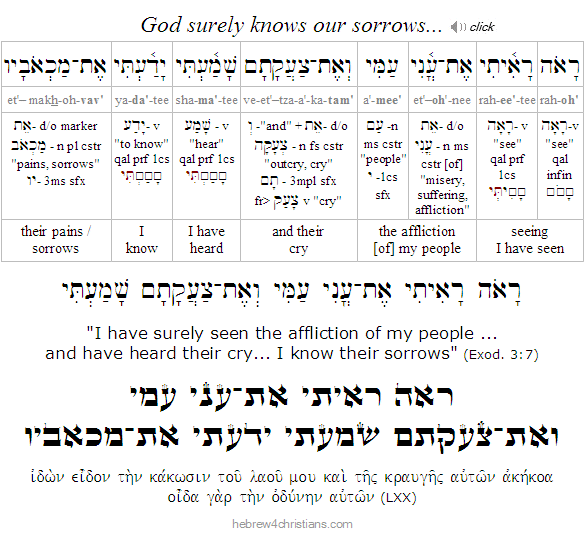 |
Our Broken Matzah...
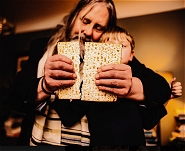
[ The major holiday of Passover begins Friday, April 15th at sundown this year... ]
04.14.22 (Nisan 13, 5782) During our Passover Seder, we will place three matzahs on the table, said to represent Abraham, Isaac and Jacob, respectively. During the "Yachatz" step of the seder, the middle matzah (representing Isaac) will be broken to recall how Isaac was sacrificed in obedience to his father, foreshadowing the sacrifice of Yeshua by God the Father. Indeed, the Talmud states, "We break the middle matzah in tribute to Yitzchak (Isaac), who accepted the sins of the people upon himself" (Shabbos 89b). The smaller half of this broken matzah will be eaten later during the Motzi Matzah step, while the larger half will be eaten during the "Afikomen" step, near the end of the night...
In Hebrew, the middle of something is it's heart - the heart of the heavens, the heart of the earth, the heart of the sea, the heart of a person... Since the offering of Isaac by Abraham foretold of the greater offering of Yeshua by God Himself, when we break the middle matzah, then, we recall the broken heart of God over the pain Yeshua endured by taking our sins upon Him at the cross...."For our sake he made him to be sin who knew no sin, so that in him we might become the righteousness of God" (2 Cor. 5:21).
During his Passover seder with his disciples, Yeshua "took matzah, and after blessing it broke it and gave it to the disciples, and said, "Take, eat; this is my body" (Matt. 26:26). Since Yeshua did this while they were eating dinner, the matzah he broke would have been the Afikomen, thereby making the connection between the hidden bread (lechem ha-nistar) that would be broken given for our deliverance. The matzah we eat during Passover is called lechem oni (לֶחֶם ענִי) - "the bread of [His] suffering" - and eating the Bread of Life that was "broken for us" remembers ish makhovot, the man of sorrows, the suffering of our LORD...
Hebrew Lesson
Deut. 16:3b Hebrew reading:
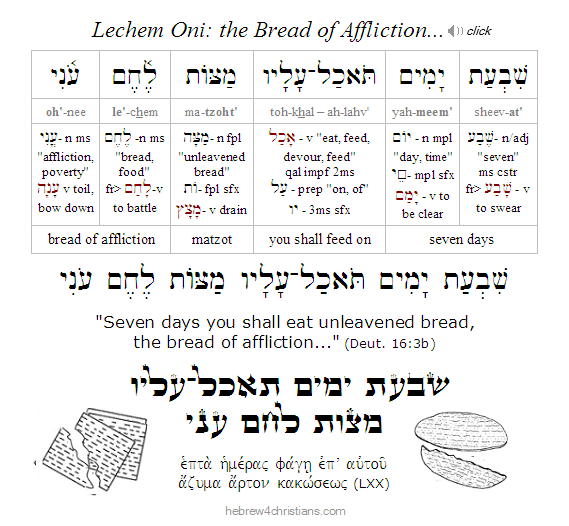 |
Intimacy of Passover...
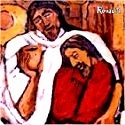
04.14.22 (Nisan 13, 5782) Unlike the rituals and practices of organized religion, the Passover Seder takes place at home, not in a sanctuary, and may be conducted by anyone, not by professional clergy or a rabbi... The heart of the seder is shared meal celebrating our connection with family, our friends, the "called out" people of God who take refuge in his promises. Such intimacy is altogether fitting, since Passover was foreshadowed in the original paradise, was prophetically and poignantly re-enacted by Abraham's sacrifice of Isaac, and was later affirmed by Israel at the time of the Exodus. In each case the blood of the lamb is central: to cover the shame of Adam and Eve's transgression; to express the heart of God's compassion in the substitution of the lamb for Isaac, and for the redemption of the families of Israel during the Passover. Most of all, however, the Passover Seder foretells and recalls the sacrifice of Yeshua on our behalf as the great Lamb of God who delivers us from our slavery to sin. Therefore heed the Torah's general rule about the holidays: "You shall rejoice in your festival" (Deut. 16:14) by delighting in the salvation of God, by embracing our family and friends in the sure hope of eternal life.
Hebrew Lesson
Psalm 33:22 reading (click):
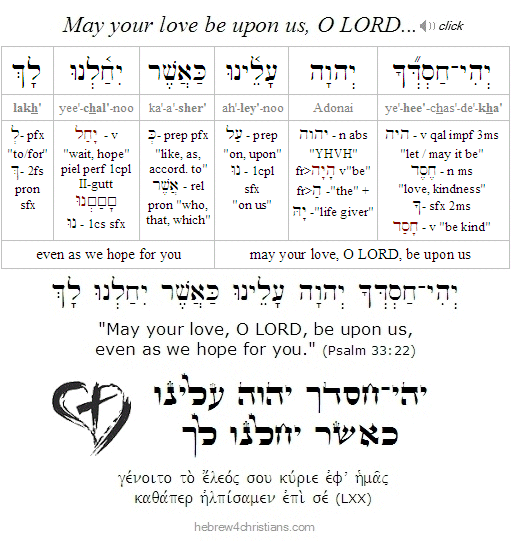 |
The Archetype of Passover...
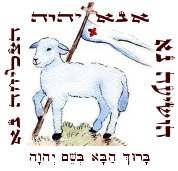
04.14.22 (Nisan 13, 5782) Passover is the archetypal picture of the redemption of God. Its theme goes back to the very beginning, to the orchard of Eden itself, when Adam and Eve disobeyed God and ate from the forbidden tree. Because of their transgression, our original ancestors incurred the plague of death and were exiled from the Divine Presence, though God graciously promised to heal them through the coming Seed of the woman – the Savior who would crush the head of the serpent and break the fangs of his venomous sting (Gen. 3:15). Soon after making this great promise, God clothed our primordial parents with the skin of a sacrificed lamb (Gen. 3:21), linking their coming deliverance with the "Lamb of God slain from the foundation of the world" (1 Pet. 1:18-20). The very first "Passover" was in the garden. The story extends to the world to come, too, where in the redeemed paradise of God we will celebrate the victory of the Lamb who was slain for our redemption (Rev. 5:12-13, Rev. 19:7).
The great story of our redemption is revealed on two levels in Scripture - one that concerns the paradise of Eden (the universal level), and the other that concerns the paradise of Israel (the particular level). Therefore Yeshua is both rightly called the "Lamb of God who takes away the sins of the world" (John 1:29) and "the Messiah our Passover Lamb who has been sacrificed for us" (1 Cor. 5:7). Likewise he is both called the "Seed of the woman," and "the Son of David"; the "Second Adam," and the "King of the Jews," and so on. The story of Israel's redemption in Egypt therefore serves as an allegory of both the universal salvation promised in Eden (i.e., the lamb slain from the foundation of the world) as well as the revelation of the sacrificial ministry of Yeshua as Israel's promised Messiah. Yeshua is both the Savior of the world as well as Israel's true King and Deliverer.
Hebrew Lesson
Rev. 5:12 Hebrew reading (click):
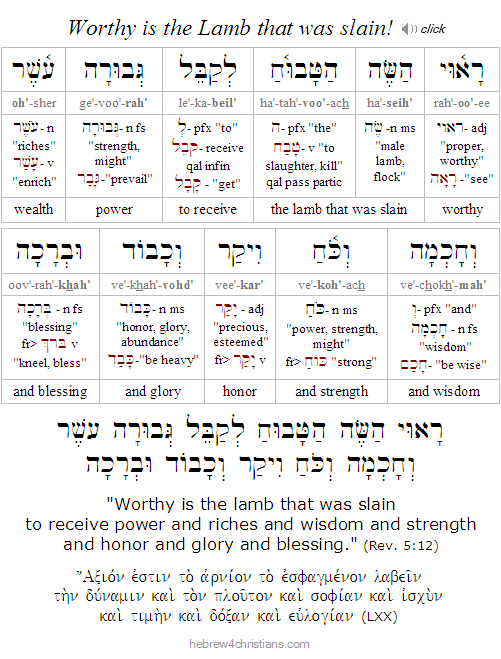 |
For more see:
Passover and the
Limping Messiah...

04.13.22 (Nisan 12, 5782) As we prepare our hearts for the Passover, recall that the Hebrew verb "pasach" (פָּסַח) can mean not only "to pass over," but also "to limp," suggesting the heel of Messiah that was "bruised" in the battle for our salvation (Gen. 3:15). As it is written, "Just as Moses lifted up the serpent in the wilderness, so must the Son of Man be lifted up, that whoever believes in him may have eternal life. For God so loved the world, that he gave his only Son, that whoever believes in him should not perish but have eternal life (חַיֵּי עוֹלָם). For God did not send his Son into the world to condemn the world, but in order that the world might be saved through him" (John 3:14-17). Humanity as a whole has been "bitten by the snake" and needs to be delivered from its deadly venom. Just as the image made in the likeness of the destroying snake was lifted up for Israel's healing, so the One made in the likeness of sinful flesh was to be lifted up as the Healer of the world (Rom. 8:3). All we need to do is look up and believe...
Some people might object that the verb pasach (פָּסַח) alludes to the wounded Savior, our great Passover "Lamb who was slain" (John 1:29; 1 Pet. 1:19-20; Rev. 5:12; 13:8); however, it is evident that the Hebrew root can mean "to limp" as a result of a wound. Indeed the Hebrew participle pise'ach (פִּסֵחַ) means "lame" or "crippled" (for example, see Lev. 21:18; Deut. 15:21; 2 Sam. 9:13, etc.). Furthermore, there are several uses of the verb pasach that explicitly mean to "limp" or "be lame." For example, in 2 Sam. 4:4 it says: "and he (Mephibosheth) fell and 'became lame" (וַיִּפָּסֵחַ); in 1 Kings 18:21, we read: "how long will you limp (פּסְחִים) between two opinions?" and in 1 Kings 18:26 it is written: "and they (the priests of Baal) 'limped upon the altar" (וַיְפַסְּחוּ עַל־הַמִּזְבֵּחַ) in a pagan ritual dance. In other words there is clearly a connection between Passover and becoming wounded, and this alludes to the Suffering Servant, the Messiah, whose heel was bruised in the battle for our deliverance (Gen. 3:15). Those who wish to argue that pasach cannot refer to the "limping" of the Messiah, the Passover "Lamb of God" who was slain for our sins in the battle against the serpent, therefore have the burden to explain the meaning and usage of the verb pasach in these other verses of the Hebrew Scriptures.
Hebrew Lesson
The First Prophecy of the Torah:
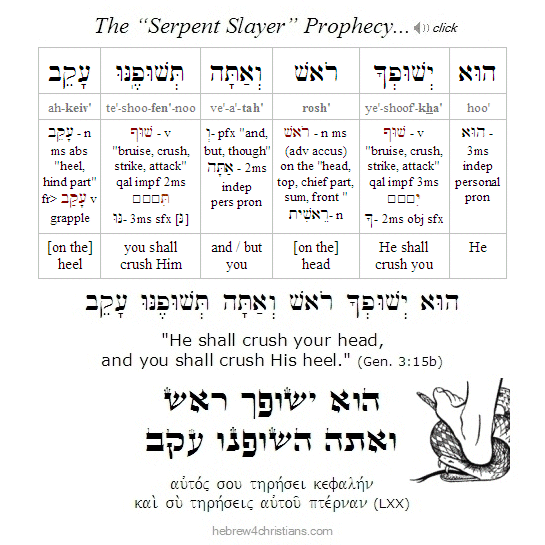 |
The Sign of Life...

[ The holiday of Passover begins this Friday evening, April 15th, at sundown... ]
04.13.22 (Nisan 12, 5782) "The blood shall be a sign for you, and when I see the blood, I will pass over you (פָסַחְתִּי) that no plague will befall you to destroy you..." (Exod. 12:13). The blood would be a sign for the eye of faith, i.e., "for you," and not for the unbelieving world at large. During the afternoon of the 14th, the korban Pesach (Passover lamb) was slaughtered and its blood smeared on all three sides of the doorframe, top, right and left, in the form of the letter Chet (ח). This letter is connected with the word chai (חי), "alive," and chayim (חיים), "life," signifying that atoning life is in the sacrificial blood (Lev. 17:11).
Note that the letters of the Name YHVH (יהוה) - the Name of Divine Compassion - were said to be daubed on the doorposts: The Yod (י) was written on the top beam, the Vav (ו) on the right doorpost, and the Hey (ה) on the left. And since Yeshua is indeed YHVH, his Name was the sign of life written by the faithful. Amen, the Hebrew word for "sign" is ot (את), referring to the One who is the Alef (א) and Tav (ת), the First and the Last, the Almighty (Rev. 1:8).
Hebrew Lesson
Exod. 12:13b Hebrew reading (click):
 |
The Exodus for Today...
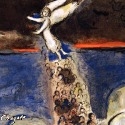
[ "The LORD is a warrior; the LORD is His Name" / יהוה אִישׁ מִלְחָמָה יהוה שְׁמו (Exod. 15:3). ]
04.13.22 (Nisan 12, 5782) An old midrash says that at the time of the great Exodus, only a remnant of Israel was actually saved while all the others died in the makkah (plague) of darkness, having fallen so low that they could not believe in the redemption or even want to be redeemed (Rom. 9:27-28)... How dreadful; how tragic! God forbid that we should give up our hope now, chaverim, especially because of the great salvation Yeshua secured for us at the cross (Heb. 2:3-4; Heb. 6:4-6). בכל דור ודור -- be'chol dor vador -- "in each and every generation" an individual should look upon him or herself as if he or she (personally) had been rescued from the "Egypt" of this world...
And yet divine history is somewhat "cyclical" in its expression. The closer we go back to the beginning, the more we see how the future was "seeded" and gets replayed in every generation. Both the Tree of Life (עֵץ הַחַיִּים) and the Tree of the Knowledge of Good and Evil (עֵץ הַדַּעַת טוֹב וָרָע) were present in the original paradise (Gen. 2:9). When Eve listened to the lies of the nachash (serpent) and regarded the forbidden tree as "desirable to make one wise," she immediately began her descent into exile. At the very dawn of human history, then, we see that "truth" (אֱמֶת) apart from God (א) leads to death (מֵת). Adam and Eve's disobedience led to God's gracious promise regarding the coming "Seed" who would restore all things by being victorious in the war for truth (Gen. 3:15). Of course, this promised Seed was Yeshua, our Suffering Servant and "Second Adam," who, through His sacrifice upon the cross, "reversed the curse" and reconciled humanity with God. Note, however, that this "proto-gospel" message also implied perpetual warfare between the heirs of the Messiah (called the "children of light") and the heirs of Satan (called the "children of darkness"). The ongoing enmity between these "two seeds," then, was ultimately something God willed (1 Thess. 5:5; Col. 1:13; 1 John 3:10). The children of light are called to be am kadosh - a holy people - separate from the evil engendered by the fallen world and its forces, just as the very first creative expression of God was the separation of light from darkness (Gen. 1:3-4). The children of light "hate evil and love the good," and conversely, the children of darkness "hate the good and love evil" (Psalm 34:21, Prov. 8:13, Amos 5:15). The Exodus story, then, is not so much a matter of ancient history as it is a present revelation of God's righteous liberating power over the powers of darkness. The great Exodus led to Sinai, and with it the re-encountering of the Tree of the Knowledge of good and evil, just as the Cross of Yeshua is the Tree of Life in the midst of the Garden of God. Life is about spiritual warfare, and the power encounter between God and Pharaoh is a paradigm for the ages. Therefore Yeshua refered to his own sacrificial death as the great Lamb of God the final exodus (Luke 9:31).
Throughout history we see the repeated attempt to resuscitate or revive ancient "Ra worship" (which derives from Satan in the garden). Every culture has its emissaries of evil -- its "pharaohs," its political dynasties, its caste systems, and its presumed sense of status quo. In the ancient world, most political figures were literally deified; in the Middle Ages, they were thought to rule through "divine right"; but in today's secular world, there is no justification given for their control other than through deception and the naked "will to power." In nearly every case, however, it can be stated that politicians and leaders of this world represent what is most sick about the human condition. Politicians and princlings are given "their hour" in this earth, and they are undoubtedly groomed by the "god of this world" who was a murderer and a liar "from the beginning" (John 8:44). The dust and ashes of countless past civilizations and regimes attest to this truth...
Today we are living in a world that is "globalist" by design. Politicians are often unwitting lackeys for the darker powers seeking to consolidate power to enslave the whole earth. The so-called global economy and its system of usury is the mechanism that will give rise of yet another "Pharaoh" who likewise will be judged by the LORD God Almighty at the End of Days.
Many people live in a state of fear because they believe the lies and propaganda of "the lords of the darkness of this world" / τοὺς κοσμοκράτορας τοῦ σκότους τούτου (Eph. 6:12). Satan's power always has been through the use of deception. If he can get you to believe a lie, he will begin to control you through fear. This is how the devil has always gained the kingdoms of this world -- through deception and violence... As followers of Yeshua, we must always keep in mind that reality centers on the LORD God of Israel and never in the "rhetorical violence" and metaphysical fantasies of political or media figures.
The LORD God of Israel truly cares about people's liberation from deception and oppression. The story of the Exodus is His everlasting rebuke to all the world's dictators and should cause every politician to soberly assess their fate... The time is coming when His judgment will fall upon all the "kings of the earth who take counsel against the LORD and against His Anointed One" (Psalm 2:2).
Presently we are living with the tension of the "already-not-yet" aspect of the original prophecy that "he (the Messiah) will crush the head (of the serpent)." Satan still appears to have the upper hand, at least in the temporal realm. Final victory is not yet here, even if it is assured through the promises of God (Rom. 16:20). And while the time appointed by God for the Messianic redemption of Israel and the "End of Days" is a heavenly kept secret (Mark 13:32), there are certain signs called chevlei mashiach (חֶבְלֵי מָשִׁיחַ) - the "birth pangs" of the Messiah - that indicate that the time is imminent when this world (κόσμος) will be judged.
Most of these birth pangs indicate peril and danger, including "distress of nations in perplexity because of the roaring of the sea and the waves," and "men's hearts failing them for fear, and with foreboding of what is coming on the earth" (Luke 21:25-6). In addition, the moral depravity of mankind will be unmasked, showing us clearly that "men shall be lovers of their own selves, covetous, boasters, proud, blasphemers, disobedient to parents, unthankful, unholy, without natural affection, trucebreakers, false accusers, incontinent, fierce, despisers of those that are good, traitors, heady, highminded, lovers of pleasures more than lovers of God; having a form of godliness, but denying the power thereof" (2 Tim. 3:2-3). The increase in "globalism" and the unholy urge to unify the world into a new type of "Babylon" will give the Messiah of Evil his coming political platform in the days ahead. "Political correctness," that is, social coercion based on godless consensus, is the ethos of our time.
We must cling to the truth that "all things work together for good to them that love God" (Rom. 8:28), and we must also take hold of the command given to Joshua: chazak ve'ematz, "Be strong and of good courage!" Just as Joshua was promised that the LORD would be with him as he went in to possess the land, so we must remember that the LORD has promised never to leave us nor forsake us (Heb. 13:5; Matt. 28:20), even in the midst of tribulation, or distress, or persecution, or famine, or nakedness, or danger, or sword (Rom. 8:35).
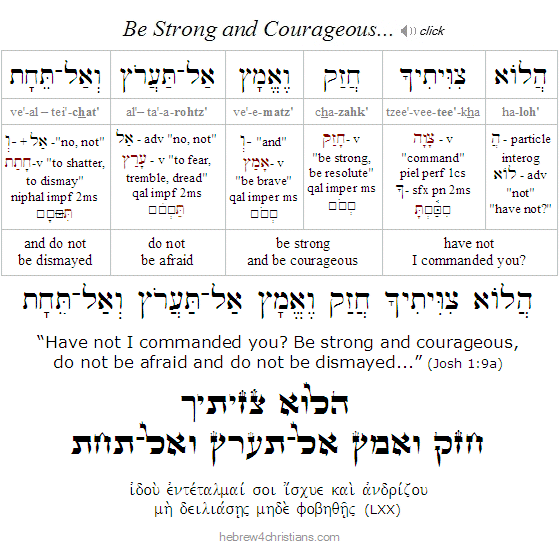 |
We do not need to live in fear, because melo khol ha'aretz kevodo: מְלא כָל־הָאָרֶץ כְּבוֹדו, "the whole earth is filled with His glory (Isa. 6:3). "In God have I put my trust: I will not be afraid what man can do unto me" (Psalm 56:1). Passover is all about the victory of God over the powers of darkness for the sake of our deliverance (i.e., yeshuah: יְשׁוּעָה). The echo of Moses' cry, "Let my people go!" is still resounding in the heavenly realms. So be encouraged, chaverim, even in the face of evil. Do not be afraid and do not be dismayed, "for the LORD your God is with you wherever you go." Amen!
Expelling the Darkness...

[ "For our struggle is against spiritual forces of evil..." Eph. 6:12 ]
04.12.22 (Nisan 11, 5782) Human life is a battleground of forces, and each person is engaged in a spiritual war for the healing of their soul... Often we are not willing to enter the battle until we have been sufficiently wounded by own own sins: many of us have to become "sick of being sick" until we are ready to seriously engage the underlying issues.
The battle is not optional. We must learn to deal with our own inner struggle against evil. Before we can help others to be free, however, we must be free ourselves, and that means learning how to expel the darkness hidden within our own hearts and to walk in God's light. Deliverance means being set free from that which "possesses" us, and that includes the demonic strongholds of fear, anger, envy, lust, and so on. Overmastering impulses can lead the soul to dark thoughts, self-alienation, shame -- a tenuous existence of subjugation and pain. The way of deliverance is to "name the demon," that is, to challenge the ground it claims and to exercise divine authority over our hearts. Above all this means being honest about our struggle and taking a decisive stand against our own oppression... Fighting the "good fight of faith" means caring enough to be healed...
We can only face the demonic if we are willing to be honest with ourselves, for without genuine honesty we cannot see our condition. "A little leaven leavens the whole lump" (Gal. 5:9). We must be willing to confess that there is much within us that remains unhealed, and that we are often unmindful of what really motivates our behavior. Even those things we might suppose as good - our religion or our self-control, for example - can possess us in ways that bring harm to ourselves and others....
When Yeshua expelled the demonic, the afflicted soul was given inner peace and put into their "right mind" (Mark 5:15). In other words, deliverance from madness is linked to God's healing influence in our lives: "For God has not given us a spirit of fear, but of power, and of love, and of a sound (safe) mind" (2 Tim. 1:7). Note that the word translated "safe" comes from the verb sodzo (σῴζω), meaning to be healed from destructive inner conflict. A delivered person has "inner balance" and is not easily overthrown by his conscious (or unconscious) passions. Such a person is grounded in reality: he knows who he is, what he needs, and is realistic about what he can and can't do. His soul is not divided but rather unified, centered, and focused. He is consciously present and accepts life without resistance.
Yeshua gives us "authority" over the demonic to heal (Luke 9:1). The Greek word authority, eksousia (ἐξουσία), is a compound formed from the preposition ek- (ἐκ), meaning "out of," and the noun ousia (ουσία), meaning "being" or substance, thereby suggesting power over physical and spiritual reality. Another way to understand the word, however, is to see it as the ability to see beyond the realm of the transient to abide within the realm of the Eternal. The Father represents the unseen, the infinite, the supreme providential and transcendental aspects of the One true God, just as the Son represents the seen, the finite, the suffering and immanent aspects of God... They are One (similarly the Holy Spirit is the Spirit of God, and therefore is One with God). Yeshua was entirely submitted to the will of the Father, which means he was able to let go and trust in the all-encompassing Divine Presence. His life was grounded in his relationship with the Eternal: "He that has seen me has seen the Father" (John 14:9). Since Yeshua lived in complete unity or "oneness" with God, he was completely centered and fully conscious of his identity as God's Son. His authority came from being preoperly aligned or related to God the Father, that is, ultimate reality, which enabled him to be a vessel or conduit for the expression of God in the world.
The Scriptures state: "Yield yourselves to God; take a stand against the devil and he will flee from you" (James 4:7). We first ground ourselves in what is real - surrendering and accepting the given moment - and then we decisively refuse to be taken captive by our imagination, fear, lust, etc. When we turn to the light the darkness will be expelled (John 1:5). Let's choose life and therefore live (Deut. 30:19); let's take our stand against the powers of hell; let's repudiate our fears and "spiritually slay" whatever seeks to drive and control us. May our hearts grow quiet before the Divine Presence and abide in peace...
Hebrew Lesson
Isa. 26:3 reading (click):
Trusting and Knowing...
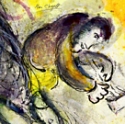
04.12.22 (Nisan 11, 5782) The receiving of the Torah (קבלת תורה) must take place each and every day, as it says, "Trust in the LORD 'bekhol libekha' (בְּכָל־לִבֶּךָ) - with all your heart; and know Him 'bekol derakhekha' (בְּכָל־דְּרָכֶיךָ), in all your ways" (Prov. 3:5-6). The revelation of Torah is described as a "loud and never-ending voice" (Deut. 5:22), though it is our constant responsibility to "shema" – to take heed and receive the invitation of God's heart.
It is written in our Scriptures: "Trust in the LORD with all your heart, and do not rely on your own understanding" (Prov. 3:5). The Hebrew word for trust is "bittachon" (בִּטָחוֹן), from a root word (בָּטָח) that means "to lean upon," to feel safe and secure (Psalm 31:19). Bittachon expresses the emotional conviction that you are welcome and accepted before God, and that you have access to his heart (Heb. 4:16; 1 Pet. 5:7). We trust with "all of our heart" when we let go of our need to control (or understand) things and instead rely on God's ability to take care of us. Trusting God means knowing "in your kishkas," that is, in your guts, that God is taking care of you (Rom. 8:28); it is the comfort of being made safe in his love...
"In all your ways know Him, and he will direct your paths" (Prov. 3:6), and that means you are to know God in whatever "way" you happen to find yourself in, which includes ways of joy and happiness, but also ways of struggle, ways of sinfulness, and ways of heartache... In all these ways we are to know him.... And just as we are to trust God with all of our heart and abandon ourselves to his care, so we are "know God" in all our goings, opening our heart to his loving presence and trusting in his guidance for our lives. The Good Shepherd will lead us down the right paths for the sake of his beautiful name (Psalm 23:3). Amen.
Hebrew Lesson
Proverbs 3:5-6 reading (click):
What We Really Need...

04.12.22 (Nisan 11, 5782) "Your heavenly Father knows what you need before you ask him" (Matt. 6:8). We sometimes pray for what we think we need but overlook what we really need. For instance, we may pray for health, material blessing, and opportunity, but what we really need is the ability to trust, the willingness to surrender our lives to God without qualification, and the grace to see the good in others and not their faults. These needs are just as real as our need for food and clothing, since apart from grace to extend empathy and love toward others, we will never be truly happy. Love "overlooks" a multitude of sins; it looks beyond the present moment to see with compassion, kindness, and empathy... What we really need, then, is to be after God's own heart, to see other people as God sees them, and to overlook matters that offend or feed our sense of pride. This is what we truly need, and therefore we trust that the Lord our God mercifully "decodes" our apparent petitions to express what the Spirit of God groans and sighs on our behalf (Rom. 8:26).
Hebrew Lesson
Psalm 109:22 reading (click):
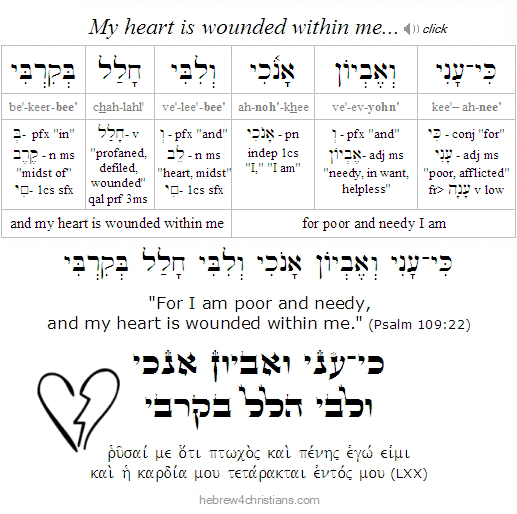 |
Note that the word translated as "wounded" is challal (חָלַל), meaning "stricken, polluted, defiled, pierced, or broken." This is the condition of heart that is prerequisite for doing real business with heaven. "God has not been trying an experiment on my faith or love in order to find out their quality. He knew it already. It was I who didn't. In this trial He makes us occupy the dock, the witness box, and the bench all at once. He always knew that my temple was a house of cards. His only way of making me realize the fact was to knock it down.... I need Christ, not something that resembles Him." (C.S. Lewis: A Grief Observed)
Overcoming Worldly Fear...
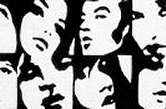
[ "Come, my people (לֵך עמי בּא) enter thou into thy chambers, and shut thy doors about thee: hide thyself as it were for a little moment, until the indignation be overpast" (Isa. 26:20). ]
04.11.22 (Nisan 10, 5782) Though we cannot control what happens in this world, we can trust that God is working all things together for good, even during times of testing, even in things that are blatantly evil, and even in the midst of mass deception by the "rulers of the darkness of this world" (Eph. 6:12; Rom. 8:28; Gen. 50:20, Jer. 29:11). And while we instinctively recoil at the prospect of physical death, there are decidedly things worse than death itself, namely, losing hope in life, walking in the darkness of despair, living a joyless existence because of fear, and ultimately facing God as a shameful coward who shrank back from the truth. As much as we abhor evil - and we must resist it with all our hearts - even more must we love the good - and cling to God (וּלְדָבְקָה־בוֹ) with all that is within us.
Ultimately, the most important thing to remember regarding death is the truth about God's salvation (יְשׁוּעָה). After all, God assuredly hates death and provides each of us with its eternal remedy: By clothing himself in human flesh, Yeshua embraced mortality itself and willingly bore the penalty for your sins, exchanging his life for yours, thereby destroying the one who had the power of death, namely the devil, and by so doing, set you free from slavery to the dread of death (Heb. 2:14-15). To those who belong to belong to Messiah, death represents a passage to eternal life and the loving presence of God Himself.
Only the miracle of faith can see hope in the face of radical evil... and yet that is the very message of the cross of the Messiah... Our Lord demonstrated that He is the the Killer of death itself; the Slayer of the Serpent; and the ultimate Triumph of God's Light over the realm of despair and everlasting darkness... He is the First and the Last, the Living One who died, and behold is alive forevermore, the true Keyholder of Death and Hell (Rev. 1:18).
Hebrew Lesson
Psalm 27:5a reading (click):
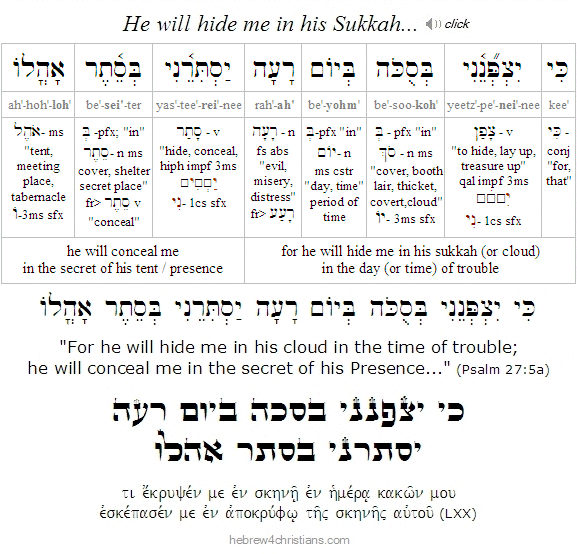 |
Love Believes all things...

04.11.22 (Nisan 10, 5782) "I would have fainted unless I believed to see the goodness of the LORD..." (Psalm 27:13). Faith is therefore self-authenticating: as you trust in the good, the good will be revealed: believe to see! As Yeshua said, "According to your faith be it done unto you" (Matt. 9:29). And if it is faith that makes you whole, then its lack makes you sick... As you doubt, so you will lose sight of what is real, true, and abiding. Being cynical is cowardly: "There are two ways to be fooled. One is to believe what isn't true; the other is to refuse to believe what is true" (Kierkegaard). The cynic refuses the possibility of truth because he is afraid of being fooled, and for this fear he willingly closes his eyes to the good. "Believe that life is worth living, and your belief will help create the fact" (James). When we trust God's promises, we affirm an unseen good even if the present hour is shrouded in darkness. Faith sees beyond "the seen" to the unseen (2 Cor. 4:18). The "seen" is not ultimately real, and consequently faith is exiled from the vanity of the present hour (עולם השקר). Therefore affirm your faith, dear friend; do not allow your heart to waver. Refuse the darkness of fear by choosing to believe in the reality of God's love for your soul, despite the mess you've made of your life. Affirm that God's love is more real, more substantive, and more valuable than anything disclosed in this world that fades away. Amen.
Hebrew Lesson
Psalm 27:3 reading (click):
The Passover Lamb...

[ We celebrate Passover while still in the darkness to better see the radiance of his salvation! ]
04.11.22 (Nisan 10, 5782) Some of the sages say that the Passover was meant to be a prelude to the revelation given at Sinai, though it really had to do with the deliverance (i.e., yeshuah: יְשׁוּעָה) of those who had faith in God's remedy given through the blood of the lamb. The Passover anticipates God's victory over the powers of darkness -- recall that the final plague was delivered at midnight -- and the people then left Egypt for the promised land the following day -- a vivid testimony of God's power of redemption (Exod. 12:29; Exod. 12:41). We observe the Passover seder in the evening before the Exodus event because we share in the experience of salvation - trusting in God's deliverance from death by the agency of the sacrificial lamb - before we celebrate our freedom. Likewise we first go to the cross of Messiah, the Great "Lamb of God" - receiving God's provision for our healing and deliverance - before we begin our journey into the promise of newness of life (1 Cor. 5:7).
Observing Passover is an act of faith. While still within the darkness of bondage in Egypt, the Israelites had to believe in the freedom God promised to them. By taking hold of the lamb on the 10th of Nisan, waiting four days and then slaughtering the lamb, placing its blood upon their doorway, and later eating its flesh, the people expressed faith in God's deliverance by means of his compassionate gift of vicarious atonement (Exod. 12:3-12). Again, celebrating Passover expresses faith that we are set free from the powers of darkness and oppression, even during the struggle against the darkness. The victory of Passover is a divinely given freedom, a rebirth produced by the Spirit of God (2 Cor. 5:17).
Hebrew Lesson
Hab. 2:4 reading (click):
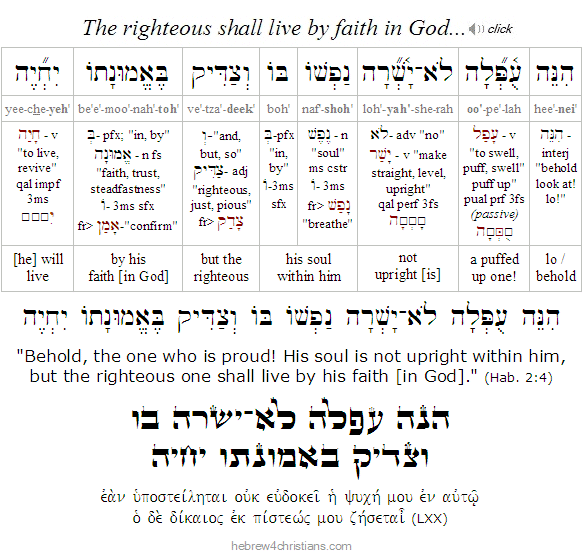 |
Taking Passover Personally...

[ The eight-day holiday of Passover begins Friday evening at sundown... ]
04.11.22 (Nisan 10, 5782) The message of Passover applies to each of us: "In each and every generation an individual should look upon him or herself as if he or she (personally) had left Egypt." Indeed the very First Commandment is to accept the reality of your personal deliverance by the LORD: "I am the LORD your God, who brought you (singular) out of the land of Egypt, out of the house of slavery" (Exod. 20:2).
Note that the Hebrew word "Egypt" is mitzraim (מצרים), a word that means "prison, enclosure, or straights," from the verb tzur (צוּר) meaning "to bind or confine" (the Yiddish word tsuris, "trouble," comes from the same root). On the other hand, the Hebrew word for salvation is yeshuah (ישועה), from a root that means to "make wide," to "release from constraint," to deliver or set free.
It is noteworthy that God began the Ten Commandments by identifying Himself as our Redeemer and Deliverer rather than as our Creator, because the very purpose of creation is to be set free by means of God's redemptive love given through Yeshua, the "Lamb slain from the foundation of the world" (Rev. 13:8; 1 Pet. 1:18-20; Eph. 1:4; 2 Tim. 1:9). Amen. The book of Genesis is the context to the story of the Exodus. Happy Passover, friends...
Hebrew Lesson
Exodus 20:2 reading (click):
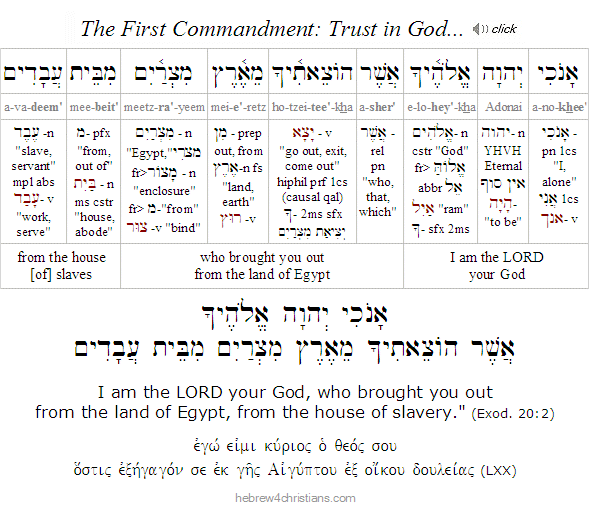 |
Testing and Endurance...
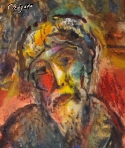
04.11.22 (Nisan 10, 5782) When Paul wrote, "in everything give thanks" (1 Thess. 5:18), he surely foresaw the prospect of suffering. Indeed, it is through "much tribulation" we enter the kingdom of God (Acts 14:22). We do not ask God to insulate us from all troubles, but rather to be given courage to carry on despite whatever tests he permits in our lives. Hence one of our standard blessings is: בָּרוּךְ אַתָּה יהוה הַנּוֹתֵּן לַיָּעֵף כּחַ / barukh attah Adonai ha'noten lai'ya'ef koach: "Blessed are You, LORD, who gives strength to the weak." The Lord never "breaks" before offering His blessing (Mark 6:41), and personal brokenness is the means of instilling His character within us (Gal. 2:20). Indeed in the Torah we read: "I am the LORD your Healer" (אֲנִי יְהוָה רפְאֶךָ; Exod. 15:26). The sages comment that just as someone who wishes to repair an object will need to take it apart, so it is with God. When we seem to be broken in pieces we cry out for deliverance and healing, but inwardly we are being conformed to the deeper image of Messiah. Like Jacob, we wrestle with God to know our wound as well as our healing.
As it is written in our Scriptures: "So we do not lose heart. Though our outer self is wasting away (διαφθείρεται), our inner self is being renewed day by day. For this light momentary affliction (θλῖψις) is preparing for us an eternal weight of glory beyond all comparison, as we look not to the things that are seen but to the things that are unseen. For the things that are seen are transient, but the things that are unseen are eternal" (2 Cor. 4:16-19). As our Scriptures also affirm, God is "the Father of Mercies and God of all comfort" (אַב הָרַחֲמִים וֵאלהֵי כָּל־נֶחָמָה). The Lord "comforts us" (literally, "calls us to His side," παρακαλέω) in our afflictions so that we may be able to comfort those who are afflicted with the same comfort with which we ourselves are comforted by God (2 Cor. 1:3-4). Amen.
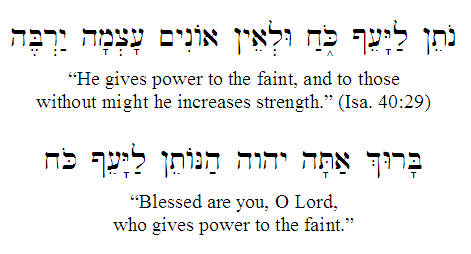 |
Hebrew Lesson
Psalm 34:19 Hebrew reading:
Kaddish and Providence...
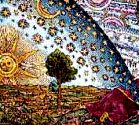
04.10.22 (Nisan 9, 5782) Since our faith affirms that "all things work together for good" (Rom. 8:28), we bless God for perceived evil as well as for perceived good, since all circumstances of life come from the hand of the LORD our God (Job 2:10). Despite appearances that sometimes seem to the contrary, we believe that the all-powerful, supreme LORD has not abandoned the world but actively sustains and upholds it with benevolent intent (Heb. 1:3). "We walk by faith and not by sight" (2 Cor. 5:7). When bad things happen to the righteous, we trust in God's personal care for their ultimate good, despite their present troubles. As the prophet Job said: "Though he slay me, I will trust in Him" (Job 13:15). This is the heart behind the Kaddish, the mourner's prayer, that expresses acceptance of God's world, despite the pain, sorrow, loss, and so on.
The term hashgachah pratit (השׁגחה פרטית) refers to God's personal supervision of our lives (hashgachah means "supervision," and pratit means "individual" or "particular"). Since He is the Master of the Universe, God's supervision reaches to the smallest of details of creation - from subatomic particles to the great motions of the cosmos. God not only calls each star by its own name (Psalm 147:4), but knows each particular lily and sparrow (Matt. 6:28-30, 10:29). Each person created in the likeness of God is therefore under the direct, personal supervision of God Himself -- whether that soul is conscious of that fact or not. As Yeshua said, even the hairs on your head are all numbered (Matt. 10:30). Indeed, the God of Israel is called אלהי הרוּחת לכל־בּשׂר / Elohei ha-ruchot lekhol-basar: "The God of the spirits of all flesh" (Num. 16:22), and that means He is LORD even over those who vainly attempt to suppress His Presence and reality. "Can a man hide himself in secret places so that I cannot see him? declares the LORD. Do I not fill heaven and earth?" (Jer. 23:24).
The Talmud says that when Moses asked God, "Please show me your glory" (Exod. 33:18), he was asking for God's vindication in the light of the gnawing question: "Why do the righteous suffer while the wicked prosper?" Moses was not given an explicit answer, and some of the sages said he wrote the enigmatic Book of Job to demonstrate that the question can only be reduced to God's inscrutable will: "Where were you when I laid the earth's foundation?" (Job 38:4). In other words, the question can only be answered by the One who knows the beginning from the end, the Infinite One who sees the implications and concatenation of all things. As finite beings, we see only a fraction of the big picture, and therefore we must yield our trust to the Wisdom and Power of Almighty God (Deut. 32:4).
It is written, "Your eyes saw me when I was inside the womb; in your scroll everything was written, my days were ordained before they came into existence" (Psalm 139:16). In light of God's providential ordering of our lives, Blaise Pascal asked, "What is left for us but to unite our will to that of God himself, to will in him, with him, and for him the thing that he has eternally willed in us and for us." The Mishnah says it this way: "Do His will as if it was your will that He may do your will as if it was His will" (Avot 2:4). In other words, what else can we do but learn to trust, accept, and to say "yes" to life -- even if at times we may feel like orphans, lost in a fatherless world... All our days are recorded in God's scroll.
Hebrew Lesson
Psalm 136:16b reading (click):
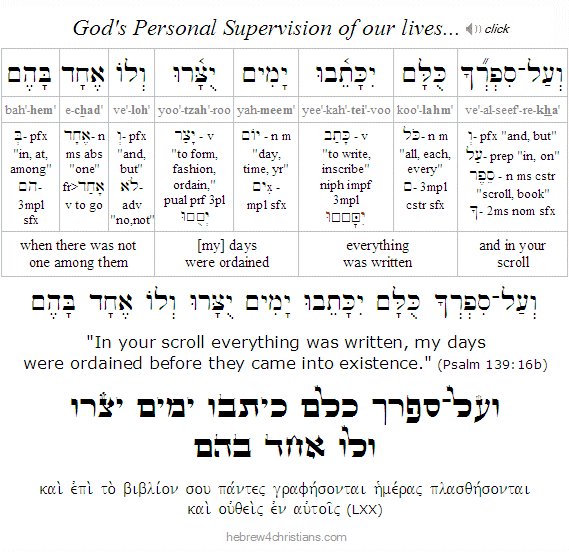 |
There is a dark temptation to refuse to accept God's sovereign will, which includes objecting to his "tolerance" of evil (for a season) until his greater plan for the redemption is fully manifest... We need to be careful lest we become hardhearted, bitter, and despair over the purpose for life - like Ivan in The Brother's Karamazov (Dostoevsky) who, though he intellectually gave assent to God's overarching plan, refused to accept it because of the unspeakable cruelty and senseless suffering he saw in the world. His disillusionment moved him to say to his sincerely devout brother: "It's not God that I don't accept, Alyosha, only I most respectfully return him the ticket." How tragic that the heart can turn away from God because the present moment seems incomprehensible and broken.... How many people have so despaired when, if they had but held on for awhile longer, they may have received solace and comfort... For me it helps to remain humble, to confess my ignorance of much, and to "remember the future" wherein glory and beauty will be soon be revealed (Psalm 31:19).
Hebrew Lesson:
Psalm 31:19 reading (click):
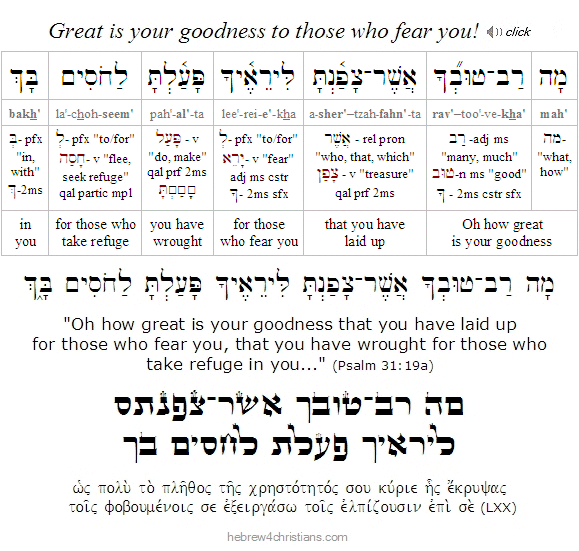 |
Living without Fear...

04.10.22 (Nisan 9, 5782) The Spirit speaks to the heart of faith: "Fear not, for I have redeemed you; I have called you by name, and you are mine" (Isa. 43:1). God has personally redeemed you, friend; he calls you by name, and you belong to Him. The Lord loves you with an everlasting love and draws you close (Jer. 31:3). He has promised never to leave nor forsake you, even if you might face waters that seem to overwhelm or fires that seem to devour (Isa. 43:2). The will of your Heavenly Father will never lead you to a place where his love will not there sustain you. He is Present for you...
Worry is a place of exile and pain. We are commanded, al tira (אל־תירא) "fear not," because fear was behind the original sin in the garden, just as mistrust lies behind our own hiding and self-imposed exile from God... Since sin expresses a heart of fear (Rom. 14:23), the way of healing is to courageously turn back to God, despite our uncertainties. We can trust God's love for us because of the cross of Yeshua our Lord. If we haven't received God's love and acceptance, we are still enslaved to fear and abide in a state of exile. The love of God casts out our fear because it casts out all our sins (1 John 4:18).
It is written, "God has not given us the spirit of fear, but of power and of love, and of a "sound mind" (2 Tim. 1:7). The Greek word for "sound mind" means "safe" because of the restraining influence of the Spirit of God... If you sense fearful oppression within your heart, turn to the Lord and offer him focused praise. Lift up your soul to him and thank him for your trouble. This has the double benefit of confessing your trust in God's care, as well as vexing the enemy of your soul. Come boldly to the throne of grace to find your help (Heb. 4:16); cast all your anxiety on him, for he cares for you (1 Pet. 5:7).
The Name of the LORD (יהוה) means "Presence" and "Love" (Exod. 3:14; 34:6-7). Yeshua said, "I go to prepare a place for you," which means that his presence and love are waiting for you in whatever lies ahead (John 14:1-3; Rom. 8:35-39). To worry is to "practice the absence" of God instead of to practice His Presence... Trust the word of the Holy Spirit: "For I know the plans I have for you, declares the LORD, plans for healing peace and not for evil, to give you a future and a hope (Jer. 29:11).
Take comfort that your Heavenly Father sees when the sparrow falls; he arrays the flower in its hidden valley; and he calls each star by name. More importantly, the Lord sees you and understands your struggle with fear... Come to him with your needy heart and trust him to deliver you from the burdens of your soul (Matt. 11:28).
Hebrew Lesson
Isa. 43:1b reading (click):
The Meaning of Freedom...
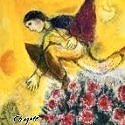
04.08.22 (Nisan 7, 5782) Passover is sometimes called zeman cheruteinu (זְמָן חֵרוּתֵנוּ), the "Season of our Freedom," though it's important to understand what that means. Some people think that "freedom" means "licentiousness," or the ability to do what they want to do whenever they want to do it. However, simply doing whatever you want to do is not the Torah's idea of freedom. Yeshua told us "whoever commits sin is the slave (δουλος) of sin," and went on to say "if the Son sets you free, you will be free indeed" (John 8:34-36). True freedom (i.e., cherut: חרוּת) is therefore moral and spiritual rather than merely physical. Real freedom has to do with the power to choose what is right and good, not to simply get your own way or to practice your lusts... Our deliverance is meant to clothe us with divine power to walk in righteousness and truth (Phil. 2:14-16).
True freedom is in agreement with the truth of God's law. Where it is written, "The tablets (of the Ten Commandments) were the work of God, and the writing was the writing of God, engraved (חרות) on the tablets" (Exod. 32:16), the midrash says do not read the word as "engraved (i.e., charut: חָרוּת) on the tablets" but rather as "freedom (i.e., cherut: חֵרוּת) on the tablets," since only those who obey God's will may rightly be called "free" people. Amen. "Blessed are they who observe justice, who do righteousness at all times" (Psalm 106:3).
Hebrew Lesson
Psalm 119:77 reading (click):
Anger and Strange gods...

04.08.22 (Nisan 7, 5782) Ours is a sick age, not because of the spread of viruses, but because of the spread of godlessness and the despair that results from spiritual darkness and deranged thinking. Ours is an angry age, and anger blinds the heart... Left unchecked, anger can destroy us and others. Angry words and actions leave their mark, wounding relationships and bringing about alienation and resentment. Dealing with our anger issues is not easy, of course, though it is essential for our healing. The sages say that unbridled anger is a symptom of idolatry - that is, elevating the self to "play god" by seeking to control things and to demand its own way. They note that the verse, "There shall not be within you a strange god (לא־יִהְיֶה בְךָ אֵל זָר), nor shall you bow to a foreign god" (Psalm 81:9) refers to the evil inclination within the heart which turns the self into a "foreign god," exalting the self "out of place" with reality. In that sense, anger is an expression of the demonic....
Anger entices the exalted ego to feel offended and to "make a case" against someone, finding them guilty of sin and worthy of contempt and retribution. We must be careful not to "legitimize" or excuse our spite by blaming others (or even God). Indeed the English word "blasphemy" comes from a Greek word (βλάσφημος) that means to speak evil, to revile, and to blame (μέμφομαι)... In other words, blaming others (including God) is a form of blasphemy. Raging about politics, insulting or slandering others, feeling aggrieved over your life, indulging in expressions of frustration because you don't get your way, walking in bitterness, sarcasm, or cynical indifference, scorning others or holding them in contempt -- all these are examples of blasphemy.
Yeshua said, "Judge not, and you will not be judged; condemn not, and you will not be condemned; forgive, and you will be forgiven" (Luke 6:37). This is the "like-for-like" reciprocity of forgiveness: your forgiveness of others is the measure of your own forgiveness; the judgment you pronounce will fall upon you; the measure you use will be measured to you.... As Meister Eckart once said, "the eye that I see is the eye God sees me..."
The way of humility extends sympathy and compassion to others, looking past their shortcomings and transgressions, relieving them of the demand to be faultless and perfect. The true self is the one given to us when we are connected to "I am the LORD your God" (Exod. 20:2), and indeed, this is the very first commandment of the Ten Commandments: anokhi Adonai Elohekha (אָנכִי יְהוָה אֱלהֶיךָ). We overcome the idolatry of our anger when we let go of our "need" to control everything in the world and then gratefully reconnect with who we really are, namely a child of God who by God's love, compassion, and grace is no longer made "strange" or "foreign" to the truth and blessing of life (Eph. 4:24; 1 Cor. 5:7).
To forgive means to let go -- to "give away" pain and hard feelings... Forgiveness releases the hurt, the anger, and the disappointment so that these emotions do not inwardly consume and exhaust our souls. And yet forgiveness must be self-directed, too, since refusing to forgive yourself denies or negates the forgiveness given from others. Forgiving yourself means admitting that you act just like other people, that you are human, and that you are in need of reconciliation too. Ultimately, forgiveness is both an act of self-acceptance and empathy -- we admit we are just like others, weak, flawed, in need of help, and so on. We can only forgive to the extent we recognize the truth about ourselves that we see in others. Yet we have to move on, past the shame, and to turn back to abiding hope. As a Yiddish proverb puts it, "You are what you are, not what you were..."
"Many sorrows shall be to the wicked, but he who trusts in the LORD shall be surrounded with favor." (Psalm 32:10)
"I hereby forgive all who have hurt me, all who have wronged me, whether deliberately or inadvertently, whether by word or by deed. May no one be punished on my account. And as I forgive and pardon those who have wronged me, may those whom I have harmed forgive me, whether I acted deliberately or inadvertently, whether by word or by deed." Amen. (The Gates of Repentance)
Charles Williams once wisely noted that "many promising reconciliations have broken down because, while both parties came prepared to forgive, neither came prepared to be forgiven." We have a quick eye to see how others offend us, but not how we might offend them. May the Lord help us be yashar, upright and honest with ourselves; may He give us the humility to admit we make mistakes, that we are in need of mercy, and may He set us free from the slavery of pride.
So how do we forgive the people who have hurt us deeply or offended us? How do we let go of our anger and rage? We need God's help, the gift of love that we can extend toward those who have sinned against us. "Love suffers long and is kind." By refusing to condemn others we will not need to forgive them. Our great need is to turn, at every moment, and to keep our focus on the Eternal and what is most real.
Ours is an angry and unreasoning age, full of spiritual darkness and demonic insanity. Let's earnestly pray to be given sound minds, delivered from fear and anger, and thereby enabled to walk in the peace of God's truth.... May our Lord have mercy and help us all... Amen.
Hebrew Lesson
Prov. 14:29 reading (click):
Always the First Step...
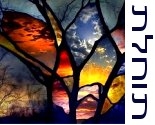
04.08.22 (Nisan 7, 5782) There is a core element of your spiritual life that is all-determinative, that affects everything else, and that is the decision of whether you will choose to "show up," whether you will engage it's hope; and whether you will open your eyes and yield yourself to the light... And this is an ongoing decision.
Therefore we read: "If you walk in my statutes (אִם־בְּחֻקּתַי תֵּלֵכוּ) and observe my commandments and do them..." (Lev. 26:3). The sages note that unlike the holy angels, we must "walk out" the faith of our days, and therefore we are always moving either forward or backward. In this world, God's sun shines on the just and unjust alike (Matt. 5:45). Every human being lives by faith of some kind, and it is therefore impossible to opt out of the decision to "choose this day whom we shall serve" (Josh. 24:15). Indifference or apathy is as much a spiritual decision as is outright rebellion, and if we do nothing today to draw us near to the Lord, we will eventually regress and slip backward.
This is all very sobering. "No one knows the day or hour," and that's why it is so vital to turn to God and be healed while there is still time. So turn today and bacharta ba'chayim (בָּחַרְתָּ בַּחַיִּים) - "choose life!" "For this commandment (of turning to God) is not hidden from you, and it is not far away... No, the matter is "very near you" (כִּי־קָרוֹב אֵלֶיךָ הַדָּבָר מְאד) - in your mouth and your heart - to do it" (Deut. 30:11-14; Rom. 10:8-13).
Hebrew Lesson
Deut. 30:19b reading (click):
Purification and Healing...

[ The following is related to our Torah reading for this week, parashat Tazria... ]
04.07.22 (Nisan 6, 5782) The cleansing of a metzora (i.e., "leper") corresponded with other significant sacrificial rituals given in the Torah. The sprinkling of the hyssop by the priest recalled the blood of Passover; the offering made of the two birds - one which was sacrificed and the other set free - recalled the scapegoat of the Yom Kippur ritual. The washing of garments, the shaving of all hair, and the immersion in a mikveh (a pool of fresh water) recalled the birth of the Jewish people at the Sea of Reeds. Finally, the blood of the guilt offering sprinkled on the earlobe, thumb and foot, recalled the dedication of Aaron and his sons as the priests of Israel (Lev. 14:14). In other words, the individual purification process mirrored the purification of the community of Israel, and healing ultimately meant being re-identified as a redeemed child of God. In a very literal sense, then, we see how the metzora was "reborn" by water and by the blood (John 3:5; 19:34; Heb. 9:19).
Of the Messiah it is written: "He is despised and rejected of men, a man of pains (אִישׁ מַכְאבוֹת) and acquainted with sickness (וִידוּעַ חלִי), and we hid as it were our faces from him. He was despised and we esteemed him not. Surely he has carried our sicknesses (חֳלָיֵנוּ) and borne our pains (מַכְאבֵינוּ), yet we esteemed him as plagued (נָגַע), smitten of God (מֻכֵּה אֱלהִים) and oppressed. But he was pierced (מְחלָל) for our transgressions (פְּשָׁעֵנוּ), he was crushed for our iniquities (עֲוֹנתֵינוּ): the discipline for our peace was upon him (מוּסַר שְׁלוֹמֵנוּ עָלָיו); and in his blows we are healed. All we like sheep have gone astray; we have turned every one to his own way, but the LORD has attacked in him (הִפְגִּיעַ בּוֹ) the iniquity of us all" (Isa. 53:3-6). Through the substitutionary sacrifice of the righteous Suffering Servant, Yeshua, we are both forgiven and made free from the power of sin and death. Because of Him we are no longer "lepers" or outcasts from the community of God but are made clean through His loving touch.
Notice that the word translated "blow" (i.e., חַבּוּרָה, "wound" or "stripe") comes from the same root as the word "friend" (חָבֵר), and therefore we can read this as "in His friendship we are healed." Yeshua gave up His life for us so that we could become his friends... As He later told us regarding his sacrifice: "Greater love has no one than this, that one lay down his life for his friends" (John 15:13). Indeed of Yeshua it may truly be said, Yesh ohev davek me'ach – "there is a friend who sticks (davek) closer than a brother" (Prov. 18:24).
Hebrew Lesson
Psalm 51:7 reading (click):
Note: For more on this subject, see the article: "Thoughts on Holiness."
The Month of Deliverance...
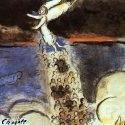
04.07.22 (Nisan 6, 5782) Passover is all about the victory of God over the powers of darkness for the sake of our deliverance (יְשׁוּעָה). Shelach et ammi: "Let my people go!" Indeed, the month of Nisan is called Chodesh ha-yeshuah (חדֶשׁ הַיְשׁוּעָה), the "month of the salvation," both in terms of remembering the physical deliverance from the political powers of Egypt, but more profoundly in terms of our spiritual deliverance given at Zion/Moriah through the Messiah. Chodesh ha-yeshuah can also be read as chadash ha-yeshuah, "the new (חָדָשׁ) salvation," suggesting the new covenant power we are given in the Messiah. We wrestle not against flesh and blood, chaverim, but against hidden powers of darkness that seek to enslave us as Pharaoh did of old (Eph. 6:12). But thanks be to God who gives us the victory (netzach, salvation) through our Lord Yeshua the Messiah (1 Cor. 15:57).
Hebrew Lesson
1 Chron. 29:11 reading (click):
 |
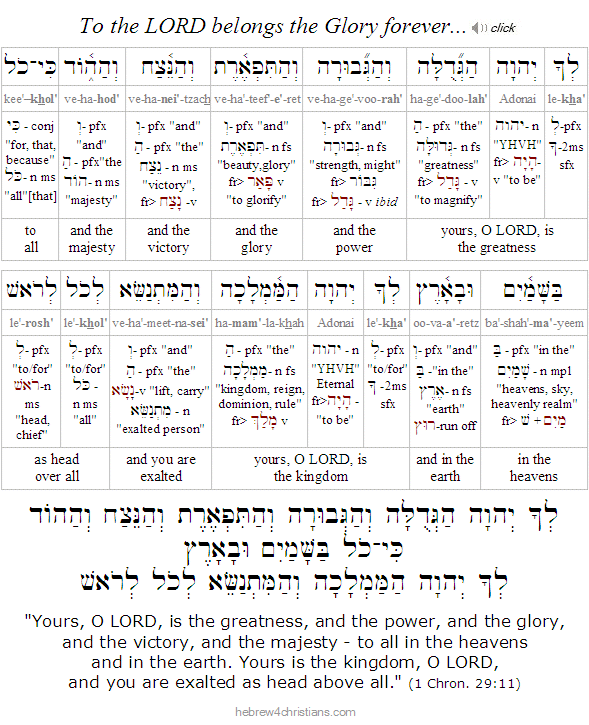 |
So Passover is a month-long celebration. Over and over it is referred to as the "month of spring" (חדֶשׁ הָאָבִיב), the "month of redemption," the month of Nisan, and so on. The word Nisan (נִיסָן) itself might come from either the word nitzan (נִצָּן), meaning "bud" (Song 2:12), or the word nissim (נִסִּים) meaning "miracles," both of which suggest physical and spiritual resurrection in our lives. Others think the word comes from the verb nus (נוּס), meaning "to flee," both in relation to Israel's flight from Egypt and Egypt's flight from Israel (i.e., when the pursuing Egyptian cavalry fled (נָסִים) before the sea closed upon them (Exod. 14:25, 27). We also see this usage in the verse: "The wicked flee (נָסוּ) when no one pursues, but the righteous are bold as a lion" (Prov. 28:1). The devil's power is found in the lie. If he can make you afraid, you will not think clearly. Establishing your faith in the truth will embolden you to deal with the lies and distortions that are intended to enslave you in fear. As Yeshua said, the truth will set you free (John 8:32).
Yeshua is called the "Lion of the tribe of Judah" (הָאַרְיֵה מִשֵּׁבֶט יְהוּדָה) and the "Root of David" (שׁרֶשׁ דָּוִד). Notice that the name Judah (יְהוּדָה) includes the Name YHVH (יהוה) with the insertion of the letter Dalet (ד), suggesting that this shevet (tribe) would be the "door" or "gate" into the presence of God. Yeshua the Messiah was from the tribe of Judah who described Himself as ha-sha'ar (הַשַּׁעַר) "the gate" (John 10:9). Putting our faith in Yeshua gives us bold access to the throne of God's grace so that we can find help (deliverance) in time of our need (Heb. 4:16).
In light of the conditions of this evil world, we cry out for Yeshua to return now! We want His deliverance, just as He delivered the Jews from ancient Egypt with great signs and wonders. Most politicians, by definition, exhibit the Pharaoh-like lust to control and exploit people. They are called "the lords of the darkness of this world" / τοὺς κοσμοκράτορας τοῦ σκότους τούτου (Eph. 6:12). This is the nature of the corruption of those who crave power over others... Today, so many people live in fear because they believe the propaganda of the "princes of this age." We must always keep in mind that reality centers on the LORD God of Israel, not in appearances and the rhetoric of political or media figures. Melo khol ha'aretz kevodo: מְלא כָל־הָאָרֶץ כְּבוֹדו, "the whole earth is filled with His glory (Isa. 6:3). And the LORD God of Israel cares about people's liberation from deception and tyranny. The story of the Exodus is His everlasting rebuke to all the world's dictators and should cause every politician to soberly assess their fate... The time is coming when His judgment will fall upon the "kings of the earth who take counsel against the LORD and against His Anointed (Psalm 2:2).
 |
Established in God's Way...

04.07.22 (Nisan 6, 5782) When you become alive to the truth that the LORD is your Rock, the very ground upon which you live, move, and have your being, then your steps are made sure, as it says, "The steps of a man are established by the LORD, when he delights in his way; though he fall, he shall not be cast down: for the LORD holds his hand" (Psalm 37:23-24). When you are unsure of your way, when you walk in uncertainty, you are unsteady in your resolve and are tempted to regard your life as being without any solid foundation. As you commit your way to the LORD, your steps are made sure, for you are walking before his Presence, and therefore you are upheld by his power.
In all your struggle remember that salvation is found in the power and righteousness of God, and not your own will or resolve (Rom. 1:16). I'm so glad it's not the strength of my grip that keeps me holding on to God, but the strength of his...
Hebrew Lesson:
Psalm 37:23-24 reading (click):
The Torah of Passover...
[ The holiday of Passover (i.e., Pesach) begins Friday, April 15th at sundown this year... ]
04.06.22 (Nisan 5, 5782) All of the Biblical holidays (חגי תורה) begin with the primordial holiday of Passover (חג הפסח). On the first of Nisan, two weeks before the Exodus, God showed Moses the new moon and commenced the divine calendar. Two weeks later, the Israelites kept the Passover by daubing the blood of the lamb on their doorposts. At the stroke of midnight of Nisan 15 God sent the last of the ten plagues on the Egyptians, killing all their firstborn. On the 6th of Sivan, exactly seven weeks after the Exodus (49 days), Moses first ascended Sinai to receive the Torah (Shavuot). Forty days later, on the 17th of Tammuz, the tablets were broken. Moses then interceded for Israel for another forty days until he was called back up to Sinai on Elul 1 and received the revelation of the Name (YHVH). After this, he was given the second tablets and returned to the camp on Tishri 10, which later was called Yom Kippur, or the "Day of Atonement." Later the holiday of Sukkot ("Tabernacles") was instituted to commemorate God's care for the people as they trekked through the desert en route to the promised land.
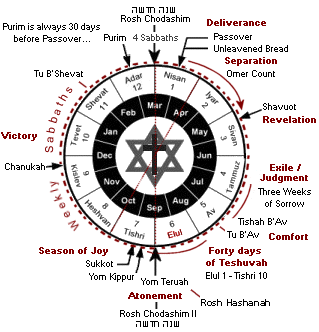 |
The story of the Exodus from Egypt (סיפור יציאת מצרים) is perhaps the most fundamental event of Jewish history. In addition to being commemorated every year during Passover (Exod. 12:24-27; Num. 9:2-3; Deut. 16:1), it is explicitly mentioned in the very first of the Ten Commandments (Exod. 20:2), and it is recalled every Sabbath day (Deut. 5:12-15). The festivals of Shavuot ("Pentecost") and Sukkot ("Tabernacles") derive from it (the former recalling the giving of the Torah at Sinai and the latter recalling God's care as the Exodus generation journeyed from Egypt to the Promised Land). Indeed, nearly every commandment of the Torah (including the laws of the Mishkan (i.e., "Tabernacle") and the sacrificial system) may be traced back to the story of the Exodus. Most importantly, the Exodus prefigures and exemplifies the work of redemption given through the sacrificial life of Yeshua the Messiah, the true King of the Jews and the great Lamb of God (שׂה האלהים).
Notice something very important, friends. The very first occurrence of the word "Torah" (תורה) in the Scriptures refers to the obedient faith of Abraham (Gen. 26:5), and the second occurrence refers to the law of Passover: "There shall be one law (תורה אחת) for the native and for the stranger who sojourns among you" (Exod. 12:49). There is a link between these two occurrences. Abraham lived before the time of the Exodus, of course, and therefore he obeyed the law of Passover by means of the Akedah (the sacrifice of his "only begotten" son Isaac). Despite offering his son up upon the altar at Moriah, Abraham believed in the LORD and it was credited to him as tzedakah (righteousness). Abraham's obedience revealed that the inner meaning of Torah is that the "righteous shall live by faith" (Hab. 2:4, Rom. 1:17). The Torah of Passover (תורת הפסח) likewise teaches that redemption from death is possible through the exchange of an innocent sacrificial victim. The blood of the Passover was "a sign" of imputed righteousness that was obtained entirely by faith. This is the "korban" principle of "life-for-life" that underlies the Torah of the sacrificial system of the Tabernacle as well. Ultimately all true Torah points to Yeshua, who is the divinely appointed Redeemer and the beginning and goal of all of creation... "When the fullness of time (τὸ πλήρωμα τοῦ χρόνου) had come, God sent forth his Son, born of woman, born under the Torah, to redeem those who were under the Torah, so that we might receive adoption as sons" (Gal. 4:4-5).
Hebrew Lesson:
Numbers 9:2 Hebrew reading:
Related Topics for Passover:
An End to Our Darkness...
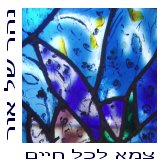
04.06.22 (Nisan 5, 5782) In our struggle against the darkness, there is good end coming -- an amazingly glorious end -- so don't let your heart grow numb. Never give up hope. The Spirit says: "Be silent before the LORD and wait patiently for him; do not burn with anger over the one who prospers in his way, over the man who carries out evil schemes. Abandon your anger and forsake your rage. Do not burn with anger: it tends only to distress. For the evildoers shall be cut off, but those who keep hope in the LORD shall inherit the land. In just a little while, the wicked will be no more; though you look carefully at his place, he will not be there" (Psalm 37:7-10). Amen, halevai, let it be so, O God...
וְעוֹד מְעַט וְאֵין רָשָׁע
וְהִתְבּוֹנַנְתָּ עַל־מְקוֹמוֹ וְאֵינֶנּוּ
ve·ohd · mei·aht · ve·ein · rah·sha
ve·heet·boh·nan'·ta · al-mei·koh·moh · ve·ei·ne'·noo

"In just a little while, the wicked will be no more;
though you look carefully at his place, he will not be there."
(Psalm 37:10)

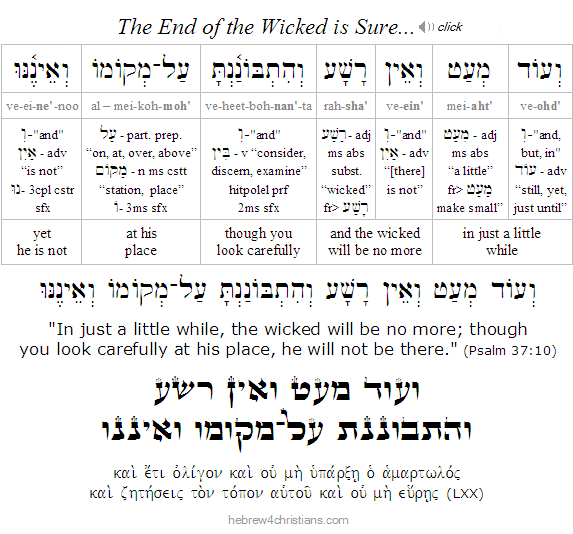
Just a little longer (עוֹד מְעַט) and there will be no more wicked one (אֵין רָשָׁע). Soon God will utterly vanquish wickedness, though in the present hour such hope might seem distant and far away. Stay strong in your desire for God's Name to be vindicated, for righteousness and love to shine as the noonday. Take hold of this vision through tevunah (understanding), and contemplate that there will be "no place" for the wicked one: wickedness itself will be driven away like dissipating smoke. Moreover, it is not only the wicked of this world, but our own inner wickedness that will find no place, for in the world to come we will be free from not only sin's influence but also sin's presence within our own hearts... Maranatha!
Hebrew Lesson
Psalm 37:11 reading (click):
Rest for your Soul...

04.06.22 (Nisan 5, 5782) Yeshua says, "Come to me, all who labor and are heavy laden, and I will give you rest. Take my yoke upon you, and learn from me, for I am gentle and lowly in heart, and you will find rest for your souls" (Matt. 11:28-29). When he said, "Live in me, and I will live in you" (John 15:4), he didn't insist you first be found worthy or good; no, he set no other condition than that of trust: "Now are you clean through the word which I speak" (John 15:3). The separation is gone; God has made the way past your shame. You are invited to come, so come just as you are, come without delay, but come trusting that you are entirely welcome because of who Yeshua is and what he has done for you...
O Lord, help us to be in that life you so freely give.... help us to come.
Hebrew Lesson
Isa. 30:15b reading (click):
Broken of Heart...

04.05.22 (Nisan 4, 5782) Brokenness is the means through which God performs some of His deepest work within our hearts. A.W. Tozer once said, "It is doubtful whether God can bless a man greatly until he has hurt him deeply." Likewise Alan Redpath once wrote, "When God wants to do an impossible task, He takes an impossible individual – and crushes him." These are seeingly scandalous words; they speak a severe mercy. "Blessed are they that mourn."
This seems to be the divine pattern. "Truly, truly, I say to you, unless a grain of wheat falls into the earth and dies, it remains alone; but if it dies, it bears much fruit" (John 12:24). The hard "outer shell" of the seed must be broken so that the life of the Spirit can come through... Plainly put, God (and only God) can "deconstruct" the self so that life's priorities, focus, and passions are redirected to Him alone, the true Source of life and blessing.
Hebrew Lesson
Psalm 34:18 reading (click):
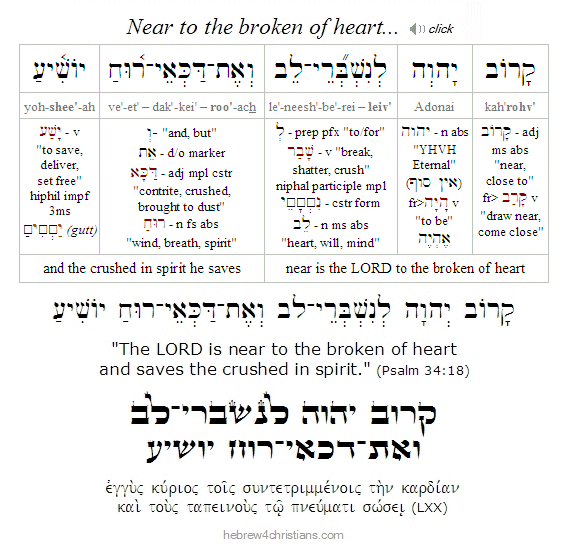 |
The Lord is near to the nishbar lev, the one with a broken heart. The Hebrew word "lev" (לב) metaphorically refers to our inner life, that is, our affections, mind, and will. This is revealed in the letters of the Hebrew word itself: the Lamed (ל) depicts a "staff" used to direct something (i.e., the will), and the Bet (בּ) depicts the "house" of the physical body. Lev then represents our inner life of thought and feeling expressed in our actions. Those who are broken in heart – the nishberei lev – have discovered that they cannot control their own lives, that they are inwardly "shattered," and therefore need divine help. Contrary to conventional wisdom, God helps those who cannot help themselves; He singularly prefers to use broken vessels in His service (Psalm 51:19). As Tozer also wrote, "Beware of any Christian leader who does not walk with a limp."
There is parallelism in this verse. Both lev (לֵב) and ruach (רוּחַ) denote man's will and thoughts (Josh. 2:11; Deut. 2:30). Both the "broken of heart" and the "crushed in spirit" – dakkei ruach – refer to those who need God's deliverance (i.e., יְשׁוּעָה, yeshuah). The word translated "saves" (yoshia) connotes the idea of "making room" from what distresses us. Salvation is freedom from what oppresses and constricts our inward life. In that sense, God saves us from ourselves – from the chaos of the carnal ego trying to run our own lives.
The LORD is "near" -- karov -- to the broken of heart. This adverb means "close enough to touch." The same root is used for the word korban (קָרְבָּן), a sacrificial offering that draws us near to God, as well as karov (קָרוֹב), a near kinsman. The Lord is near to the nishbar lev, the one with a broken heart; he understands the grief of living in a fallen world.
The point of our brokenness is to draw us to God for healing: "The LORD heals the broken in heart and binds up their wounds" (Psalm 147:3). Yeshua came to "bind up the broken of heart (nishberei lev), to proclaim liberty to the captives, and the opening of the prison to those who are bound" (Isa. 61:1). God is merciful and redemptive in His afflictions: "He shall not break even a bruised reed, nor snuff out even a smoldering wick. He shall bring forth the true way" (Isa. 42:3). Affliction is a means of teaching us what we really need....
Yeshua is the healer of the broken heart and the Savior of those who are crushed in spirit. Blessed be His Name forever...
Healing Afflictions...

04.05.22 (Nisan 4, 5782) GOD USES SUFFERING IN OUR LIVES to teach us the truth. After all, who among us would have genuinely turned to Him without its effect? The Lord repeatedly uses affliction to call us back to Him. It's His tool for prompting us to do teshuvah – repentance. Indeed, can there be any worse punishment in this life than to be untouched by need, suffering and testing? Can anything be more tragic than to be forgotten or overlooked by God? No, affliction is a blessing in disguise. As A.W Tozer once wrote, "It is doubtful whether God can bless a man greatly until He's hurt him deeply."
Of course affliction is just the starting point, the prerequisite for all that follows. It's the "price for admission" into God's school. And the very first lesson to be mastered is that 1) there is a God and 2) you are not Him. Should you forget the lesson, you will be revisited with affliction to help you begin again. In this way suffering is like a "guardian angel" or a personal tutor who keeps you focused on the truth. You simply cannot move forward in God's school apart from complete surrender.
When we genuinely accept that God defines the truth for our lives, we realize that affliction is sovereignly given to us so that we can learn abide in Him without constraint. As Soren Kierkegaard once wrote, "God's education consists in leading one to being able to do freely what at first one had to be compelled to do." "Law" is transformed to that of grace.
Life is a "school" for the soul. God is the Teacher, we are "disciples" (i.e., תַּלְמִידִים, "learners"), and affliction is our divinely appointed tutor. Many of us are slow to learn, but God is patient with those whom He disciplines. The goal is to never lose sight of what's most important, which is God Himself. If you find yourself in a place of resistance, then you are confronted with the decision of whether or not you will trust the Teacher. The key lies in surrendering to God's will by submitting to His rule over all things. Yielding to God's will is the path of serenity and inner peace (Isa. 26:3).
Hebrew Lesson
Psalm 119:71 reading (click):
Affliction is the humbling process by which God teaches us His decrees (i.e., chukkim: חֻקִּים), but it should be noted that such decrees are not always "rational." Indeed the very word chukkim refers to laws given that do not make "rational sense." The divine decrees supersede or transcend the claims of logic and reason, and indeed, human reason must submit to God's authority. We believe in order to understand -- not the other way around. Reason cannot "demand" an explanation from God, and should it refuse to submit, the mind will be at war with the heart, leading to further affliction. This disunity of the person leads to a state of inner contradiction and eventually to the disintegration of the soul. The way of healing in this case is to make a decision to submit to God's loving authority -- despite the antinomies presented by human rationality.
On the other hand, submitting to God's teaching leads to a life of collision with worldly culture. This leads to a constant state of paradox. Living by emunah (אֱמוּנָה, faith) is "already-not-yet," a constant mediation between time and eternity, of freedom and necessity, which, according to the "wisdom of this world," is regarded as absurd. Naturalism or humanism wants to abolish paradox through reductionism but the life of the spirit lives in a state of ongoing tension and paradox. Faith affirms that underlying the surface appearance of life is a deeper reality that is ultimately real and abiding. It "sees what is invisible" (2 Cor. 4:18) and understands (i.e., accepts) that the "present form of this world is passing away" (1 Cor. 7:31). The life of faith therefore calls us to live as toshavim - sojourners - who are put at a "distance" from the world of appearances. We ache with a divine "homesickness." We lament the state of this world and its evils. We gnaw with hunger for love and truth to prevail in the world. In this way faith itself is cause for yet further affliction because it finds itself alone among the crowd and its diversions.
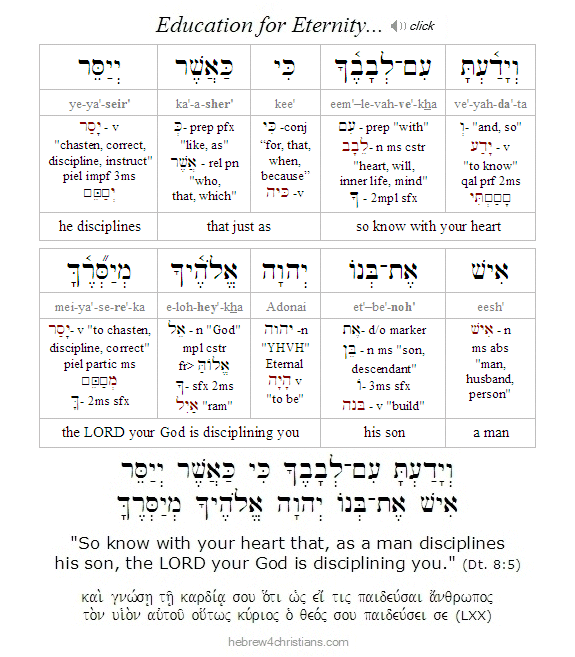 |
"For the moment all correction (מוּסָר) seems painful rather than pleasant, but later it yields the peaceful fruit of righteousness to those who have been trained by it" (Heb. 12:11). May the Lord keep you in perfect peace as you set your mind on Him. Shalom.
Heaven's Love Story...

04.04.22 (Nisan 3, 5782) The Scriptures reveal that ultimate reality is a divine love story with a "happy ending," despite the struggles we often face in this world. We see this in connection with the great deliverance of the Passover, when we read the story of our redemption in a book called a "haggadah." Note that the Hebrew word "haggadah" (הַגָּדָה) means "retelling," which of course refers to the story of our journey from slavery to freedom by the hand of God's love. With regard to the sanctity of this story, the Torah commands us: "You shall tell (i.e., ve'higadta: וְהִגַּדְתָּ, from which "haggadah" comes) your child on that day, 'It is because of what the LORD did for me when I came out of Egypt.' And it shall be to you as a sign on your hand and as a memorial between your eyes, that the Torah of the LORD may be in your mouth. For with a strong hand the LORD has brought you out of Egypt" (Exod. 13:8-8). The sages note that the numeric value of the word "haggadah" (הַגָּדָה) is the same as the Hebrew word for "good" (i.e., tov: טוֹב), which again indicates that the story of our redemption in the Messiah is truly good – indeed, the greatest story ever told...
מָה־אָשִׁיב לַיהוָה כָּל־תַּגְמוּלוֹהִי עָלָי
כּוֹס־יְשׁוּעוֹת אֶשָּׂא וּבְשֵׁם יְהוָה אֶקְרָא
mah-ah·sheev · la'donai · kohl-tag·moo·loh'·hee · a·lai
kohs · ye·shoo·oht · es·sah · oov·shem · Adonai · ek·rah

"What shall I render to the LORD for all his benefits to me?
I will take the cup of salvation, and call upon the name of the LORD."
(Psalm 116:12-13)

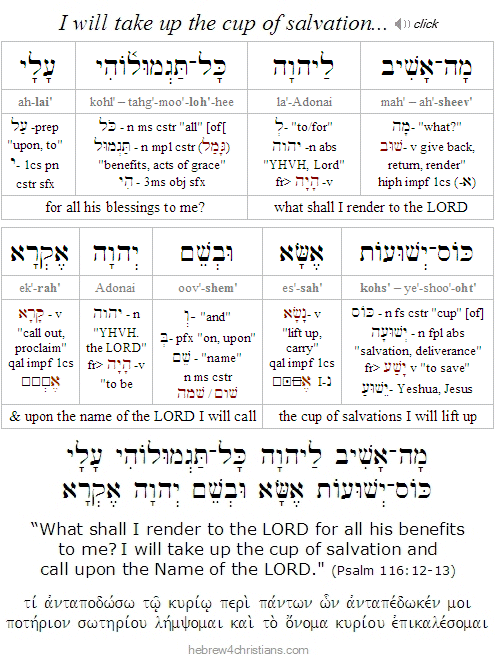
Passover and Teshuvah...

04.04.22 (Nisan 3, 5782) Since we are at the outset of a new year, it is an opportune time to reflect on the direction of our lives... The Scriptures say: "As a person thinks in his heart, so is he" (Prov. 23:7). Consider for a moment how your thinking defines your inner reality and the quality of your spiritual life. Thinking is inextricably linked to faith, and therefore we are responsible not only for what we believe, but for how we think (Acts 17:30-31). Sinful thinking creates "negative energy" that brings pain to yourself and others. Left unchallenged, such impaired cognitive function leads to slavery of the mind, hopeless addictions of thought, and distressing captivity. The first step to freedom is to confess our sin, acknowledging the reality of our own negativity – and bringing that truth to the light. Therefore teshuvah – turning to God – involves cheshbon hanefesh (חֶשְׁבּוֹן הַנֶּפֶשׁ), accounting for our soul and yielding it to the love of God for rectification: "If we confess our sins, he is faithful and just to forgive us our sins and to cleanse us from all unrighteousness" (1 John 1:9). For freedom we have been set free, and that means freedom from the power of the lie. If we deny our own sin, we cannot confess the truth to find lasting healing (James 5:16). May the LORD prepare our hearts for this season of our lives...
Hebrew Lesson
Eccl. 7:20 Hebrew reading (click):
Shabbat Hagadol:
The Sabbath before Passover...

[ The holiday of Passover begins Friday, April 15th at sundown... ]
04.04.22 (Nisan 3, 5782) The Sabbath that immediately precedes the festival of Passover is called the "Great Sabbath" (i.e., Shabbat HaGadol: שבת הגדול), in honor of the time when the first generation set aside the lamb for the Passover Sacrifice (i.e., korban Pesach: קרבן פסח).
During the time of the Temple it was customary to obtain the Korban Pesach (i.e., Passover lamb) four days before Passover so that worshipers could make sure that their lambs had no blemishes which would preclude them from being offered as sacrifices. This was done to fulfill the instructions given in Exodus 12 that the lamb for Passover be "without spot or blemish." Interestingly, this period of time allowed time for each family to become personally attached to their lamb, so that it would no longer simply be "a lamb" (Exod. 12:3) but rather their lamb" (Exod. 12:5). Indeed the Torah refers to "the" Lamb of God, as if there was only one: "You shall keep it [i.e., the Passover lamb] until the fourteenth day of this month, when the whole assembly of the congregation of Israel shall slaughter him (אתוֹ) at twilight (Exod. 12:6). Note that the direct object "him" (i.e., oto) can be read as Aleph-Tav (את) combined with the letter Vav (ו), signifying the Son of Man who is First and Last.
![Spring Holiday Timeline (H4C]](../../../../About_HFC/Site_News/Archive-2022/April/shabbathagaolline.gif) |
Shabbat HaGadol foreshadowed the offering of Yeshua as the "Lamb of God" who takes away the sins of the world. The New Testament notes that it was a few days before Passover when Yeshua made His triumphant entry into Jerusalem riding on a donkey, signifying His Messiahship, in fulfillment of the prophecy of Zechariah: "Rejoice greatly, O daughter of Zion! Shout aloud, O daughter of Jerusalem! Behold, your king is coming to you; righteous and having salvation is he, humble and mounted on a donkey, on a colt, the foal of a donkey" (Zech. 9:9). During this time, when the pilgrims had come to select the lamb for the Passover sacrifice - they saw Yeshua and cried out: hoshiah na (הושׁיעה נא), meaning "please save" or "save now" (in English this phrase was translated from the Latin to form "Hosanna!"). The people spontaneously began singing Psalm 118:25-26 in anticipation of the fulfillment of the great Messianic hope:
אָנּא יְהוָה הוֹשִׁיעָה נָּא
אָנָּא יְהוָה הַצְלִיחָה נָּא
בָּרוּךְ הַבָּא בְּשֵׁם יְהוָה
בֵּרַכְנוּכֶם מִבֵּית יְהוָה
ah·nah · Adonai · hoh·shee·ah · nah
ah·nah · Adonai · hatz·lee·chah · nah
bah·rookh · ha·bah · be·shem · Adonai
be·rakh·noo·khem · mee·beit · Adonai

"Please, LORD save us! Please, LORD rescue us!
Blessed is He who comes in the Name of the LORD
We bless you from the house of the LORD."
(Psalm 118:25-26)
Hebrew Study Card
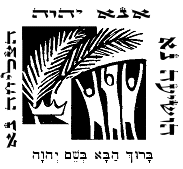
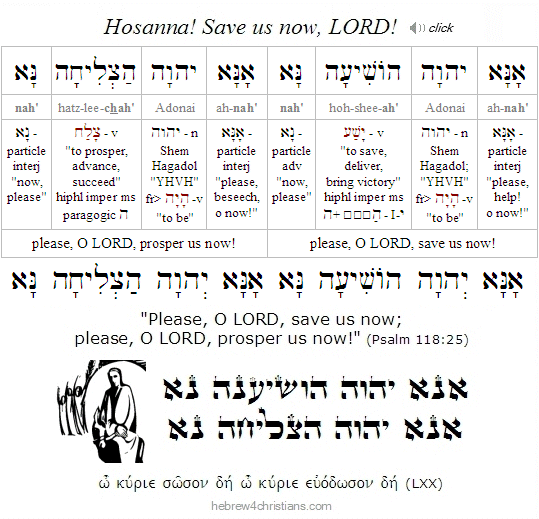
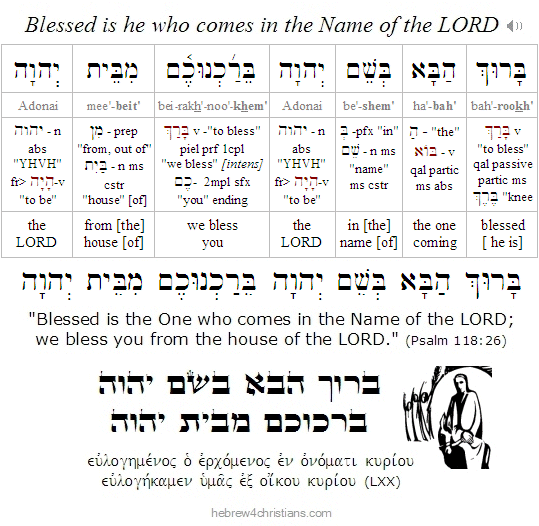
The Haftarah for Shabbat HaGadol (i.e., Malachi 3:4-24) foretells of Yom Adonai (יוֹם יהוה), the great Day of the LORD, and the return of Yeshua as Mashiach ben David. May that day come soon, chaverim. For more information, click here.
Cleansing of the Leper:
Parashat Metzora...
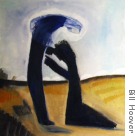
04.03.22 (Nisan 2, 5782) Recall from last week's Torah (i.e., Tazria) that if someone was diagnosed with tzara'at (i.e., "leprosy"), they were forced to live in a state of exile. The afflicted person (called a "metzora") tore his clothes like a mourner, put a shroud over his face, and remained alone. If anyone came near, the person would cry out: "Unclean! Stay away! Do not become impure because of me!" While so isolated, the person would have opportunity to perform teshuvah (repentance) and to reexamine his relationship with God.
In our Torah portion this week (i.e., Metzora), we learn about the laws for cleansing "lepers" (i.e., metzorim). If the one suffering from tzara'at (i.e., the metzora) had apparently been healed, he would first call for the priest to be officially reexamined. If the priest saw no sign of tumah (uncleanness), a second examination was scheduled seven days later, and if at that time there was no further sign of disease, the process of tahara (purification) would begin.
The purification process was somewhat elaborate: After the second examination, the priest required that the metzora bring the following items for his cleansing:
- An earthenware bowl filled with spring water (mayim chayim)
- Two birds of the same type (whether turtledoves or pigeons)
- A stick of cedar wood
- A hyssop branch
- A scarlet thread
The priest then commanded that one of the birds should be slaughtered over the earthen vessel filled with fresh water, with its blood mixing with the water. The living bird, the piece of cedar, and the hyssop branch were then tied together using the scarlet thread, and the entire bundle was dipped into the earthen vessel. The blood and water mixture was then sprinkled seven times on the healed metzora, and the living bird was then set free.
Next, the healed person washed his clothes, shaved off all his hair (including his eyebrows), and bathed in a mikveh (ritual pool for cleansing). After that he could return to the camp - but he could not return to his home for another seven days. On the eighth day he would bathe again and offer several offerings (a chatat, an asham, an olah, and a minchah), but the blood from the asham (guilt) offering was mixed with oil and applied to his earlobe, thumb and foot, similar to the blood applied to the priests during their ordination. Oil from a meal offering was sprinkled seven times in the direction of the Sanctuary. Only after all this was he pronounced tahor (clean) by the priest. His life of uncleanness would be over, and he would be like a man who was brought back from the dead to new life.
This purification ritual corresponded with other rituals revealed in the Torah. The sprinkling of the hyssop by the priest recalled both the blood of the Passover lamb and the sprinkling of the ashes of the Red Heifer that cleanse from contact with death; the offering made of the two birds - one which was sacrificed and the other set free - recalled the scapegoat of the Yom Kippur ritual. The washing of garments, the shaving of all hair, and the immersion in a mikveh recalled the birth of the Jewish people at the Sea of Reeds. The blood of the guilt offering applied to the earlobe, thumb and foot, recalled the dedication of Aaron and his sons as the priests of Israel (Lev. 14:14). In other words, the individual purification process mirrored the purification of the community of Israel, and healing ultimately meant being reidentified as a redeemed child of God. In a very literal sense, then, we see how the metzora was "reborn" by water and by the blood (John 3:5; 19:34; Heb. 9:19).
Centrality of the Lamb...
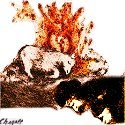
04.01.22 (II Adar 29 5782) The goal of the great Sinai revelation was not to simply impart a set of moral or social laws, but rather to "accommodate" the Divine Presence in the midst of the people. This is not to suggest that the various laws and decrees given to Israel were unimportant, of course, since they reflect the holy character and moral will of God. Nonetheless, the climax of the revelation of the Torah - its goal or purpose or "end" - was the revelation of the altar which prefigured the sacrificial work of the Lamb of God. Indeed, the central sacrifice upon this altar was the daily sacrifice (i.e., korban tamid: קָרְבַּן תָּמִיד) of a defect-free male lamb with unleavened bread and wine, one lamb offered in the morning, and another offered in the evening, so that at all times the lamb would be offered up to God. The LORD calls this "My offering, My bread..." (see Num. 28:1-8). In other words, the service and ministry of the Tabernacle constantly proclaimed the Passover Lamb of God that was offered up to deliver the faithful of Israel from the plague of death, and who would later be offered upon the cross to secure our eternal redemption (Heb. 9:11-12; 1 Cor. 5:7). The sacrifice of the lamb of God is therefore central to the meaning and purpose of the Torah.
The Talmud says "All the world was created for the Messiah" (Sanhedrin 98b). The Apostle Paul had earlier said the same thing: "All things were created by Him (i.e., Yeshua), and for Him" and in Him all things consist (συνεστηκεν, lit. "stick together") (Col. 1:16-17). Indeed, all of creation is being constantly upheld by the word of the Messiah's power (Heb. 1:3). Creation begins and ends with the redemptive love of God as manifested in the Person of Yeshua our LORD... The Messiah is the Center of Creation - its beginning and end. As it is written: אָנכִי אָלֶף וְתָו רִאשׁוֹן וְאַחֲרוֹן ראשׁ וָסוֹף / "I am the 'Aleph' and the 'Tav,' the First and the Last, the Beginning and the End" (Rev. 22:13). "For from him and through him and to him are all things. To him be glory forever. Amen" (Rom. 11:36). In everything Yeshua has the preeminence (Col. 1:18), and his "work" is of first importance (1 Cor. 2:2, 1 Cor. 15:3-4). Yeshua our Messiah is called מֶלֶךְ מַלְכֵי הַמְּלָכִים / Melech Malchei Hamelachim: The "King of kings of kings." He is LORD of all possible worlds -- from the highest celestial glory to the dust of death upon a cross. Yehi shem Adonai mevorakh: "Let the Name of the LORD be blessed" forever and ever (Psalm 113:2). So while we can agree with the Talmud's general statement that the world was created for the Messiah, we would insist that the Messiah is none other than Yeshua, God's Son, and indeed, the Messiah could be no other...
Hebrew Lesson:
Exodus 29:38 Hebrew reading:
Passover Soul Searching...

[ The following is related to the theme of repentance before the holiday of Passover... ]
04.01.22 (II Adar 29 5782) The search for chametz (חפש חמץ) before Passover may be likened to the soul searching we do before the High Holidays in the fall, when we take an inventory of our spiritual condition (חשבון נפש) and do teshuvah. The Torah instructs us to carefully search and remove sources of inner impurity so that we might experience the truth that we are a "new lump" - that is, a new substance that is purged from the sour and rotting influences of our past lives... And since Yeshua has been sacrificed as your Passover Lamb, you are indeed a new creation (בּריה חדשׁה) made "unleavened" (pure) by the power of the Holy Spirit (2 Cor. 5:17). Therefore you are likewise commanded put away the "old nature" (יצר הרע) and purge from your life the old influences that inwardly canker you and make you sick (Eph. 4:22; Col. 3:9). Walk without hypocrisy in the truth of the love of God for your soul.
חָקְרֵנִי אֵל וְדַע לְבָבִי
בְּחָנֵנִי וְדַע שַׂרְעַפָּי
וּרְאֵה אִם־דֶּרֶךְ־עֹצֶב בִּי
וּנְחֵנִי בְּדֶרֶךְ עוֹלָם
chok·rei'·nee · el · ve·da · le·va·vee
be·cha·nei'·nee · ve'da · sar·a·pai
oor·eih · eem-de'·rekh-o'·tzev · bee
oo·ne·chei'·nee · be·de'·rekh · o·lam

"Search me, O God, and know my heart!
Test me and know my anxious thoughts!
And see if there be any idolatrous way in me,
and lead me in the way of eternity."
(Psalm 139:23-24)

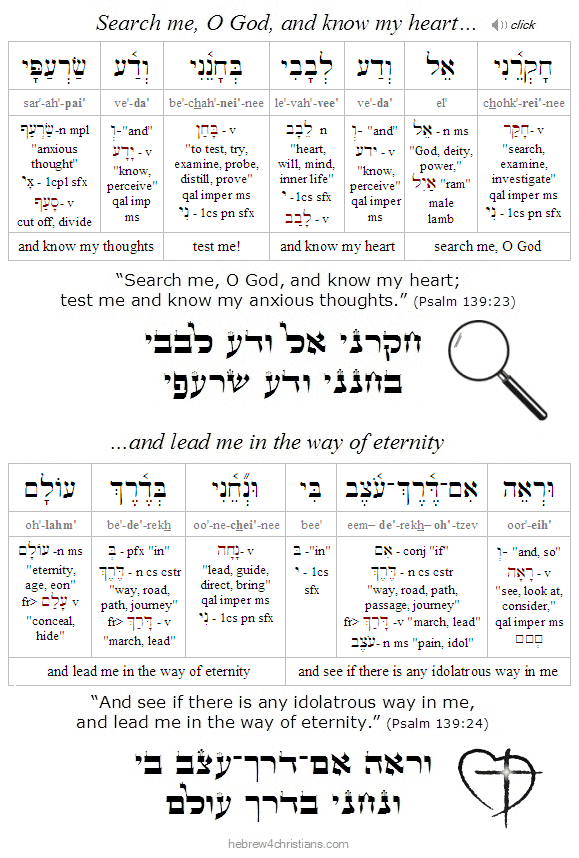
Happy New Year!
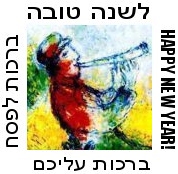
04.01.22 (II Adar 29 5782) This evening at sundown marks Nisan 1, the first day of the Biblical New Year! L'Shanah Tovah! -- "To a good year!" The new moon of Nisan is the most significant of the "new moons" of the Jewish calendar since it initiates the first month of the Biblical Calendar - and therefore represents the Biblical "New Year's Day." Of all the various Rosh Chodesh celebrations, then, Rosh Chodesh Nisan is foundational, since it presents the starting point for the cycle of the yearly festivals (mo'edim) that reveal prophetic truths about the LORD God of Israel and His beloved Son, Yeshua the Messiah, blessed be He.
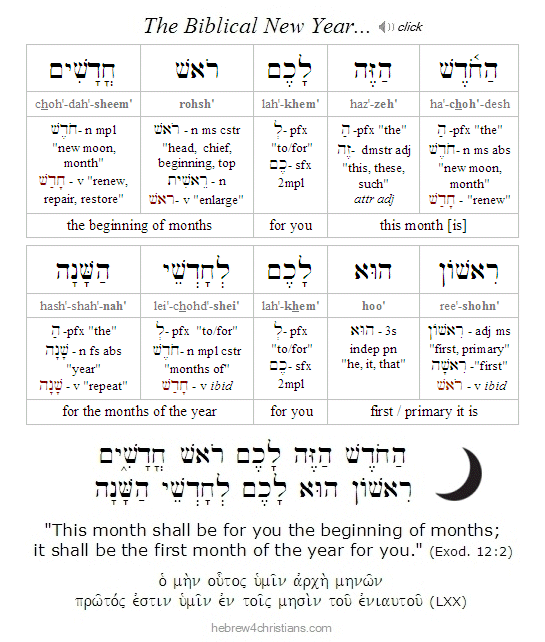 |
The last promise of Scripture is "I come quickly" (אֲנִי בָא מַהֵר) and the last prayer is, "Amen, come, Lord Yeshua" (אָמֵן בּאָה־נָּא הָאָדוֹן יֵשׁוּעַ) [Rev. 22:20]. Meanwhile we "inwardly groan" for the fulfillment of our redemption, since presently we are suspended between worlds, walking in hope yet subject to the vanities that befall all flesh... And though God may tarry, He declares, "I am the LORD; in its time I will hasten it" (Isa. 60:22). So we are made captives to hope, clinging to the promise of our ultimate healing and redemption. Our hearts therefore affirm that God is faithful "to keep you from falling, and to present you faultless before the presence of his glory with exceeding joy" (Jude 1:24). Amen. God will help us before He will help us, and may He come speedily, and in our day....
If you listen closely you can hear the hoof-beats of an approaching White Horse, and on it One whose name is Truth... He is coming and he cannot be stopped...
|































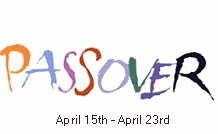

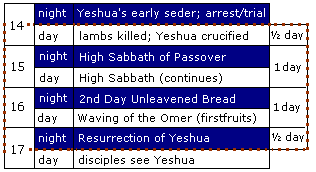



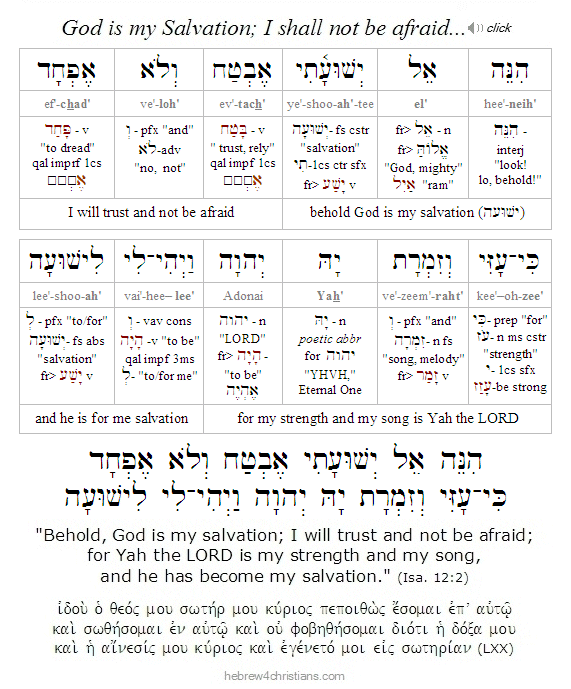



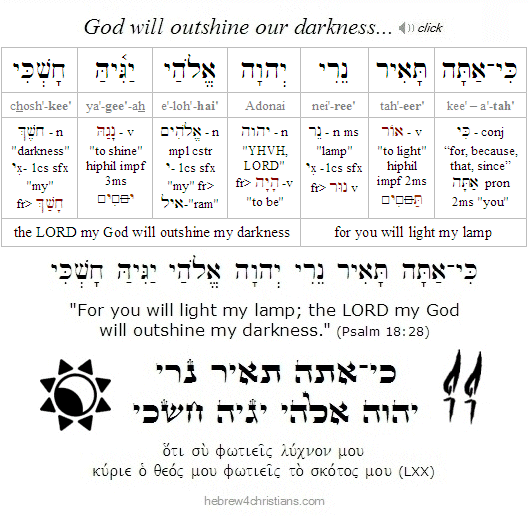
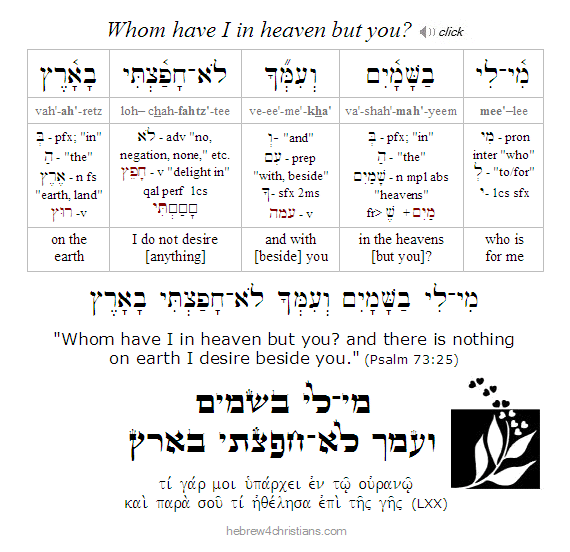






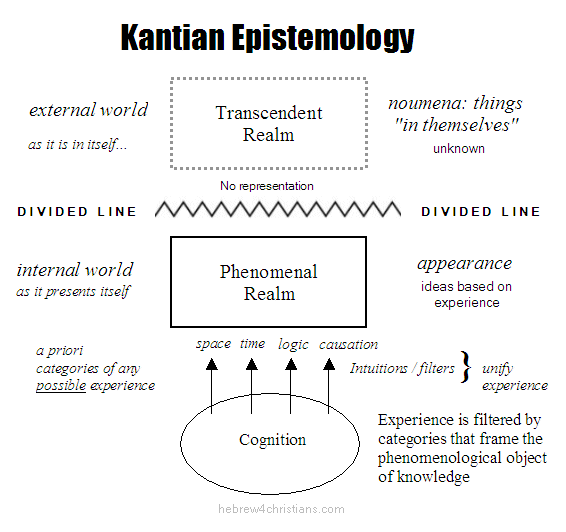


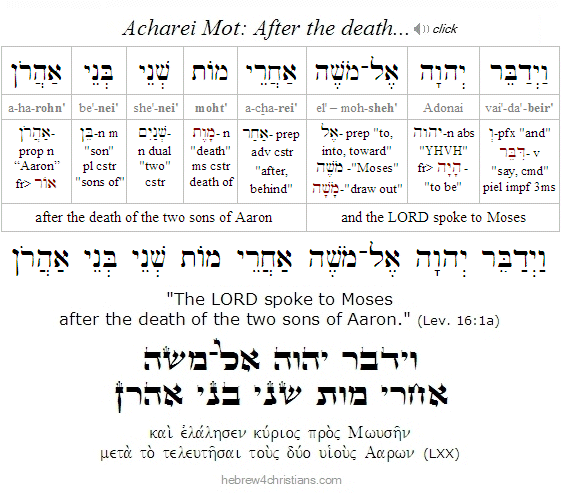


















![Spring Holiday Timeline (H4C]](../../../../About_HFC/Site_News/Archive-2022/April/pesachline.gif)









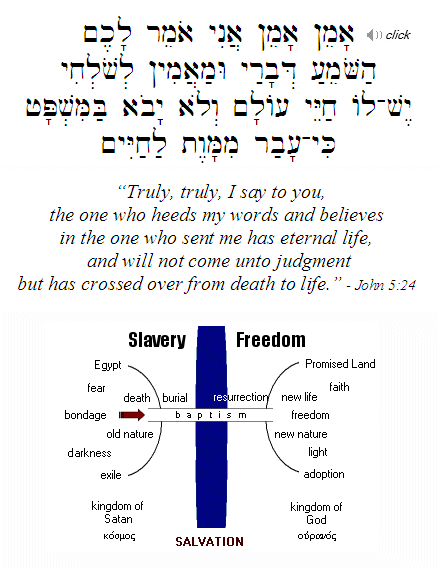
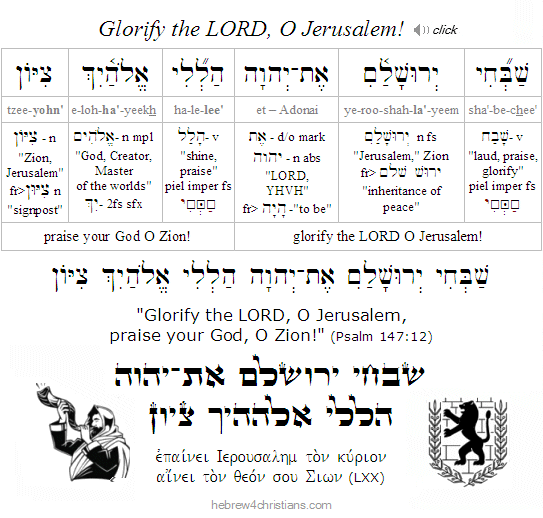
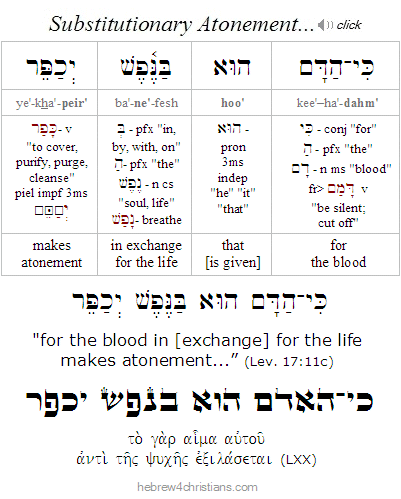









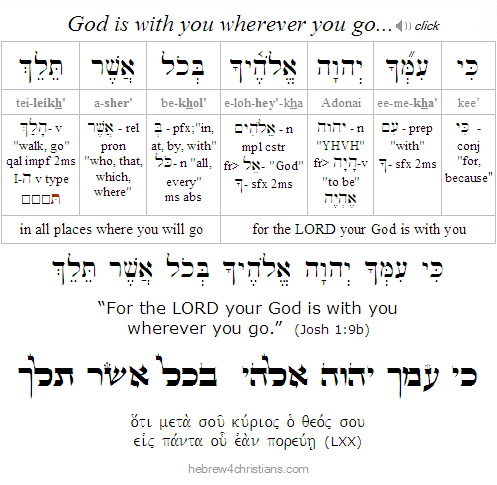
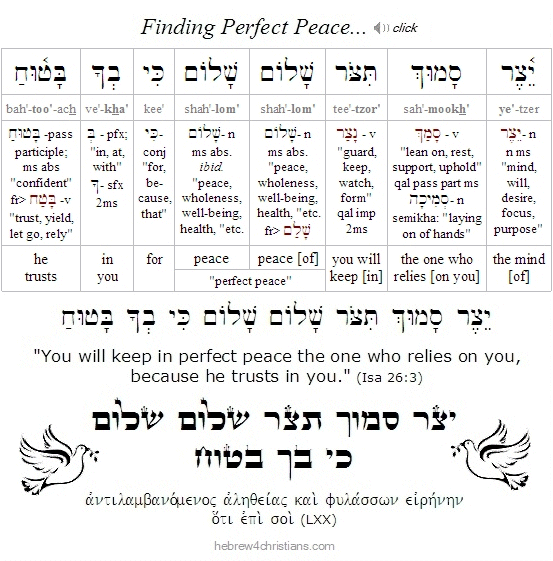
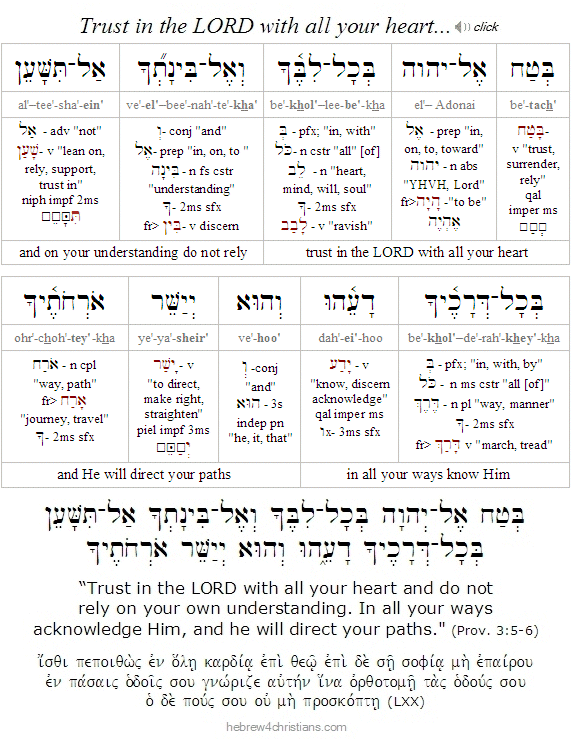




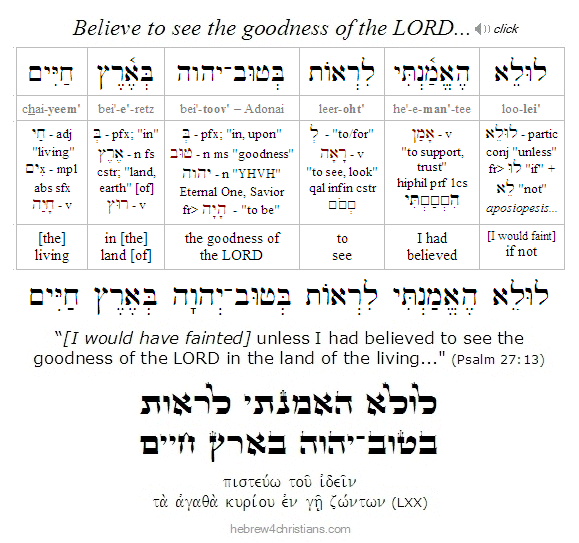



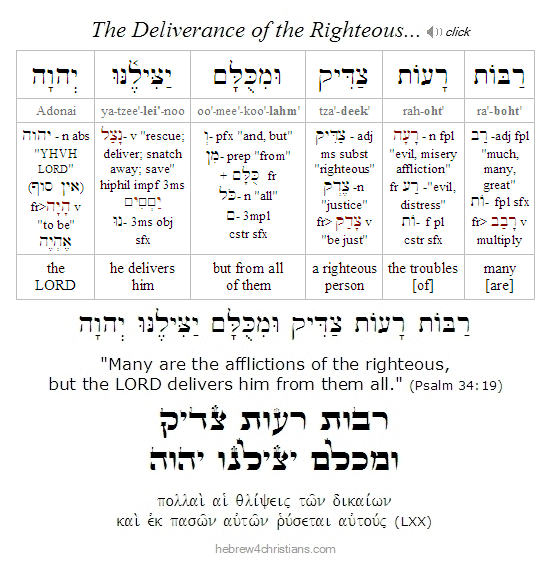



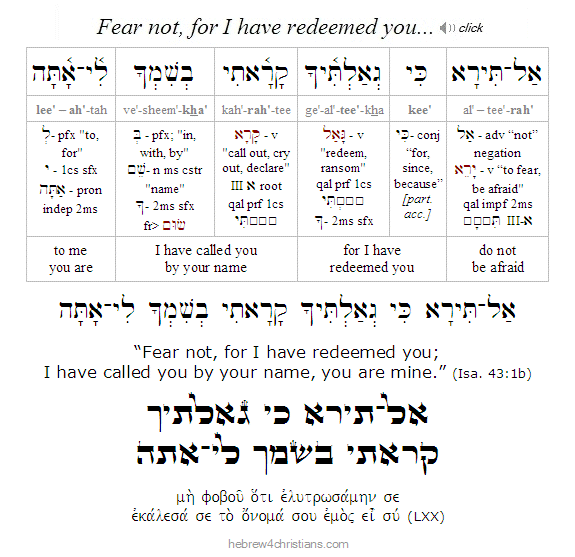

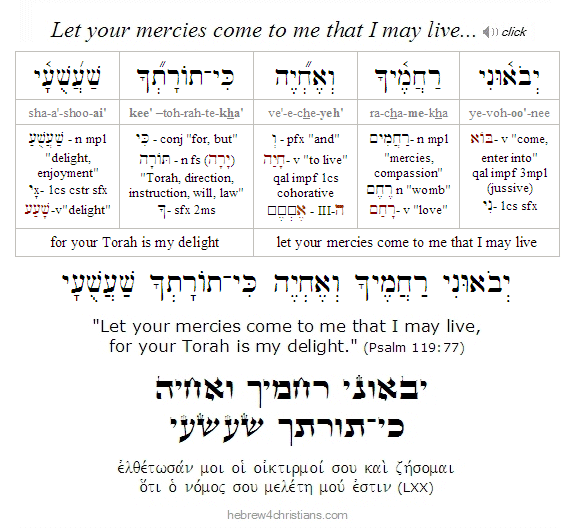
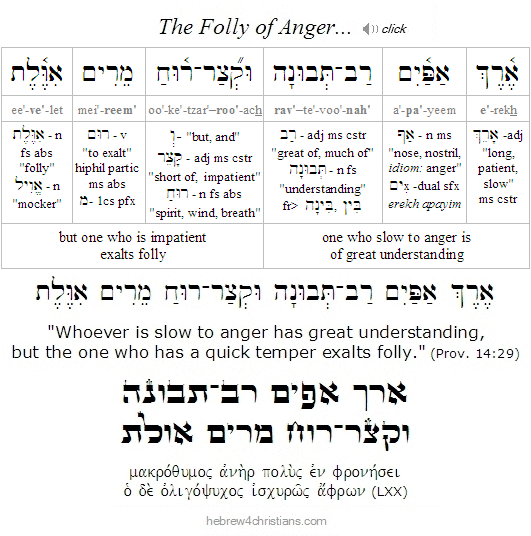

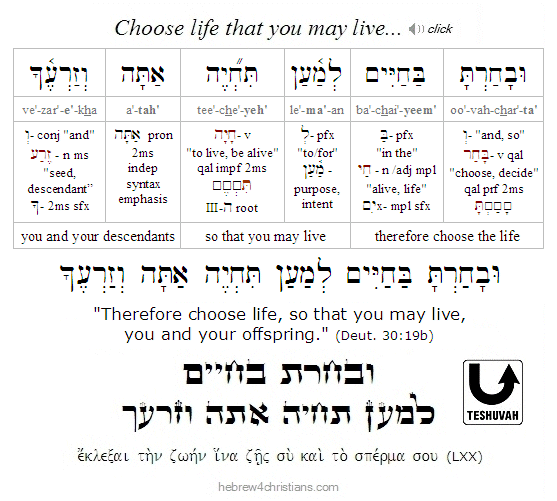

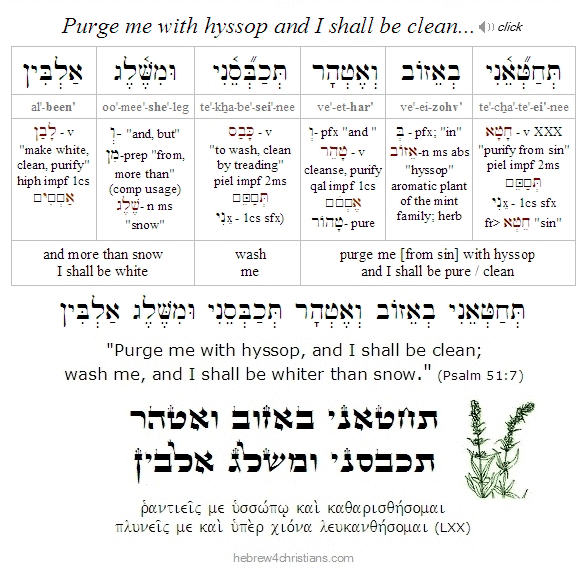



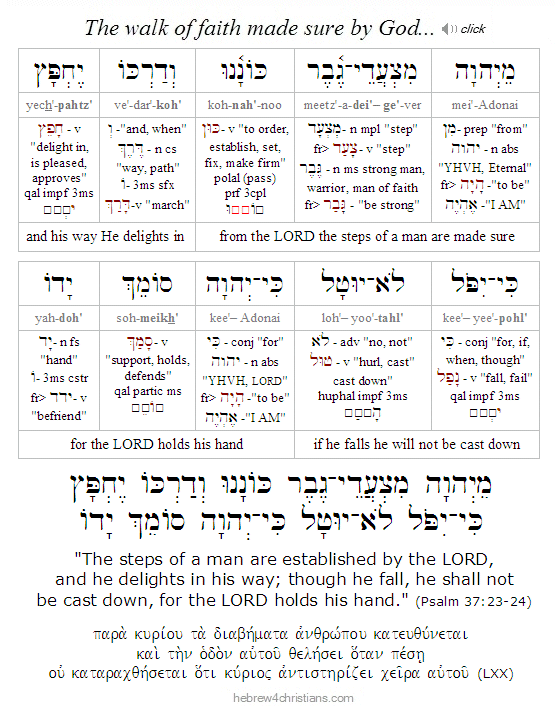
![Spring Holiday Timeline (H4C]](../../../../About_HFC/Site_News/Archive-2022/April/shabbathagaolline.gif)

